
Expert business plan and financial models


Construction Contractor Business Plan Template & PDF Example
- September 4, 2024
- Business Plan

Creating a comprehensive business plan is crucial for launching and running a successful construction contractor business. This plan serves as your roadmap, detailing your vision, operational strategies, and financial plan. It helps establish your construction contractor business’s identity, navigate the competitive market, and secure funding for growth.
This article not only breaks down the critical components of a construction contractor business plan, but also provides an example of a business plan to help you craft your own.
Whether you’re an experienced entrepreneur or new to the service industry, this guide, complete with a business plan example, lays the groundwork for turning your construction contractor business concept into reality. Let’s dive in!
Our construction contractor business plan is meticulously structured to include all essential aspects necessary for a robust strategy. It outlines the company’s operations, marketing strategy, market environment, competitors, management team, and financial projections.
- Executive Summary : Presents an overview of your construction contractor business concept, including market analysis , management structure, and financial strategies.
- Company Information: Describes the company’s foundation, areas of expertise in the construction industry, and the operational standards that define the business.
- Services : Details the comprehensive range of construction services offered, from residential building to commercial projects, including any specialized services such as eco-friendly constructions or renovations.
- Target Market : Outlines the specific demographic and geographic segments the company aims to serve, emphasizing any particular needs of these markets like affordability, durability, or luxury finishes.
- Key Stats: Provides statistics on the construction industry’s size and growth trends relevant to your market area.
- Key Trends: Identifies significant trends affecting the construction sector.
- Key Competitors: Evaluates primary competitors in the area and outlines your competitive advantages.
- SWOT : Conducts a Strengths, Weaknesses, Opportunities, and Threats analysis.
- Marketing Plan : Outlines effective strategies for attracting and retaining clients.
- Timeline : Lists key milestones and objectives from the start-up through the initial years of operation.
- Management: Shares information about the management team, detailing who manages the company and their respective roles.
- Financial Plan: Forecasts the company’s 5-year financial performance, including revenue, profits, and significant expenses.

Construction Contractor Business Plan

Fully editable 30+ slides Powerpoint presentation business plan template.
Download an expert-built 30+ slides Powerpoint business plan template
Executive Summary
The Executive Summary introduces your construction contractor’s business plan, offering a concise overview of your company and its services. It should detail your market positioning, the range of construction and remodeling services you offer, its location, size, and an outline of day-to-day operations.
This section should also explore how your construction business will integrate into the local market, including the number of direct competitors within the area, identifying who they are, along with your company’s unique selling points that differentiate it from these competitors.
Furthermore, you should include information about the management and co-founding team, detailing their roles and contributions to the company’s success. Additionally, a summary of your financial projections, including revenue and profits over the next five years, should be presented here to provide a clear picture of your construction business’s financial plan.
Construction Contractor Business Plan Executive Summary Example

Business Overview
When detailing the business overview in your executive summary, it’s crucial to provide clear and concise information. This includes the name of your construction company, its location, and an overview of the types of construction projects you undertake.
These details not only introduce your business but also set the stage for its unique qualities. Indeed, a unique selling proposition ( USP ) is what sets your construction company apart from the competition. Whether it’s your expertise in green building practices, your use of cutting-edge technologies like BIM, or your focus on client-centric service, your USP should be a focal point of your executive summary. It’s what captures the interest of your audience and showcases the unique value your business brings to the market.
Example: For instance, “Superior Builds,” located in the industrial hub of Metro City, operates from a well-equipped office on Builders Lane. Established in 2010, they specialize in commercial and residential projects, incorporating sustainable building practices and advanced technologies such as BIM. Their USP is their commitment to eco-friendly construction methods, which not only appeal to environmentally conscious clients but also provide long-term value through energy efficiency.
Market Overview
Understanding and presenting the market size , growth trends, and industry dynamics are integral parts of the market analysis . This section should highlight the potential of the U.S. construction market, backed by relevant data like market value and growth rates. Discussing industry trends, such as the adoption of green building materials and BIM, provides insight into the evolving landscape and where your construction company fits within it.
Equally important is the competitive landscape. Your executive summary should identify key competitors and explain how your construction company positions itself in this environment. Whether you focus on specialized construction services, superior project management, or innovative construction solutions, this is your opportunity to showcase how your company is poised to stand out in a crowded market.
Example: Consider “Superior Builds” within the general contractor industry, part of a $112 billion market. Despite intense competition from 493,728 companies nationwide, “Superior Builds” differentiates itself by focusing on sustainable building solutions and advanced project management using BIM, catering to a growing segment of the market that values environmental responsibility and efficiency.
Management Team
The management team’s background and expertise are significant assets to your business. In your executive summary, highlight the key qualifications and experiences of your team members.
This might include the CEO’s extensive background in sustainable construction or the CFO’s expertise in financial management within the construction industry. Demonstrating the team’s expertise not only builds credibility but also assures potential investors and partners of your construction company’s capability to succeed.
Example: At “Superior Builds,” the team is led by CEO John Carter, a pioneer in green construction with over 20 years of industry experience, and CFO Linda Smith, who has a robust track record of managing finances for large-scale construction projects. Their combined expertise ensures the company’s strategic positioning and operational efficiency.
Financial Plan
The financial plan overview should succinctly summarize your financial goals and projections, including revenue targets and profit margins, to provide a clear picture of your construction company’s financial trajectory.
Example: “Superior Builds” aims for $16 million in annual revenue by 2026, with a profit margin of 7-20%. The financial strategy includes leveraging high-profile, sustainable construction projects and expanding into new markets, with sales growth driven by a strong reputation and strategic partnerships, positioning the company for profitability and industry leadership within the next few years.
For a construction contractor, the Business Overview section can be concisely divided into 3 main slides:
Company Information & Location
Our construction company specializes in handling diverse projects, including residential, commercial, and industrial builds. Located strategically near major transport hubs, our headquarters offer easy access to key construction sites, providing logistical benefits and enhanced service delivery to our clientele.
Services & Specialization
We offer a comprehensive range of services from general contracting to specialized projects like energy-efficient constructions. Our expertise in custom designs and turnkey solutions sets us apart in the industry, ensuring high-quality project management and client satisfaction.
Target Market
Our target market includes homeowners, real estate developers, and public sector contracts. We cater to clients seeking reliable, high-quality construction services, with a focus on innovation and efficiency to meet the unique needs of each segment, ensuring we are the go-to contractor for diverse construction demands.
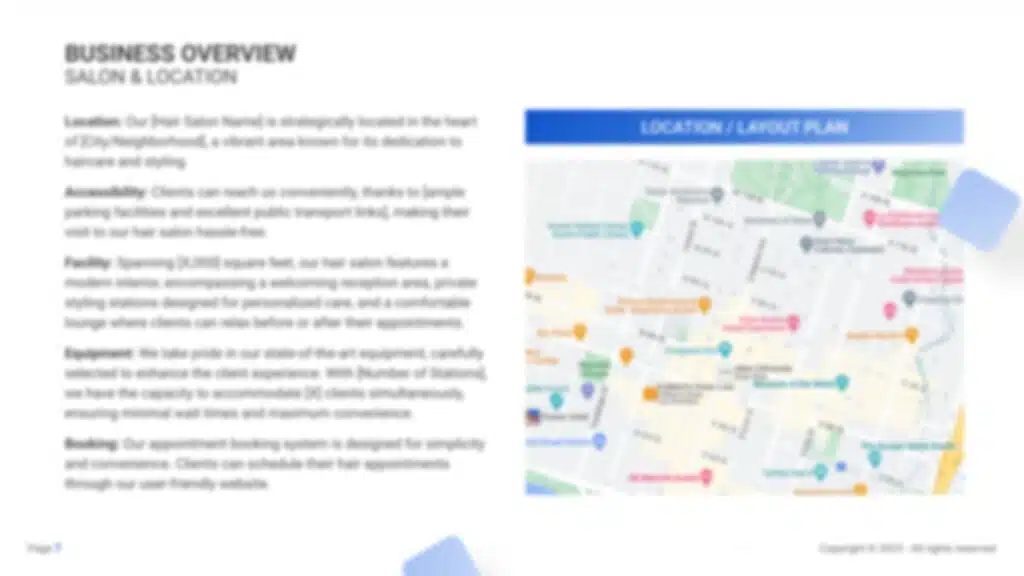
Industry Size & Growth
In the Market Overview of your construction contractor business plan, start by examining the size of the construction industry and its growth potential. This analysis is crucial for understanding the market’s scope and identifying expansion opportunities.
Key Market Trends
Proceed to discuss recent market trends , such as the increasing consumer interest in sustainable building practices, energy-efficient homes, and smart technology integration in construction. For example, highlight the demand for green building certifications and the rising popularity of renovations that focus on improving energy efficiency.
Competitive Landscape
A competitive analysis is not just a tool for gauging the position of your construction contractor in the market and its key competitors; it’s also a fundamental component of your business plan.
This analysis helps in identifying your construction contractor’s unique selling points, essential for differentiating your business in a competitive market.
In addition, the competitive analysis is integral in laying a solid foundation for your business plan. By examining various operational aspects of your competitors, you gain valuable information that ensures your business plan is robust, informed, and tailored to succeed in the current market environment.
Identifying Your Competitors in the Construction Industry
The initial step in a competitive analysis is recognizing who your competitors are. Start by identifying other local construction contractors, especially those who specialize in the same type of projects as your business, such as residential building or commercial renovations. Also, consider larger construction firms and indirect competitors like DIY stores or prefabricated building suppliers.
Utilize tools like Google Maps for a geographical overview of where competitors are located. Platforms like Yelp and Angie’s List can provide customer testimonials and ratings, giving you an insight into your competitors’ strengths and weaknesses . For instance, if multiple reviews praise the reliability and craftsmanship of “Quality Constructions,” this is a significant strength of your competitor.

Construction Competitors’ Strategies
To understand the competitive landscape, consider several factors:
- Project Portfolio : Review the variety of projects completed by competitors. If “Green Build Contractors” are gaining traction for their eco-friendly building solutions, it suggests a market trend towards sustainable construction.
- Building Techniques: Evaluate the construction methodologies used. A contractor like “Heritage Builders” that excels in restoring historical properties might attract a niche market compared to “Innovate Structures,” known for employing state-of-the-art building technologies.
- Pricing Strategy : Compare your pricing with that of your competitors. Are your services priced competitively with “Budget Builders,” or do they align with the high-end services of “Elite Constructions”?
- Marketing Tactics: Examine how competitors market their services. Do they leverage robust digital marketing strategies , or do they depend on referrals and local advertising?
- Customer Relations : Assess the quality of customer service offered. For example, “Client-Centric Constructions” may be favored for its customer-focused approach and excellent project management.
- Operational Efficiency: Notice if competitors use advanced technology or innovative practices to enhance efficiency, such as “Streamline Construction” with its integrated project management software.
What’s Your Construction Contractor’s Value Proposition?
Reflect on what makes your construction contracting business unique. Perhaps you are known for your rapid turnaround times, or maybe you specialize in luxury residential renovations that are unmatched in your region.
Identify market gaps through client feedback and industry trends. For instance, the increasing demand for smart homes and energy-efficient buildings might be a lucrative opportunity if competitors have not yet fully embraced this niche.
Consider your location: A contractor in a rapidly developing urban area might focus on commercial and high-density residential projects, while one in a more rural setting might specialize in custom homes and renovations that align with the local aesthetic.

First, conduct a SWOT analysis for the construction contractor , highlighting Strengths (such as advanced project management skills and a wide array of building services), Weaknesses (including dependency on the economic cycle and market competition), Opportunities (for example, growing trends in sustainable construction and smart home technologies), and Threats (such as potential economic recessions that may reduce investment in new construction projects).

Marketing Plan
Next, develop a marketing strategy that outlines how to attract and retain clients through targeted advertising, promotional discounts, strong online presence, and community involvement. Focus on showcasing your company’s unique capabilities and successful project completions to build trust and credibility in the market.
Marketing Channels
Utilize various marketing channels to increase brand awareness, engage potential clients, and secure construction projects.
Digital Marketing
Embrace online platforms to expand your reach:
- Website Optimization: Create a professional website showcasing your portfolio, client testimonials, and a blog featuring industry insights and project case studies. Implement SEO strategies to improve your website’s visibility in search results.
- Social Media Presence: Utilize platforms like LinkedIn for professional networking, Instagram and Pinterest to showcase completed projects, and YouTube for construction project walkthroughs or tutorials.
- Email Marketing: Build an email subscriber list by offering valuable content such as construction tips, project spotlights, and industry updates. Send regular newsletters to maintain engagement.
Local Advertising
Connect with your local community:
- Networking Events : Attend local trade shows, industry conferences, and business networking events to establish connections with potential clients, architects, and developers.
- Community Engagement: Sponsor community events, participate in local charity initiatives, or offer workshops related to construction and home improvement to increase visibility and build trust.
- Print Media and Direct Mail: Advertise in local newspapers, and magazines, or send direct mailers showcasing your construction projects and services to targeted neighborhoods.
Partnerships and Collaborations
Leverage collaborations to expand your reach:
- Industry Partnerships: Collaborate with architects, interior designers, real estate agents, or suppliers to create referral programs or joint marketing initiatives.
- Client Referral Program: Incentivize existing clients to refer your construction services by offering discounts or rewards for successful referrals.
Promotional Activities
Attract potential clients with enticing offers:
- Seasonal Promotions: Introduce seasonal promotions like ‘Spring Renovation Specials’ or ‘Summer Outdoor Remodeling Deals’ to generate interest and urgency.
- Free Consultations: Offer free initial consultations to prospective clients, providing insights and recommendations, showcasing your expertise, and building rapport.
- Limited-Time Discounts: Create limited-time offers for larger projects or exclusive discounts for early project bookings.

Sales Channels
Deploy effective sales strategies to convert leads into projects and maximize revenue.
Consultative Selling
Develop relationships with potential clients:
- Client Education: Provide comprehensive information about construction processes, materials, and project timelines to build trust and credibility.
- Tailored Proposals: Customize proposals that address the specific needs and preferences of potential clients, showcasing your expertise and understanding of their project requirements.
- Project Add-Ons: Suggest additional services or features that could enhance the value of the project during client interactions or proposal presentations.
Client Relationship Management
Focus on client retention and satisfaction:
- Post-Project Follow-ups: Conduct follow-ups after project completion to ensure client satisfaction and address any concerns promptly.
- Referral Requests: Ask satisfied clients for referrals and testimonials that can be used in future marketing efforts.
- Customer Service Excellence: Prioritize exceptional customer service throughout the project lifecycle to foster long-term client relationships.
Technology Integration
Leverage technology for efficiency and convenience:
- Project Management Tools: Utilize software or applications for project scheduling, progress tracking, and communication with clients to ensure transparency and efficiency.
- Online Project Quoting: I mplement online quoting tools or calculators on your website to provide quick estimates, streamlining the initial inquiry process for potential clients.
- Virtual Presentations: Use virtual meeting platforms to conduct project presentations, share design concepts, and collaborate with clients remotely.
Strategy Timeline
Finally, create a detailed timeline that outlines critical milestones for the construction business’s project completions, marketing initiatives, client relationship building, and expansion objectives, ensuring the business progresses with clear direction and purpose.
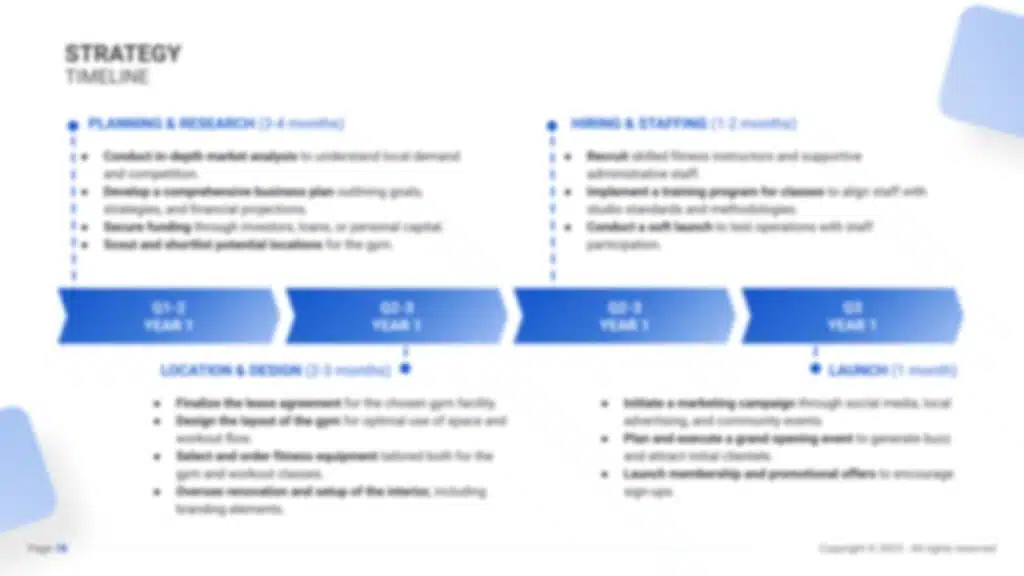
The Management section focuses on the construction contractor business’s management and their direct roles in daily operations and strategic direction. This part is crucial for understanding who is responsible for making key decisions and driving the construction contractor business toward its financial and operational goals.
For your construction contractor business plan, list the core team members, their specific responsibilities, and how their expertise supports the business.

The Financial Plan section is a comprehensive analysis of your financial projections for revenue, expenses, and profitability. It lays out your construction contractor business’s approach to securing funding, managing cash flow, and achieving breakeven.
This section typically includes detailed forecasts for the first 5 years of operation, highlighting expected revenue, operating costs and capital expenditures.
For your construction contractor business plan, provide a snapshot of your financial statement (profit and loss, balance sheet, cash flow statement), as well as your key assumptions (e.g. number of customers and prices, expenses, etc.).
Make sure to cover here _ Profit and Loss _ Cash Flow Statement _ Balance Sheet _ Use of Funds

Related Posts

Carpet and Upholstery Cleaning Business Plan Template & PDF Example
Taxi Business Plan Template & PDF Example

Competitive Analysis for a Carpet and Upholstery Cleaning Business (Example)
- Business Plan , Competitive Analysis
Privacy Overview
| Cookie | Duration | Description |
|---|---|---|
| BIGipServerwww_ou_edu_cms_servers | session | This cookie is associated with a computer network load balancer by the website host to ensure requests are routed to the correct endpoint and required sessions are managed. |
| cookielawinfo-checkbox-advertisement | 1 year | Set by the GDPR Cookie Consent plugin, this cookie is used to record the user consent for the cookies in the "Advertisement" category . |
| cookielawinfo-checkbox-analytics | 11 months | This cookie is set by GDPR Cookie Consent plugin. The cookie is used to store the user consent for the cookies in the category "Analytics". |
| cookielawinfo-checkbox-functional | 11 months | The cookie is set by GDPR cookie consent to record the user consent for the cookies in the category "Functional". |
| cookielawinfo-checkbox-necessary | 11 months | This cookie is set by GDPR Cookie Consent plugin. The cookies is used to store the user consent for the cookies in the category "Necessary". |
| cookielawinfo-checkbox-others | 11 months | This cookie is set by GDPR Cookie Consent plugin. The cookie is used to store the user consent for the cookies in the category "Other. |
| cookielawinfo-checkbox-performance | 11 months | This cookie is set by GDPR Cookie Consent plugin. The cookie is used to store the user consent for the cookies in the category "Performance". |
| CookieLawInfoConsent | 1 year | Records the default button state of the corresponding category & the status of CCPA. It works only in coordination with the primary cookie. |
| elementor | never | This cookie is used by the website's WordPress theme. It allows the website owner to implement or change the website's content in real-time. |
| viewed_cookie_policy | 11 months | The cookie is set by the GDPR Cookie Consent plugin and is used to store whether or not user has consented to the use of cookies. It does not store any personal data. |
| Cookie | Duration | Description |
|---|---|---|
| __cf_bm | 30 minutes | This cookie, set by Cloudflare, is used to support Cloudflare Bot Management. |
| language | session | This cookie is used to store the language preference of the user. |
| Cookie | Duration | Description |
|---|---|---|
| _ga | 2 years | The _ga cookie, installed by Google Analytics, calculates visitor, session and campaign data and also keeps track of site usage for the site's analytics report. The cookie stores information anonymously and assigns a randomly generated number to recognize unique visitors. |
| _ga_QP2X5FY328 | 2 years | This cookie is installed by Google Analytics. |
| _gat_UA-189374473-1 | 1 minute | A variation of the _gat cookie set by Google Analytics and Google Tag Manager to allow website owners to track visitor behaviour and measure site performance. The pattern element in the name contains the unique identity number of the account or website it relates to. |
| _gid | 1 day | Installed by Google Analytics, _gid cookie stores information on how visitors use a website, while also creating an analytics report of the website's performance. Some of the data that are collected include the number of visitors, their source, and the pages they visit anonymously. |
| browser_id | 5 years | This cookie is used for identifying the visitor browser on re-visit to the website. |
| WMF-Last-Access | 1 month 18 hours 11 minutes | This cookie is used to calculate unique devices accessing the website. |

General Contractor Business Plan [Sample Template]
By: Author Tony Martins Ajaero
Home » Business ideas » B2B Industry » General Supply & Contracting
Are you about starting a general contracting business ? If YES, here is a detailed sample general contractor business plan template & feasibility report you can use for FREE .
A general contracting company or general contractor is responsible for providing all of the material, labor, equipment (such as engineering vehicles, construction tools and machines) and other services needed for a construction project. Usually, the general contractor hires specialized sub-contractors to execute all or some portions of the construction project.
You need a general contractor license to be able to operate this type of business, and a Contractor License is a kind of permit or authority that allows a construction tradesman to charge over $500 for their services.
Suggested for You
- How to Successfully Bid on Government Contracts
- Business Coaching Center Business Plan [Sample Template]
- Modeling Agency Business Plan [Sample Template]
- Electrical Supply Business Plan [Sample Template]
- Mystery Shopping Business Plan [Sample Template]
Persons who want to start a business, hire workers, bid on projects, and advertise must become licensed contractors. To get a license, you must have at least 4 years’ journey level experience in a trade, pass an exam and hold an active contractor bond.
A Sample General Contractor Business Plan Template
1. industry overview.
The general contracting business is under the real estate cum construction industry and a general contractor is a manager, and perhaps a tradesman, employed by the client on the advice of the architect, engineer or the architectural technologist or the client him/herself if acting as the manager.
A general contracting company is in charge of the overall coordination of a construction project. It is the norm for a general contracting company to first and foremost assess the project-specific documents (referred to as bid, proposal or tender documents).
If it is a renovation project, a site visit is required to get a better understanding of the project to be carried out. Depending on the project delivery method, the general contracting company will submit a fixed price proposal or bid, cost plus price or an estimate.
The general contracting company considers the cost of home office overhead, general conditions, materials, equipment and logistics as it relates to transporting equipment and manpower to site as well as the cost of labor.
Going forward, the construction industry and real estate industry are expected to continue thriving hence increase in the demand for the services of the contractors. So also, the industry is also expected to benefit from the increase in renovation and new construction activities.
Statistics has it that the General Contractors industry in the united states of America is worth over billion, with an estimated growth rate of 4.5 percent between 2014 and 2019. There are about 54,398 registered and licensed general contracting businesses in the United States and they are responsible for employing about 279,527 people. It is important to state that there are no companies with a dominant market share in this industry.
A recent report published by IBISWorld shows that over the five years to 2019, favorable lending rates, improved per capita disposable income and record corporate profit levels have helped bolster construction activity across several sectors, increasing demand for industry services.
The report reveals that housing stats are expected to increase at an annualized 6.2 percent over the five years to 2019. Conversely, unemployment is expected to fall at an annualized 10.7 percent during the same period, boosting the need for new office, industrial and manufacturing space.
The general contractors’ industry will keep on thriving in the coming decade especially if the contractor is committed to providing reliable and quality work its customers. The market is highly unsaturated and there is room for growth as the industry is expanding and maturing.
The good news for would-be entrepreneurs is that there is an estimate of continued annual growth for the general contractor services industry for as high as 20 percent. The general contractor industry is very open to any aspiring entrepreneur who has acquired the required trainings, skills and perhaps professional certifications to start his or her own business.
2. Executive Summary
Jose McLaurin® General Contracting Company, Inc. is a licensed American general contractor company. We have been able to secure a well – positioned office facility in a central business district in Grand Rapids – Michigan. We are a general contractor company that is set to compete in the highly competitive industry not only in Grand Rapids – Michigan, but also throughout the United States market.
Jose McLaurin® General Contracting Company, Inc. is set to work at new residential construction, new nonresidential construction, additions, alterations and reconstruction and other services. We will provide services that include; providing all of the material, labor, equipment (such as engineering vehicles and construction tools and machines) and other services needed for the construction project.
Our business goal is to become one of the leading general contractor services in the United States and we will make sure that we do all we can to compete favorably with leaders in the industry. Our workers are going to be selected from a pool of certified and highly experienced civil engineers, technicians and tradesmen with different area of expertise as it relates to our service offerings.
We will make sure that we take all the members of our workforce through the required trainings that will position them to meet the expectation of the company and to compete with leading general contractor services in the United States .
At Jose McLaurin® General Contracting Company, Inc., our client’s best interest will always come first, and everything we do will be guided by our values and professional ethics. We will ensure that we hold ourselves accountable to the highest standards by meeting our client’s needs precisely and completely.
Jose McLaurin® General Contracting Company, Inc. is a family business that is founded by Engr. Jose McLaurin graduated from A and M University, Texas; B.Engr. in Civil Engineering. He has the required experience that can help build Jose McLaurin® General Contracting Company, Inc. to favorably compete with other leading general contractor businesses in the United States of America.
3. Our Products and Services
Jose McLaurin® General Contracting Company, Inc. is established with the aim of maximizing profits in the industry. We want to compete favorably with leading general contractor services in the United States which is why we have but in place a competent quality assurance team that will ensure that every project carried out meets and even surpass our customers’ expectations.
We will work hard to ensure that Jose McLaurin® General Contracting Company, Inc. is not just accepted in Grand Rapids – Michigan but also in other cities in the United States of America. Our service offerings are listed below;
- Road Construction
- Bridge Construction
- Dam construction
- Airports and Helipads Construction
- Seaports Construction
- Skyscrapers construction
- Estate construction
- Public facility construction (hospitals, schools, shopping malls, office complexes and industrial facilities et al)
- Construction of residential facilities
- Property Makeover Services
4. Our Mission and Vision Statement
- Our vision is to establish a standard general contractor services company whose services will not only be accepted in Grand Rapids – Michigan but also in other cities in the United States of America.
- Our mission is to provide globally accepted general contractor services and to build a general contracting company that can favorably compete with other leading brands in the industry.
Our Business Structure
Jose McLaurin® General Contracting Company, Inc. intends starting small in Grand Rapids – Michigan, but hopes to grow big in order to compete favorably with leading companies both in the United States and on a global stage. We are aware of the importance of building a solid business structure that can support the kind of world class business we want to own, which is why we are committed to only hire the best hands within our area of operation.
We will ensure that we hire people that are qualified, hardworking, creative, customer centric and are ready to work to help us build a prosperous business that will benefit all our stakeholders.
As a matter of fact, profit-sharing arrangement will be made available to all our senior management staff and it will be based on their performance for a period of ten years or more as agreed by the board of trustees of the company. In view of the above, we have decided to hire qualified and competent hands to occupy the following positions;
- Chief Executive Officer
- Head, Technical Services (Senior Civil Engineer)
- Human Resources and Admin Manager
- Sales and Marketing Executive
- Civil Engineers
Client Service Executive
5. Job Roles and Responsibilities
Chief Executive Officer – CEO:
- Increases management’s effectiveness by recruiting, selecting, orienting, training, coaching, counseling, and disciplining managers; communicating values, strategies, and objectives; assigning accountabilities; planning, monitoring, and appraising job result
- Responsible for providing direction for the business
- Creating, communicating, and implementing the organization’s vision, mission, and overall direction – i.e. leading the development and implementation of the overall organization’s strategy.
- Responsible for signing checks and documents on behalf of the company
- Evaluates the success of the organization
Head, Technical Services (Senior Civil Engineer):
- Serve as project manager of the organization; works directly with employees
- Develops strategic plan by studying technological, and financial opportunities; presenting assumptions; recommending objectives.
- Accomplishes subsidiary objectives by establishing plans, budgets, and results measurements; allocating resources; reviewing progress; making mid-course corrections.
- Coordinates efforts by establishing procurement, production, marketing, field, and technical services policies and practices; coordinating actions with corporate staff.
- Builds company image by collaborating with customers, government, community organizations, and employees; enforcing ethical business practices.
- Maintains quality service by establishing and enforcing organization standards.
- Maintains professional and technical knowledge by attending educational workshops; reviewing professional publications; establishing personal networks; benchmarking state-of-the-art practices; participating in professional societies.
- Make certain that the technical department perform efficiently, coordinate employee efforts, and facilitate communication between management and handymen
- Ensures that the organization works in line with international best practices.
Admin and HR Manager
- Responsible for overseeing the smooth running of HR and administrative tasks for the organization
- Design job descriptions with KPI to drive performance management for clients
- Regularly hold meetings with key stakeholders to review the effectiveness of HR Policies, Procedures and Processes
- Maintains office supplies by checking stocks; placing and expediting orders; evaluating new products.
- Ensures operation of equipment by completing preventive maintenance requirements; calling for repairs.
- Defining job positions for recruitment and managing interviewing process
- Carrying out induction for new team members
- Responsible for training, evaluation and assessment of employees
- Responsible for arranging travel, meetings and appointments
- Oversee the smooth running of the daily office activities.
Sales and Marketing Manager
- Manage external research and coordinate all the internal sources of information to retain the organizations’ best customers and attract new ones
- Model demographic information and analyze the volumes of transactional data generated by customer
- Identifies development opportunities; follows up on development leads and contacts
- Writing winning proposal documents, negotiate fees and rates in line with organizations’ policy
- Responsible for handling business research, market surveys and feasibility studies
- Responsible for supervising implementation, advocate for the customer’s needs, and communicate with clients
- Develop, execute and evaluate new plans for expanding increase sales
- Create new markets cum businesses for the organization
- Empower and motivates the sales team to meet and surpass agreed targets
Accountant/Cashier:
- Responsible for preparing financial reports, budgets, and financial statements for the organization
- Provides managements with financial analyses, development budgets, and accounting reports; analyzes financial feasibility for the most complex proposed projects; conducts market research to forecast trends and business conditions.
- Responsible for financial forecasting and risks analysis.
- Performs cash management, general ledger accounting, and financial reporting
- Responsible for developing and managing financial systems and policies
- Responsible for administering payrolls
- Ensuring compliance with taxation legislation
- Handles all financial transactions for Jose McLaurin® General Contracting Company, Inc.
- Serves as internal auditor for Jose McLaurin® General Contracting Company, Inc.
Civil Engineers (Project Manager)
- Responsible for providing all the material, labor, equipment and other services needed for construction sites
- Handles other related job as instructed by the Head, Technical Services.
- Welcomes clients and potential clients by greeting them in person or on the telephone; answering or directing inquiries.
- Ensures that all contacts with clients (e-mail, walk-In center, SMS or phone) provides the client with a personalized customer service experience of the highest level
- Through interaction with clients on the phone, uses every opportunity to build client’s interest in the company’s services
- Manages administrative duties assigned by the creative director in an effective and timely manner
- Consistently stays abreast of any new information on the organizations’ projects to ensure accurate and helpful information is supplied to clients when they make enquiries
6. SWOT Analysis
Jose McLaurin® General Contracting Company, Inc. engaged the services of a core professional in the area of business consulting and structuring to assist our organization in building a well – structured general contractor company that can favorably compete in the industry in the United States.
Part of what the business consultant did was to work with the management of our organization in conducting a comprehensive SWOT analysis for Jose McLaurin® General Contracting Company, Inc. Here is a summary from the result of the SWOT analysis that was conducted on behalf of Jose McLaurin® General Contracting Company, Inc.;
We can boast of having a system that runs on automation. We have been able to select a team of workforce that will keep us at an advantage. Aside from the synergy that exists in our carefully selected workforce, our services will be guided by international best practices in the industry.
As a new general contractor services company in Grand Rapids – Michigan, it might take some time for our organization to break into the market and gain acceptance especially from top profile clients (construction companies) in the already saturated and highly competitive industry; that is perhaps our major weakness. Another weakness is that we may not have the required cash to pump into promoting our business the way we would want to.
- Opportunities:
Acceleration of the housing and nonresidential construction markets in the United States is bound to support growth for our business. In the wake of all the natural disasters in the coastal areas of the United States, owners are looking for structures that will survive hurricanes, fires, and earthquakes. Jose McLaurin® General Contracting Company, Inc. is equipped to answer the call.
While the US construction marketing is currently experiencing remarkable construction growth, it’s only sustainable long-term if builders embrace modern technology and practices. As of now, the labor shortage, lack of digitalization and poor coordination are three major factors that could limit a future flourishment of construction in America and by extension it will pose a threat to our business.
7. MARKET ANALYSIS
- Market Trends
A close watch on industry activities shows that the revenue increase is due to an acceleration in downstream construction markets in the United States. As a result of the increase in demand from downstream construction markets, activities in this industry, registered businesses and of course contracts, job numbers have been trending upward.
Going forward, the construction and real estate industry are expected to continue thriving hence increase in the demand for the services of general contractors. Another notable trend shows that general contractors are moving from using technology solutions for specific tasks to having real-time and accurate information at their fingertips on mobile devices.
Construction productivity is on the brink of a huge leap due to integrated and intuitive software that doesn’t just give you a bunch of numbers but rather provides easy-to-understand information that enables you to make good decisions. The totally connected jobsite is now a reality.
Lastly, while paper is slowly being phased out of construction sites, many companies are still completely reliant on the material to complete jobs. As a result, information is constantly obsolete, and communication is fragmented and unproductive.
If companies are serious about meeting the increasing demands of building in the US, it takes a commitment to full-scale digitalization. That means getting rid of all traces of paper and adopting a collaborative document management system that provides real time access and visibility to all project stakeholders.
8. Our Target Market
Before starting our general contractor company in Grand Rapids – Michigan, we conducted a market survey and feasibility studies and we are certain that there is a wide range of construction companies and other players in the construction industry. We are aware that the industry’s primary markets are the nonresidential and residential building sectors.
Our competitive advantage
There are favorable conditions for growth in the General Contractors Services industry and as a result of this, survival in the industry will require that you build on existing knowledge of the services you offer to your customers and broaden your skill base in order to be able to compete favorably.
More general contractor companies are coming up and they are using the services of existing companies in the business to boost their competitive edge and exposure in the industry. To be highly competitive in the General Contractors Services industry, you should be able to deliver consistent and reliable jobs, and you must be able to meet set targets.
Our competitive advantage lies in the power of our team; our workforce. We have a team of certified and highly trained civil engineers and technicians, a team with excellent qualifications and experience in various niche areas in the general contracting industry. Aside from the synergy that exists in our carefully selected workforce, our services will be guided by best practices in the industry.
Lastly, all our employees will be well taken care of, and their welfare package will be among the best within our category. It will enable them to be more than willing to build the business with us and help deliver our set goals and achieve all our business aims and objectives.
9. SALES AND MARKETING STRATEGY
- Sources of Income
Jose McLaurin® General Contracting Company, Inc. is established with the aim of maximizing profits in the General Contractors Services industry and we are going to ensure that we do all it takes to meet and surpass the expectations of all our clients. Jose McLaurin® General Contracting Company, Inc. will generate income by providing services that include;
10. Sales Forecast
One thing is certain, there would always be construction and real estate companies, corporate organization, government agencies, households and individual who would need the services of general contractors.
We are well positioned to take on the available market in the industry and we are quite optimistic that we will meet our set target of generating enough income/profits from the first six months of operation and grow our company to enviable heights.
We have been able to examine the general contractor services market, we have analyzed our chances in the industry and we have been able to come up with the following sales forecast. Below is the sales projection for Jose McLaurin® General Contracting Company, Inc., it is based on the location of our business and of course the wide range of our services and target market;
- First Fiscal Year: $350,000
- Second Fiscal Year: $750,000
- Third Fiscal Year: $1.2 million
N.B : This projection was done based on what is obtainable in the industry and with the assumption that there won’t be any major economic meltdown and there won’t be any major competitor offering same services as we do within same location. Please note that the above projection might be lower and at the same time it might be higher.
- Marketing Strategy and Sales Strategy
We are mindful of the fact that there are stiff competitions in the General Contractors industry, hence we have been able to hire some of the best marketing experts to handle our sales and marketing.
Our sales and marketing team will be recruited based on their vast experience in the industry and they will be trained on a regular basis so as to be well equipped to meet the overall business goal of Jose McLaurin® General Contracting Company, Inc.
Our corporate goal is to grow Jose McLaurin® General Contracting Company, Inc. to become one of the leading concrete contractor services brands in the United States of America which is why we have mapped out strategies that will help us take advantage of the available market and grow to become a major force to reckon with not only in Grand Rapids – Michigan but also in other cities in the United States of America.
Jose McLaurin® General Contracting Company, Inc. is set to make use of the following marketing and sales strategies to attract clients;
- Introduce our business by sending introductory letters alongside our brochure to public work department, construction and real estate companies, corporate organizations and other key stake holders in and around Grand Rapids – Michigan.
- Promptness in bidding for construction contracts from construction companies, real estate companies, government and other cooperate organizations
- Advertise our business in relevant real estate magazines, newspapers, TV and radio stations
- List our business on yellow pages ads (local directories)
- Attend relevant international and local expos, seminars, and business fairs et al
- Create different packages for different category of clients in order to work with their budgets and still deliver excellent services
- Leverage on the internet to promote our business
- Engage direct marketing approach
- Encourage word of mouth marketing from loyal and satisfied clients
11. Publicity and Advertising Strategy
We have been able to work with our brand and publicity consultants to help us map out publicity and advertising strategies that will help us walk our way into the heart of our target market. We are set to become the number one choice for both corporate clients and households in the whole of Grand Rapids – Michigan and beyond which is why we have made provisions for effective publicity and advertisement of our company.
Below are the platforms we intend to leverage on to promote and advertise Jose McLaurin® General Contracting Company, Inc.;
- Place adverts on both print (newspapers and real estate related magazines) and electronic media platforms
- Sponsor relevant community – based events / programs
- Leverage on the internet and social media platforms like; Instagram, Facebook, LinkedIn, Twitter, YouTube, Google + et al to promote our services
- Install our billboards in strategic locations all around Grand Rapids – Michigan
- Distribute our fliers and handbills in target areas
- List our company in local directories / yellow pages
- Advertise our company in our official website and employ strategies that will help us pull traffic to the site.
- Ensure that all our staff members wear our branded shirts and all our vehicles are branded with our company logo.
12. Our Pricing Strategy
We will keep the prices of our services below the average market rate by keeping our overhead low and by collecting payment in advance from construction and real estate companies. We are aware that there are some one – off jobs or government contracts which are always lucrative, we will ensure that we abide by the pricing model that is expected from contractors or organizations that bid for such contracts.
- Payment Options
The payment policy adopted by Jose McLaurin® General Contracting Company, Inc. is all inclusive because we are quite aware that different customers prefer different payment options as it suits them but at the same time, we will ensure that we abide by the financial rules and regulation of the United States of America.
Here are the payment options that Jose McLaurin® General Contracting Company, Inc. will make available to her clients;
- Payment via bank transfer
- Payment via credit cards / Point of Sale Machines (POS Machines)
- Payment via online bank transfer
- Payment via check
- Payment via mobile money transfer
- Payment via bank draft
In view of the above, we have chosen banking platforms that will enable our clients make payment for services rendered without any stress on their part.
13. Startup Expenditure (Budget)
From our market survey and feasibility studies, we have been able to come up with a detailed budget for establishing a standard general contracting company in Grand Rapids – Michigan and here are the key areas where we will spend our startup capital;
- Business incorporating fees in the United States of America will cost – $750.
- The budget for Liability insurance, permits and license will cost – $3,500
- Acquiring an office space that will accommodate our employees for at least 6 months (Re – Construction of the facility inclusive) will cost – $80,000.
- The amount required to purchase the needed concrete mixers, trucks and other related construction equipment – $200,000
- Equipping the office (computers, printers, projectors, markers, servers / internet facility, furniture, telephones, filing cabinets, and electronics) will cost – $5,000
- Amount required to purchase the needed software applications to run our business – $ 3,500
- Launching an official Website will cost – $500
- Amount need to pay bills and staff members for at least 2 to 3 months – $50,000
- Additional Expenditure such as Business cards, Signage, Adverts and Promotions will cost – $5,000
Going by the report from our market research and feasibility studies, we will need about three hundred and fifty thousand (350,000) U.S. dollars to successfully set up a medium scale but standard general contractor services company in the United States of America.
Generating Funds/Startup Capital for Jose McLaurin® General Contracting Company, Inc.
Jose McLaurin® General Contracting Company, Inc. is a family business that will be owned and managed by Engr. Jose McLaurin and his immediate family members. They decided to restrict the sourcing of the startup capital for the business to just three major sources.
- Generate part of the startup capital from personal savings and sale of his stocks
- Generate part of the startup capital from friends and other extended family members
- Generate a larger chunk of the startup capital from the bank (loan facility).
N.B: We have been able to generate about $100,000 (Personal savings $70,000 and soft loan from family members $30,000) and we are at the final stages of obtaining a loan facility of $250,000 from our bank. All the papers and document have been duly signed and submitted, the loan has been approved and any moment from now our account will be credited.
14. Sustainability and Expansion Strategy
The future of a business lies in the number of loyal customers that they have, the capacity and competence of their employees, their investment strategy and the business structure. If all of these factors are missing from a business, then it won’t be too long before the business closes shop.
One of our major goals of starting Jose McLaurin® General Contracting Company, Inc. is to build a business that will survive off its own cash flow without injecting finance from external sources once the business is officially running.
We know that one of the ways of gaining approval and winning customers over is to offer our services a little bit cheaper than what is obtainable in the market and we are prepared to survive on lower profit margin for a while.
Jose McLaurin® General Contracting Company, Inc. will make sure that the right foundation, structures and processes are put in place to ensure that our staff welfare are well taken of. Our company’s corporate culture is designed to drive our business to greater heights and training and re – training of our workforce is at the top burner.
As a matter of fact, profit-sharing arrangement will be made available to all our management staff and it will be based on their performance for a period of three years or more. We know that if that is put in place, we will be able to successfully hire and retain the best hands we can get in the industry; they will be more committed to help us build the business of our dreams.
Check List/Milestone
- Business Name Availability Check:>Completed
- Business Incorporation: Completed
- Opening of Corporate Bank Accounts: Completed
- Opening Online Payment Platforms: Completed
- Application and Obtaining Tax Payer’s ID: In Progress
- Securing a standard office facility, renovation and equipping of the facility inclusive: Completed
- Application for business license and permit: Completed
- Purchase of Insurance for the Business: Completed
- Conducting Feasibility Studies: Completed
- Generating part of the startup capital from the founders: Completed
- Writing of Business Plan: Completed
- Drafting of Employee’s Handbook: Completed
- Drafting of Contract Documents: In Progress
- Design of Logo for the business: Completed
- Purchase of concrete mixers, trucks and other related equipment: Completed
- Printing of Promotional Materials: Completed
- Recruitment of employees: In Progress
- Purchase of concrete mixers, trucks and other related construction equipment, furniture, office equipment, software applications, electronic appliances and facility facelift : In progress
- Creating Official Website for the business: In Progress
- Creating Awareness for the business : In Progress
- Health and Safety and Fire Safety Arrangement: In Progress
- Establishing business relationship with vendors and key players in the construction and real estate industries: In Progress
Construction Business Plan Template
Written by Dave Lavinsky
Construction Business Plan
You’ve come to the right place to create your construction business plan.
We have helped over 100,000 entrepreneurs and business owners create business plans and many have used them to start or grow their construction companies.
Sample Construction Business Plan Outline
Below is a construction business plan example to help you create each section of your own construction business plan:
Executive Summary
Business overview.
VB Residential Construction Company is a startup construction company located in Milwaukee, Wisconsin. The company is founded by two cousins, Victor Martinez and Ben Schmidt. Together they have over 20 years of experience in constructing homes from design concept, remodeling and renovating homes. They are highly skilled in all aspects of construction and have garnered a positive reputation in the local construction community for their ethical practices and competitive skill set. Now that Victor and Ben have an extensive network of clients and contacts, they have decided to begin their own residential construction company.
Product Offering
The following are the services that VB Residential Construction Company will provide:
- Custom home building/design build
- Home remodeling and renovation
- Project Management
- Kitchen and bath construction
Customer Focus
VB Residential Construction Company will target those individuals and industry professionals requiring home construction services in Milwaukee, Wisconsin. Those individuals are landowners looking to develop homes on their lots, architects who have clients needing homes built, developers who have the vision but need a company to make it a reality, and households needing home remodeling services.
Management Team
VB Residential Construction Company will be led by Victor Martinez and Ben Schmidt. Together they have over twenty years of construction experience, primarily in residential builds, remodeling, and renovation. They both started at a young age working and learning from their fathers. When they graduated from high school, their fathers got them jobs at the construction company they were employed at. The four family members worked together for ten years at the construction company. The fathers recently decided they were going to retire from the industry which prompted Victor and Ben to branch out on their own and start their own residential construction company.
Success Factors
VB Residential Construction Company will be able to achieve success by offering the following competitive advantages:
- Friendly and knowledgeable contractors who are able to take any project from concept to reality.
- Unbeatable pricing – Clients will receive the best pricing in town for services on any project while maintaining the best quality and customer satisfaction.
Financial Highlights
VB Residential Construction Company is seeking $200,000 in debt financing to launch its construction business. The funding will be dedicated towards securing a small office space, purchasing two trucks, and purchasing all the construction equipment and supplies. Funding will also be dedicated towards the advertising agency and three months of overhead costs to include payroll of the staff, rent, working capital, and monthly fees to the accounting and human resources firm. The breakout of the funding is below:
- Trucks: $40,000
- Construction equipment, supplies, and materials: $100,000
- Advertising agency in charge of promotions: $10,000
- Three months of overhead expenses (rent, payroll, HR and accounting firms): $40,000
- Working capital: $10,000
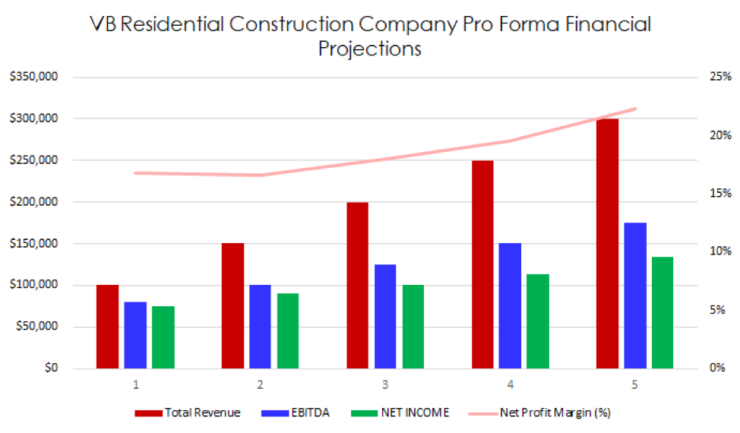
Company Overview
Who is vb residential construction company.
VB Residential Construction Company is a newly established contracting company located in Milwaukee, Wisconsin. Founded by cousins, Victor Martinez and Ben Schmidt, they have over 20 years experience in the construction industry. VB specializes in residential remodeling, kitchen and bath construction, as well as custom home building. VB Residential Construction Company also offers residential design, construction, and project management services. VB prides itself in delivering a level of expert craftsmanship to fulfill the vision for the client while exceeding expectations at exceptional value.
Company History
VB comes from the initials of the owners, Victor Martinez and Ben Schmidt, two cousins who have been working in the construction industry most of their lives. Both of their fathers spent decades as contractors and raised their sons working and learning the construction trade. The four have been working for another residential contractor in Milwaukee and have built and remodeled numerous homes for multiple builders and clients. Now that both of their fathers are retiring from the construction industry, Victor and Ben have decided to start their own residential construction company and use their years of experience, expertise, and contacts to be an independent residential contractor.
Since incorporation, VB Residential Construction Company has achieved the following milestones:
- Registered VB Residential Construction Company, LLC to transact business in the state of Wisconsin.
- Located a small office space to have a physical address for the company as well as a receptionist.
- Reached out to their numerous contacts to include real estate agents, developers, architects, and landowners to advise them on their upcoming construction company in order to start getting construction contracts.
- Began pricing out costs for trucks and necessary construction equipment.
- Began recruiting a team of contractors that cover different areas of construction to include mechanical, plumbing, electricians, and roofing.
The following will be the services VB Residential Construction Company will provide:
Industry Analysis
Revenue for the Construction industry is expected to continue growing over the five years as demand for new housing expands. Revenues are expected to reach $107 billion.
Relatively low interest rates, coupled with rising per capita disposable income, is expected to support individual investment in new homes, providing an opportunity for industry revenue growth over the next five years.
Per capita disposable income is expected to rise steadily over the next five years, while concurrently, unemployment will drop, proving favorable conditions for industry growth.
Housing starts are expected to rise an annualized 2.9% and this growth is projected to stem partly from forward-looking consumers that choose to purchase homes while interest rates are low. Relatively low housing stock and relatively low interest rates are expected to lead demand for industry services to increase over the next five years.
Customer Analysis
Demographic profile of target market.
The precise demographics for Milwaukee, Wisconsin are:
| Total | Percent | |
|---|---|---|
| Total population | 590,157 | 100% |
| Male | 284,873 | 48.30% |
| Female | 305,284 | 51.70% |
| Under 5 years | 41,749 | 7.10% |
| 5 to 9 years | 43,509 | 7.40% |
| 10 to 14 years | 41,324 | 7.00% |
| 15 to 19 years | 43,301 | 7.30% |
| 20 to 24 years | 48,119 | 8.20% |
| 25 to 34 years | 106,407 | 18.00% |
| 35 to 44 years | 73,788 | 12.50% |
| 45 to 54 years | 64,669 | 11.00% |
| 55 to 59 years | 35,109 | 5.90% |
| 60 to 64 years | 27,995 | 4.70% |
| 65 to 74 years | 39,539 | 6.70% |
| 75 to 84 years | 17,394 | 2.90% |
| 85 years and over | 7,254 | 1.20% |
| Total housing units | 260,024 | 100% |
| Households | Families | Married Couples | Nonfamily Households | |
|---|---|---|---|---|
| Total | 7,510 | 5,081 | 4,210 | 2,429 |
| Income Breakdown | ||||
| Less than $10,000 | 8.6% | 6.1% | 3.8% | 15.0% |
| $10,000 to $14,999 | 6.2% | 1.7% | 1.4% | 14.9% |
| $15,000 to $24,999 | 12.6% | 8.5% | 7.6% | 21.9% |
| $25,000 to $34,999 | 13.9% | 11.8% | 10.6% | 18.8% |
| $35,000 to $49,999 | 14.5% | 15.6% | 15.1% | 12.0% |
| $50,000 to $74,999 | 21.2% | 26.1% | 26.8% | 11.1% |
| $75,000 to $99,999 | 9.9% | 12.0% | 14.0% | 4.1% |
| $100,000 to $149,999 | 8.9% | 12.3% | 13.7% | 1.5% |
| $150,000 to $199,999 | 2.6% | 3.9% | 4.4% | 0.0% |
| $200,000 or more | 1.6% | 2.1% | 2.5% | 0.7% |
Customer Segmentation
VB Residential Construction Company will primarily target the following customer profiles:
- Households in search of home remodeling services
- Landowners who would like to build homes on their lots
- Architects who have clients that need home building or remodeling services
- Developers who have already partnered with landowners and/or architects and are in search of a residential contractor
Competitive Analysis
Direct and indirect competitors.
VB Residential Construction Company will face competition from other companies with similar business profiles. A description of each competitor company is below.
JM Remodeling
JM Remodeling has been in business in Milwaukee, Wisconsin since 1990. They are a full-service design and build company. JM Remodeling specializes in residential and commercial restoration and renovation including custom carpentry, kitchens, bathrooms, roofing, siding, dormers, additions, home gyms, home offices, porches and decks, and mechanical services. JM Remodeling carries a staff of plumbers, electricians, journeymen carpenters, restoration specialists, roofers, siders, sheet metal workers, and expert estimators. JM Remodeling also has an apprenticeship program to train employees within the company. They are licensed, bonded and insured and also part of the National Association of Remodeling Industry (NARI). JM Remodeling also provides warranties on all their services. The work is guaranteed by labor warranties, factory warranties, and extended warranties.
Cream City Construction
Cream City Construction has more than 50 years experience in home design, remodeling and renovation in the Greater Milwaukee area and Southeastern Wisconsin. The home remodeling services they provide are additions, whole house remodeling, kitchens, bathrooms, lower levels, master suites and historic renovations. Cream City Construction is a design build company that works with the client to create the design plans, generate project costs, and build the project.
Cream City Construction is owned and managed by Todd Badovski and Jim Grote. Together they have decades of experience and have spent years refining the skills required to run a high end, quality driven remodeling company. The majority of their projects come from repeat business or referrals from clients delighted with their previous service. Cream City Construction is also a member of the National Association of Remodeling Industry (NARI) as well as the Historic Milwaukee Incorporated.
Sazama Design Build Remodel, LLC
Former restaurant owner Don Sazama established Sazama Design Build Remodel, LLC in 1987 after becoming a Master Carpenter. He wanted to merge his passions of business and design and expand his skills in carpentry and architecture. Don’s firm has completed over 700 homes and won 11 awards from the Milwaukee Home and Living magazine. Sazama Design Build Remodel builds homes that are modern and luxurious and have completed many large remodels of bathroom and kitchen renovations. Sazama likes to collaborate with firms such as Ivy Interiors and an award-winning landscape designer, Gingko Leaf Studio. Sazama Design Build Remodel can build and design all aspects of a home – from a home office, outdoor entertaining area, serene spas, and inviting kitchens. The team at Sazama is able to do a historic renovation, build or renovate into something modern and posh, or keep it traditional.
Competitive Advantage
VB Residential Construction Company will be able to offer the following advantages over their competition:
Marketing Plan
Brand & value proposition.
VB Residential Construction Company will offer the unique value proposition to its clientele:
- Highly trusted and professional contractors with over 20 years of experience remodeling, renovating, and building homes.
- Unbeatable pricing to its clients – VB Residential Construction Company does not mark up its services at a large percentage. They will offer the lowest prices in town.
Promotions Strategy
The promotions strategy for VB Residential Construction Company is as follows:
Word of Mouth/Referrals
Victor and Ben have built up an extensive list of contacts over the years providing home construction services for numerous highly satisfied clients. Most of the clients are repeat customers and have also referred them to other associates for home projects. These referrals and repeat customers are very likely to use VB Residential Construction Company instead of the previous construction company Victor and Ben were employed at.
Professional Associations and Networking
VB Residential Construction Company will become a member of construction and professional associations such as the National Association of Remodeling Industry (NARI) and the Milwaukee Chamber of Commerce. VB will also become a member in associations where other builders, developers, and architects are a part of. They will focus their networking efforts on expanding their client network.
Print Advertising/Billboard
VB Residential Construction Company will invest in professionally designed print ads to display in programs or flyers at industry networking events. They will also invest in two billboards to display in highly trafficked areas of town.
Website/SEO Marketing
VB Residential Construction Company will utilize the same advertising company that designed their print ads and billboards to also design their website. The website will be well organized, informative, and list all their services that VB is able to provide. The website will also list their contact information and a gallery of pictures that show their previous projects. The advertising company will also manage VB’s website presence with SEO marketing tactics so that anytime someone types in the Google or Bing search engine “Milwaukee residential contractor”, “contractor near me”, or “residential contractor near me”, VB Residential Construction Company will be listed at the top of the search results.
The pricing of VB Residential Construction Company will be moderate and on par with competitors so customers feel they receive value when purchasing their services.
Operations Plan
The following will be the operations plan for VB Residential Construction Company.
Operation Functions:
- Victor Martinez and Ben Schmidt will be the owners and managers of the company. They will oversee all staff, contractors, and subcontractors. They will also act as project managers for every job they receive and handle all pricing and bids to the client.
- Victor and Ben will employ a team of contractors under them that will have an array of skill sets. The contractors will be trained and experienced either in plumbing, mechanical, electrical, roofing, or siding. Not all contractors need to be certified in all trades, but they need to be certified in at least one of the trades.
- Office manager/assistant to be located at the small office. This person will handle all incoming calls, assist with visiting clients, bookkeeping and maintain files.
- Victor and Ben will utilize a third-party human resources company to handle all hiring, onboarding, payroll, and benefits for the staff. The HR company will also handle all employee issues.
- Victor and Ben will also pay a third-party accounting firm to manage all the high level accounting and tax payments.
Milestones:
VB Residential Construction Company will have the following milestones complete in the next six months.
3/1/202X – Finalize contract to lease small office space
3/15/202X – Execute advertising agency contract 4/1/202X – Begin networking and placing bids for construction jobs
5/1/202X – Begin recruiting and hiring team of contractors
5/15/202X – Purchase all necessary construction equipment, supplies, and trucks
6/1/202X – Start on first official job as VB Residential Construction Company
Victor and Ben are highly skilled at project management and residential construction. They are also both certified in plumbing, electrical, and mechanical. In the next few years, they will be certified as Master Carpenters.
Financial Plan
Key revenue & costs.
The revenue drivers for VB Residential Construction Company are the upcharge they will charge to the clients for their services. VB will purchase or subcontract a service at cost and will charge a 15% markup in order to obtain the markup fee. 15% is below the normal 25%-30% that other competing residential contractors charge.
The cost drivers will be the overhead costs required in order to maintain a construction company. The expenses will be the costs to purchase and maintain construction equipment and trucks, payroll and overhead costs for the staff, and rent and utilities. Other expenses will be the cost for the advertising agency, accounting firm, human resources firm, and membership association fees.
Funding Requirements and Use of Funds
VB Residential Construction Company is seeking $200,000 in debt financing to launch its construction business. The funding will be dedicated towards securing a small office space, purchasing two trucks, and purchasing all the construction equipment and supplies. Funding will also be dedicated towards the advertising agency and three months of overhead costs to include payroll of the staff, rent, and monthly fees to the accounting and human resources firm. The breakout of the funding is below:
Key Assumptions
The following outlines the key assumptions required in order to achieve the revenue and cost numbers in the financials and in order to pay off the startup business loan.
- Initial Monthly Average Contract Amount: $20,000
- Growth in Average Monthly Contracts: 10%
Financial Projections
Income statement.
| FY 1 | FY 2 | FY 3 | FY 4 | FY 5 | ||
|---|---|---|---|---|---|---|
| Revenues | ||||||
| Total Revenues | $360,000 | $793,728 | $875,006 | $964,606 | $1,063,382 | |
| Expenses & Costs | ||||||
| Cost of goods sold | $64,800 | $142,871 | $157,501 | $173,629 | $191,409 | |
| Lease | $50,000 | $51,250 | $52,531 | $53,845 | $55,191 | |
| Marketing | $10,000 | $8,000 | $8,000 | $8,000 | $8,000 | |
| Salaries | $157,015 | $214,030 | $235,968 | $247,766 | $260,155 | |
| Initial expenditure | $10,000 | $0 | $0 | $0 | $0 | |
| Total Expenses & Costs | $291,815 | $416,151 | $454,000 | $483,240 | $514,754 | |
| EBITDA | $68,185 | $377,577 | $421,005 | $481,366 | $548,628 | |
| Depreciation | $27,160 | $27,160 | $27,160 | $27,160 | $27,160 | |
| EBIT | $41,025 | $350,417 | $393,845 | $454,206 | $521,468 | |
| Interest | $23,462 | $20,529 | $17,596 | $14,664 | $11,731 | |
| PRETAX INCOME | $17,563 | $329,888 | $376,249 | $439,543 | $509,737 | |
| Net Operating Loss | $0 | $0 | $0 | $0 | $0 | |
| Use of Net Operating Loss | $0 | $0 | $0 | $0 | $0 | |
| Taxable Income | $17,563 | $329,888 | $376,249 | $439,543 | $509,737 | |
| Income Tax Expense | $6,147 | $115,461 | $131,687 | $153,840 | $178,408 | |
| NET INCOME | $11,416 | $214,427 | $244,562 | $285,703 | $331,329 |
Balance Sheet
| FY 1 | FY 2 | FY 3 | FY 4 | FY 5 | ||
|---|---|---|---|---|---|---|
| ASSETS | ||||||
| Cash | $154,257 | $348,760 | $573,195 | $838,550 | $1,149,286 | |
| Accounts receivable | $0 | $0 | $0 | $0 | $0 | |
| Inventory | $30,000 | $33,072 | $36,459 | $40,192 | $44,308 | |
| Total Current Assets | $184,257 | $381,832 | $609,654 | $878,742 | $1,193,594 | |
| Fixed assets | $180,950 | $180,950 | $180,950 | $180,950 | $180,950 | |
| Depreciation | $27,160 | $54,320 | $81,480 | $108,640 | $135,800 | |
| Net fixed assets | $153,790 | $126,630 | $99,470 | $72,310 | $45,150 | |
| TOTAL ASSETS | $338,047 | $508,462 | $709,124 | $951,052 | $1,238,744 | |
| LIABILITIES & EQUITY | ||||||
| Debt | $315,831 | $270,713 | $225,594 | $180,475 | $135,356 | |
| Accounts payable | $10,800 | $11,906 | $13,125 | $14,469 | $15,951 | |
| Total Liability | $326,631 | $282,618 | $238,719 | $194,944 | $151,307 | |
| Share Capital | $0 | $0 | $0 | $0 | $0 | |
| Retained earnings | $11,416 | $225,843 | $470,405 | $756,108 | $1,087,437 | |
| Total Equity | $11,416 | $225,843 | $470,405 | $756,108 | $1,087,437 | |
| TOTAL LIABILITIES & EQUITY | $338,047 | $508,462 | $709,124 | $951,052 | $1,238,744 |
Cash Flow Statement
| FY 1 | FY 2 | FY 3 | FY 4 | FY 5 | ||
|---|---|---|---|---|---|---|
| CASH FLOW FROM OPERATIONS | ||||||
| Net Income (Loss) | $11,416 | $214,427 | $244,562 | $285,703 | $331,329 | |
| Change in working capital | ($19,200) | ($1,966) | ($2,167) | ($2,389) | ($2,634) | |
| Depreciation | $27,160 | $27,160 | $27,160 | $27,160 | $27,160 | |
| Net Cash Flow from Operations | $19,376 | $239,621 | $269,554 | $310,473 | $355,855 | |
| CASH FLOW FROM INVESTMENTS | ||||||
| Investment | ($180,950) | $0 | $0 | $0 | $0 | |
| Net Cash Flow from Investments | ($180,950) | $0 | $0 | $0 | $0 | |
| CASH FLOW FROM FINANCING | ||||||
| Cash from equity | $0 | $0 | $0 | $0 | $0 | |
| Cash from debt | $315,831 | ($45,119) | ($45,119) | ($45,119) | ($45,119) | |
| Net Cash Flow from Financing | $315,831 | ($45,119) | ($45,119) | ($45,119) | ($45,119) | |
| Net Cash Flow | $154,257 | $194,502 | $224,436 | $265,355 | $310,736 | |
| Cash at Beginning of Period | $0 | $154,257 | $348,760 | $573,195 | $838,550 | |
| Cash at End of Period | $154,257 | $348,760 | $573,195 | $838,550 | $1,149,286 |
Construction Business Plan FAQs
What is a construction business plan.
A construction business plan is a plan to start and/or grow your construction business. Among other things, it outlines your business concept, identifies your target customers, presents your marketing plan and details your financial projections.
You can easily complete your construction business plan using our Construction Business Plan Template here .
What Are the Main Types of Construction Companies?
Construction companies can be classified according to the type of constructions that they perform. Some are small renovation contractors, others are new home builders and others are commercial construction companies.
What Are the Main Sources of Revenues and Expenses for a Construction Company?
Construction companies get their primary source of revenue from individual contracts for new homes, remodeling projects or commercial projects.
The key expenses for construction companies are office space rent, salaries and wages, and equipment costs.
How Do You Get Funding for Your Construction Business Plan?
There are many options for financing a construction company like SBA loans, commercial loans, personal loans, or line of credit. There are also equipment funding opportunities that cover expenses associated with necessary tools, machinery and other equipment. Personal savings, credit card financing and angel investors are also popular forms of funding.
What are the Steps To Start a Construction Business?
Starting a construction business can be an exciting endeavor. Having a clear roadmap of the steps to start a business will help you stay focused on your goals and get started faster.
1. Develop A Construction Business Plan - The first step in starting a business is to create a detailed construction business plan that outlines all aspects of the venture. This should include potential market size and target customers, the services or products you will offer, pricing strategies and a detailed financial forecast.
2. Choose Your Legal Structure - It's important to select an appropriate legal entity for your construction business. This could be a limited liability company (LLC), corporation, partnership, or sole proprietorship. Each type has its own benefits and drawbacks so it’s important to do research and choose wisely so that your construction business is in compliance with local laws.
3. Register Your Construction Business - Once you have chosen a legal structure, the next step is to register your construction business with the government or state where you’re operating from. This includes obtaining licenses and permits as required by federal, state, and local laws.
4. Identify Financing Options - It’s likely that you’ll need some capital to start your construction business, so take some time to identify what financing options are available such as bank loans, investor funding, grants, or crowdfunding platforms.
5. Choose a Location - Whether you plan on operating out of a physical location or not, you should always have an idea of where you’ll be based should it become necessary in the future as well as what kind of space would be suitable for your operations.
6. Hire Employees - There are several ways to find qualified employees including job boards like LinkedIn or Indeed as well as hiring agencies if needed – depending on what type of employees you need it might also be more effective to reach out directly through networking events.
7. Acquire Necessary Construction Equipment & Supplies - In order to start your construction business, you'll need to purchase all of the necessary equipment and supplies to run a successful operation.
8. Market & Promote Your Business - Once you have all the necessary pieces in place, it’s time to start promoting and marketing your construction business. This includes creating a website, utilizing social media platforms like Facebook or Twitter, and having an effective Search Engine Optimization (SEO) strategy. You should also consider traditional marketing techniques such as radio or print advertising.
Learn more about how to start a successful construction business:
- How to Start a Construction Business
Where Can I Get a Construction Business Plan PDF?
You can download our free construction business plan template PDF here . This is a sample construction business plan template you can use in PDF format.
Other Business Plan Templates
Food Truck Business Plan Template
Event Venue Business Plan Template

How To Write a Winning General Contractor Business Plan + Template

Creating a business plan is essential for any business, but it can be especially helpful for a general contractor who wants to refine their strategy.
A well-crafted business plan not only outlines the vision for your company, but also documents a step-by-step roadmap of how you are going to accomplish it. In order to create an effective business plan, you must first understand the components that are essential to its success.
This article provides an overview of the key elements that every general contractor should include in their business plan.
Download the Ultimate Business Plan Template
What is a general contractor business plan.
A general contractor business plan is a formal written document that describes your company’s business strategy and its feasibility. It documents the reasons you will be successful, your areas of competitive advantage, and it includes information about your team members. Your business plan is a key document that will convince investors and lenders (if needed) that you are positioned to become a successful venture.
Why Write a General Contractor Business Plan?
A general contractor business plan is required for banks and investors. The document is a clear and concise guide of your business idea and the steps you will take to make it profitable.
Entrepreneurs can also use this as a roadmap when starting their new company or venture, especially if they are inexperienced in starting a business.
Writing an Effective General Contractor Business Plan
The following are the key components of a successful general contractor business plan:
Executive Summary
The executive summary of a general contractor business plan is a one- to two-page overview of your entire business plan. It should summarize the main points, which will be presented in full in the rest of your business plan.
- Start with a one-line description of your general contractor company
- Provide a short summary of the key points in each section of your business plan, which includes information about your company’s management team, industry analysis, competitive analysis, and financial forecast among others.
Company Description
This section should include a brief history of your company. Include a short description of how your company started and provide a timeline of milestones your company has achieved.
If you are just starting your general contractor business, you may not have a long company history. Instead, you can include information about your professional experience in this industry and how and why you conceived your new venture. If you have worked for a similar company before or have been involved in an entrepreneurial venture before starting your general contractor firm, mention this.
Industry Analysis
The industry or market analysis is an important component of a general contractor business plan. Conduct thorough market research to determine industry trends and document the size of your market.
Questions to answer include:
- What part of the general contractor industry are you targeting?
- How big is the market?
- What trends are happening in the industry right now (and if applicable, how do these trends support the success of your company)?
You should also include sources for the information you provide, such as published research reports and expert opinions.
Customer Analysis
This section should include a list of your target audience(s) with demographic and psychographic profiles (e.g., age, gender, income level, profession, job titles, interests). You will need to provide a profile of each customer segment separately, including their needs and wants.
For example, a general contractor’s customers may include:
Your target customer segments may change as your business grows. As such, you should revisit this section of your business plan periodically and update it as needed.
You can include information about how your customers decide to buy from you as well as what keeps them buying from you.
Develop a strategy for targeting those customers who are most likely to buy from you, as well as those that might be influenced to buy your products or general contractor services with the right marketing.
Competitive Analysis
The competitive analysis helps you determine how your product or service will be different from competitors and what your unique selling proposition (USP) might be that will set you apart in this industry.
For each competitor, list their strengths and weaknesses. Next, determine your areas of competitive differentiation or advantage; that is, in what ways are you different from and ideally better than your competitors.
Marketing Plan
This part of the business plan is where you determine and document your marketing plan. . Your plan should be laid out, including the following 4 Ps.
- Product/Service : Detail your product/service offerings here. Document their features and benefits.
- Price : Document your pricing strategy here. In addition to stating the prices for your products/services, mention how your pricing compares to your competition.
- Place : Where will your customers find you? What channels of distribution (e.g., partnerships) will you use to reach them if applicable?
- Promotion : How will you reach your target customers? For example, you may use social media, write blog posts, create an email marketing campaign, use pay-per-click advertising, or launch a direct mail campaign. Or you may promote your general contractor business via word-of-mouth or referrals .
Operations Plan
This part of your general contractor business plan should include the following information:
- How will you deliver your product/service to customers? For example, will you do it in person or over the phone?
- What infrastructure, equipment, and resources are needed to operate successfully? How can you meet those requirements within budget constraints?
The operations plan is where you also need to include your company’s business policies. You will want to establish policies related to everything from customer service to pricing, to the overall brand image you are trying to present.
Finally, and most importantly, in your Operations Plan, you will lay out the milestones your company hopes to achieve within the next five years. Create a chart that shows the key milestone(s) you hope to achieve each quarter for the next four quarters, and then each year for the following four years. Examples of milestones for a general contractor business include reaching $X in sales. Other examples include expanding to a new location, adding a new service, or increasing the number of employees.
Management Team
List your team members here, including their names and titles, as well as their expertise and experience relevant to your specific general contractor industry. Include brief biography sketches for each team member.
Particularly if you are seeking funding, the goal of this section is to convince investors and lenders that your team has the expertise and experience to execute on your plan. If you are missing key team members, document the roles and responsibilities you plan to hire for in the future.
Financial Plan
Here you will include a summary of your complete and detailed financial plan (your full financial projections go in the Appendix).
This includes the following three financial statements:
Income Statement
Your income statement should include:
- Revenue : how much revenue you generate.
- Cost of Goods Sold : These are your direct costs associated with generating revenue. This includes labor costs, as well as the cost of any equipment and supplies used to deliver the product/service offering.
- Net Income (or loss) : Once expenses and revenue are totaled and deducted from each other, this is the net income or loss.
Sample Income Statement for a Startup General Contractor Company
| Revenues | $ 336,090 | $ 450,940 | $ 605,000 | $ 811,730 | $ 1,089,100 |
| $ 336,090 | $ 450,940 | $ 605,000 | $ 811,730 | $ 1,089,100 | |
| Direct Cost | |||||
| Direct Costs | $ 67,210 | $ 90,190 | $ 121,000 | $ 162,340 | $ 217,820 |
| $ 67,210 | $ 90,190 | $ 121,000 | $ 162,340 | $ 217,820 | |
| $ 268,880 | $ 360,750 | $ 484,000 | $ 649,390 | $ 871,280 | |
| Salaries | $ 96,000 | $ 99,840 | $ 105,371 | $ 110,639 | $ 116,171 |
| Marketing Expenses | $ 61,200 | $ 64,400 | $ 67,600 | $ 71,000 | $ 74,600 |
| Rent/Utility Expenses | $ 36,400 | $ 37,500 | $ 38,700 | $ 39,800 | $ 41,000 |
| Other Expenses | $ 9,200 | $ 9,200 | $ 9,200 | $ 9,400 | $ 9,500 |
| $ 202,800 | $ 210,940 | $ 220,871 | $ 230,839 | $ 241,271 | |
| EBITDA | $ 66,080 | $ 149,810 | $ 263,129 | $ 418,551 | $ 630,009 |
| Depreciation | $ 5,200 | $ 5,200 | $ 5,200 | $ 5,200 | $ 4,200 |
| EBIT | $ 60,880 | $ 144,610 | $ 257,929 | $ 413,351 | $ 625,809 |
| Interest Expense | $ 7,600 | $ 7,600 | $ 7,600 | $ 7,600 | $ 7,600 |
| $ 53,280 | $ 137,010 | $ 250,329 | $ 405,751 | $ 618,209 | |
| Taxable Income | $ 53,280 | $ 137,010 | $ 250,329 | $ 405,751 | $ 618,209 |
| Income Tax Expense | $ 18,700 | $ 47,900 | $ 87,600 | $ 142,000 | $ 216,400 |
| $ 34,580 | $ 89,110 | $ 162,729 | $ 263,751 | $ 401,809 | |
| 10% | 20% | 27% | 32% | 37% | |
Balance Sheet
Include a balance sheet that shows your assets, liabilities, and equity. Your balance sheet should include:
- Assets : All of the things you own (including cash).
- Liabilities : This is what you owe against your company’s assets, such as accounts payable or loans.
- Equity : The worth of your business after all liabilities and assets are totaled and deducted from each other.
Sample Balance Sheet for a Startup General Contractor Company
| Cash | $ 105,342 | $ 188,252 | $ 340,881 | $ 597,431 | $ 869,278 |
| Other Current Assets | $ 41,600 | $ 55,800 | $ 74,800 | $ 90,200 | $ 121,000 |
| Total Current Assets | $ 146,942 | $ 244,052 | $ 415,681 | $ 687,631 | $ 990,278 |
| Fixed Assets | $ 25,000 | $ 25,000 | $ 25,000 | $ 25,000 | $ 25,000 |
| Accum Depreciation | $ 5,200 | $ 10,400 | $ 15,600 | $ 20,800 | $ 25,000 |
| Net fixed assets | $ 19,800 | $ 14,600 | $ 9,400 | $ 4,200 | $ 0 |
| $ 166,742 | $ 258,652 | $ 425,081 | $ 691,831 | $ 990,278 | |
| Current Liabilities | $ 23,300 | $ 26,100 | $ 29,800 | $ 32,800 | $ 38,300 |
| Debt outstanding | $ 108,862 | $ 108,862 | $ 108,862 | $ 108,862 | $ 0 |
| $ 132,162 | $ 134,962 | $ 138,662 | $ 141,662 | $ 38,300 | |
| Share Capital | $ 0 | $ 0 | $ 0 | $ 0 | $ 0 |
| Retained earnings | $ 34,580 | $ 123,690 | $ 286,419 | $ 550,170 | $ 951,978 |
| $ 34,580 | $ 123,690 | $ 286,419 | $ 550,170 | $ 951,978 | |
| $ 166,742 | $ 258,652 | $ 425,081 | $ 691,831 | $ 990,278 | |
Cash Flow Statement
Include a cash flow statement showing how much cash comes in, how much cash goes out and a net cash flow for each year. The cash flow statement should include:
- Cash Flow From Operations
- Cash Flow From Investments
- Cash Flow From Financing
Below is a sample of a projected cash flow statement for a startup general contractor business.
Sample Cash Flow Statement for a Startup General Contractor Company
| Net Income (Loss) | $ 34,580 | $ 89,110 | $ 162,729 | $ 263,751 | $ 401,809 |
| Change in Working Capital | $ (18,300) | $ (11,400) | $ (15,300) | $ (12,400) | $ (25,300) |
| Plus Depreciation | $ 5,200 | $ 5,200 | $ 5,200 | $ 5,200 | $ 4,200 |
| Net Cash Flow from Operations | $ 21,480 | $ 82,910 | $ 152,629 | $ 256,551 | $ 380,709 |
| Fixed Assets | $ (25,000) | $ 0 | $ 0 | $ 0 | $ 0 |
| Net Cash Flow from Investments | $ (25,000) | $ 0 | $ 0 | $ 0 | $ 0 |
| Cash from Equity | $ 0 | $ 0 | $ 0 | $ 0 | $ 0 |
| Cash from Debt financing | $ 108,862 | $ 0 | $ 0 | $ 0 | $ (108,862) |
| Net Cash Flow from Financing | $ 108,862 | $ 0 | $ 0 | $ 0 | $ (108,862) |
| Net Cash Flow | $ 105,342 | $ 82,910 | $ 152,629 | $ 256,551 | $ 271,847 |
| Cash at Beginning of Period | $ 0 | $ 105,342 | $ 188,252 | $ 340,881 | $ 597,431 |
| Cash at End of Period | $ 105,342 | $ 188,252 | $ 340,881 | $ 597,431 | $ 869,278 |
You will also want to include an appendix section which will include:
- Your complete financial projections
- A complete list of your company’s business policies and procedures related to the rest of the business plan (marketing, operations, etc.)
- Any other documentation which supports what you included in the body of your business plan.
Writing a good business plan gives you the advantage of being fully prepared to launch and/or grow your general contractor company. It not only outlines your business vision but also provides a step-by-step process of how you will accomplish it.
A well-written business plan is an essential tool for any general contractor company. The tips we’ve provided in this article should help you write a winning business plan for your general contractor business.

Finish Your General Contractor Business Plan in 1 Day!
Wish there was a faster, easier way to finish your general contractor business plan?
With our Ultimate Business Plan Template you can finish your plan in just 8 hours or less!
- Sample Business Plans
- Construction, Architecture & Engineering
Construction Company Business Plan

Growing a construction company is much more difficult and taxing than completing projects.
From acquiring a new project to meeting deadlines, managing the budget, and many more things in between- you will find yourself drowning in responsibilities when you start a construction company.
A construction business plan can come to your rescue in such burdensome situations. If prepared well, it can become a reference point for your company as it continues to grow.
Confused about how to write a business plan?
Well, this article will serve you perfectly. It will help you understand the contents of the business plan and offer a sample template for your construction company.
So let’s build a solid construction company business plan with this detailed guide.
Let’s dive right in.
Why do you need a construction company business plan?
Apart from the fact that investors and banks would ask for a business plan when you seek funding, here are a few more reasons you need a business plan.
- A business plan offers a roadmap to your business. It acts as a guiding block that has answers to all your how, when, where, and what.
- It helps in determining the exact target market for your business and formulating strategies to cater accordingly.
- There are millions of construction companies competing in the industry. You can identify your strengths through a business plan and design a competitive edge to stand apart.
- A well-rounded plan prepares you for emergencies that may arise in your business by making a plan for every situation.
- A whole lot of business processes repeat every day. A business plan helps bring consistency by establishing SOPs for various business activities.
And of course, you get your desired funding with a solid business plan that vouches for the potential of your construction company.
Key components of a construction business plan
Writing a business plan gets much easier with a structurally defined flow. Well, let’s have a look at key components that a construction company business plan must have.
Executive Summary: A brief summary of an entire business plan that will encourage the readers to read further.
Company Overview: A brief company description including every detail from company structure to its mission statement and future goals.
Market Analysis: A thorough analysis of the construction industry and your target market. It also includes sections for competitor analysis, future market trends, and scope of growth.
Construction Services: Outline the construction services that your company will offer. Highlight any additional services that will make you a distinct player.
Marketing and Sales Strategy: It includes a strategic plan to achieve success through marketing and sales. Determine the best course of action for your business.
Management Team: Introduce key personnel in managerial and leadership roles. Discuss their roles, qualifications, experience, and expertise.
Operations Plan: A detailed plan that streamlines the everyday operations right from construction methods to hiring employees.
Financial Plan: A financial plan highlights the prominent figures and key reports of your construction company by making necessary financial projections.
Let’s dive further into these topics and get a detailed understanding of writing your business plan.
How to create a construction company business plan?
A poorly written plan serves no purpose. However, with this step-by-step guide on writing construction company business plan, you will uncover every detail that goes into making a fantastic and purpose-serving business plan.
1. Write an executive summary
The executive summary is a concise yet insightful description of your entire business plan.
This one-page document summarizes the most important questions that a reader might have and offers a peek into what they are about to uncover. Investors take a brief glance at your executive summary before deciding whether to proceed further or not.
An executive summary must outline the following details of your construction business in persuasive consecutive paragraphs.
- The exact business opportunity
- The target market
- The problem and the solution to it
- Products and services offered by you
- Market size and growth potential
- Financial highlights
- Management team
Maintain a personal storytelling tone while writing this section and encapsulate every minute detail that can make a difference.
But wait, don’t start writing yet. Write your executive summary only after you are done writing an entire plan. This will help you summarize effectively.
Say goodbye to boring templates
Build your business plan faster and easier with AI
Plans starting from $7/month

2. Prepare a company overview section
This section of a business plan will focus entirely on the details of your construction company.
From the type of construction company to the construction company’s goals- everything in this section is about your company description.
To begin with, highlight the type of construction business you will start. For instance, a residential construction company, general contracting company, industrial construction company, or specialty trade construction.
Clarify, if this will be a new business or an extension of existing business. If the business is already operating, offer a brief description of the business history.
After that, highlight the business structure of your construction company. Are you going to be a sole trader or start a limited liability company (LLC) or a limited partnership firm? The business structure you choose will decide how the finances and taxes will work in your business.
Now, this section is your chance to weave magical stories around your construction company. Present the mission statement, company’s objectives, and future goals over here.
For instance,
Mission statement : Syncore aims to become a trusted name for sustainable residential construction projects in Arizona by 2028. With our commitment to the highest quality standards, we will penetrate the market with our premium budgeted solutions.
Business goals :
- Onboarding and signing 15 construction projects in a span of 6 months.
- Generating revenue of $2 million by 2025.
Like this, you will write this entire section in parts by offering a brief overview of your construction business.
3. Conduct a competitive and market analysis
In this section of a business plan, you begin with industry analysis and then narrow it down to your particular market segment. This is important to show your potential investors that there are promising opportunities in this market.
Using market research practices determine the target market for your construction business. Create a buyer persona to identify what your ideal customer will look like.
Further, highlight your competitors in this competitive construction industry. Using SWOT analysis and PESTEL, determine the strengths and weaknesses of competing construction companies. In this section, you will also highlight your strengths to gain a competitive edge over existing players.
Don’t limit your market study to merely understanding the current scenarios. Extend the research and identify future trends and growth possibilities in your targeted market.
If you are a residential construction company focused on sustainable building practices, you must include the following details in your market analysis section.
- How large is the construction industry?
- What segment of the construction market will you capture?
- Who will avail of the construction services?
- What is the spending capacity of your target customers?
- Who are the top competing construction companies?
- What are the emerging trends in the industry and how will you leverage those?
- What is the growth potential of your target market?
Focus on quality market research as this will form the base of your further projections and strategies.
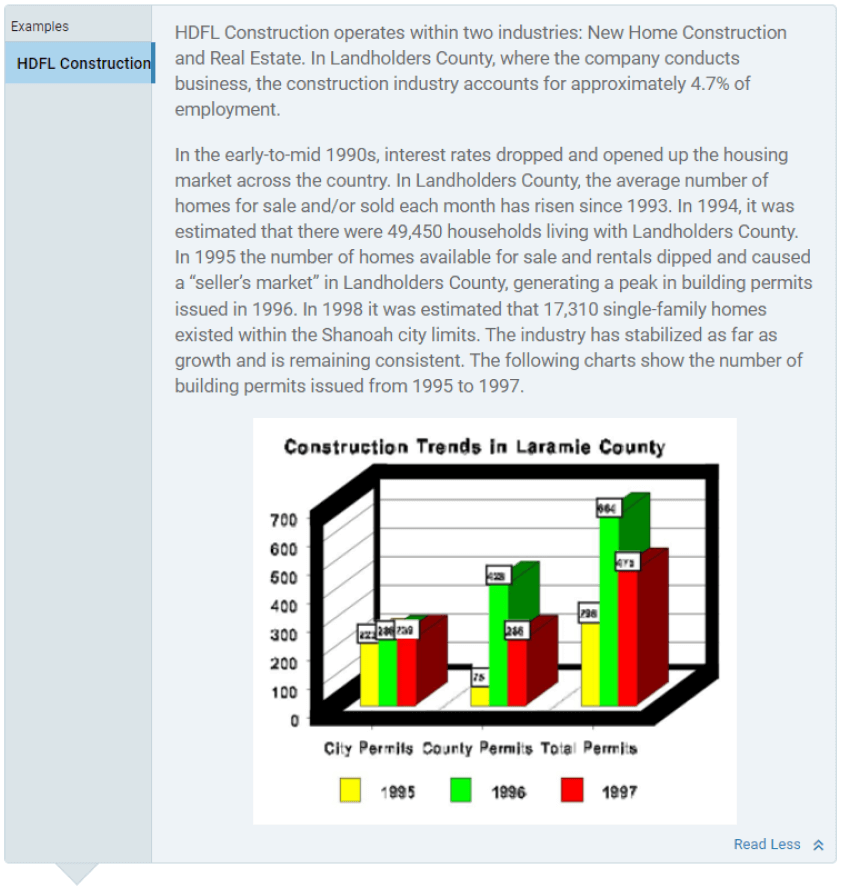
This screenshot of the construction business plan example highlights only the market size for HDFL construction. You can also include details like competitors analysis, growth potential, and market trends here.
4. Describe your construction service offerings
What construction services will you offer your potential clients?
Offer a detailed answer to this question, as you write a business plan section for service offerings.
Overall, this section should highlight every service offering that will bring you money. This could include services like,
- General contracting services
- Design and Engineering
- Construction
- Renovation and remodeling
- Project management
- Specialty services i.e. concrete work, HVAC installation, Roofing services
- Maintenance and repairs
Offer a brief understanding of these service offerings and highlight construction jobs you will specialize in. For instance, remodeling of kitchen and bathroom.
Now, will your construction company sell any construction materials for profit? If so, include details for that as well.
It’s important to consider the breadth of your service offerings to keep the customers coming back.
Overall, this section is your chance to prove to potential investors that your services can stand solid in the competitive construction industry.
5. Propose marketing and sales strategies
According to the IBIS world report , there are more than 3,787,470 construction businesses in the USA. Starting a construction company will add one more to this list, but hey- How do you wish to make a brand that your target audience can recall easily?
All the market assessment and understanding of your potential clients will come in handy at this stage as you make your marketing plan and sales strategies.
Take an opportunity to lay out your sales plan in this section. If you have existing customers, explain how you plan to retain them.
After you are done making your sales strategies, touch the marketing aspect.
Firstly, identify the way you want your brand to be recognized- as an ordinary construction firm, a luxury construction company, a sustainable solutions firm, or an affordable construction company. This will help you make a marketing plan.
Your marketing strategy should answer the following questions:
- Which marketing channels will you use- Online, offline, or a mix of both?
- How will you generate more leads?
- Online marketing methods- search engines, social media, Email marketing, content marketing, etc.
- If you are going to be utilizing social media platforms- which ones?
- How much will you budget for paid ads?
- Will you use billboards, pamphlets, and newspaper advertisements to market your business?
Keep in mind the marketing channels where you can find your potential customers. For instance, you are more likely to find conversions through Email campaigns than social media campaigns, if you are finding clients for commercial construction.
All in all, in this section you have to draw potential investors’ attention with your sales and marketing strategy.
6. Introduce your management team
Everyone is aware of the cutthroat competition in the construction industry. Knowing that you need an able team to transform your business plan into a successful venture.
After laying out your marketing strategy, it’s time to introduce the key management and leadership team to your business plan.
It’s okay to brag about the talented individuals you have in your company. From construction heads to project managers, highlight the achievements, experience, and expertise of these people and prove their asset-worthiness for your company.
Also, draw the hierarchical map to give potential investors an idea of your organizational structure.
This is your time to prove that you have both the means and manpower to run a successful company.
7. Outline your operational plan
You may know construction, but do you know how to run a construction business?
As someone said, “ Seamless operations are the silent engine of extraordinary business achievements”
Before even taking the first project, it’s important to define operations and SOPs for different business activities. Make it so thorough that it can act as a guidebook whenever a problem arises in your construction company.
As you write a business plan for this section, focus on answering the following questions:
- What construction materials will you use?
- What will be the supply chain process in your construction company?
- Who will oversee the project management on site?
- What will be the timeline for completing projects?
- What will be health and safety protocols for construction workers?
- What will be the process of construction work?
- How will the communication flow within an organization?
- What technologies and equipment will you use?
- How will you ensure quality work?
- How will you hire employees?
- What accounting software will you use?
This is just a general gist of questions that can help you prepare this section. Consider it as a living document that will undergo various changes as the business commences and grows.
A thorough operations plan will lay a clear groundwork for running a company. Moreover, it will instill investors’ faith in your ability to run a construction company.
8. Create a financial plan
Writing a sound financial plan is a challenge but nothing that your determined mind can’t handle.
Whether you plan to raise funds or get bank loans, you need a sound financial plan. Investors will analyze this section and only if they find your business financially viable, will they invest.
In this section, you will make financial projections and estimates for your construction company. This includes forecasting sales, estimating startup costs , projecting overhead costs, and making a pricing plan.
Using the startup costs projection, determine how much funding is essential to start your own construction company.
Also, prepare different reports like income statements, cash flow statements, balance sheets, and break-even analyses using the projections made earlier.
To make a financial plan more relevant, consider various progressive and aggressive situations.
Lastly, prepare graphs, charts, and diagrams to make this section visually appealing and easy to grasp.
Now, stop. Don’t start writing a financial plan yet. You need a financial forecasting tool from Upmetrics to help you with projections and calculations of cash flow, sales, revenue, and everything else. Simply enter the data and it will make detailed and precise calculations for you.
Trust us, you don’t want to scratch your heads writing the entire plan from ground level.
And that’s it! With all this information you pretty much know everything that a construction business plan must have.
Construction Industry Highlights 2023
Now that you are almost set to open a construction company, here are a few industry statistics that might interest you.
- Market size : The US construction market sector was valued at 1.8 trillion US dollars in 2022.
- Growth of the virtual construction market : The global BIM market is 7.9 billion US dollars . North America is projected to be a market leader capturing 30% of this market.
- Rise in prefabrication and modular construction : Healthcare facilities followed by hotels/motels and educational institutions are most likely to avail of modular construction facilities.
- Major concerns : The leading concerns encircling the construction industry are inflation and supply chain disruptions faced by nearly 90% of constructors.
- Sustainable and green building : There is a continuous increase in demand for sustainable and green building solutions. As for 2021, the green building market in the USA was reported to be approximately 83 billion dollars .
- Growing investment in smart cities : According to IDC, the investment in smart cities is expected to grow to 203 billion dollars by 2024.
From sustainability to tech-centric processes, the construction industry is making huge shifts in trends. Both, small businesses and large have to evolve according to changing times to keep themselves relevant.
Download a Sample Construction Company Business Plan
So, ready to create a construction business plan from scratch but need more guidance? Look no further; download our free construction company business plan pdf and start writing.
It’s an advanced investor-friendly template that has been crafted with construction businesses in mind. It comes with step-by-step instructions and examples to assist you in developing your own business plan. Use this sample business plan as a guide.
The Quickest Way to turn a Business Idea into a Business Plan
Fill-in-the-blanks and automatic financials make it easy.
Write your business plan with Upmetrics
A lot of us struggle when it comes to translating our ideas into a solid construction business plan. But not with Upmetrics.
Upmetrics is an intuitively designed business planning app with more than 400+ sample business plans . Our business planning tool features AI assistance that will transform your business writing process. Not only that, it allows you to design, collaborate, and share your business plan in real-time with your team.
So what are you waiting for?
Let’s Build your plan with our business plan builder.
Related Posts
Engineering Consulting Business Plan
Real Estate Development Business Plan
Best Sample Business Plans Example
Architecture Business Plan
Main Parts of a Business Plan
Table of Contents in Business Plan
Frequently asked questions, what kind of market research should i include in my construction business plan.
The market research for your construction business plan must include the following details:
- The market size of your targeted market, i.e. commercial construction, residential construction, etc.
- The target audience of your services and their buyers’ persona
- Top competing firms and companies offering similar services
- Emerging trends in your market
- Growth potential for your firm
Is a SWOT analysis necessary for a construction company business plan?
Absolutely yes. There are more than a billion construction companies in the USA itself. Starting another business won’t guarantee success unless you have a business that can withstand the dynamic competitive environment. SWOT analysis will make you aware of the company’s strengths, weaknesses, and the opportunities it can avail
What are the initial startup costs for a construction company?
It is possible to start a construction company with as little as $10,000. However, if you plan to set up a mid-sized construction company, expect to spend anywhere around $50,000-$250,000 on getting a basic setup. This includes accounting for licenses, insurance, office setup, construction materials, and payroll for the initial months.
Can I get government grants for a construction business?
Yes, you can apply for government grants to start your construction business. Check the local, federal, and state regulations to see which grants are applicable to your business. Check the eligibility and apply accordingly.
How often should I update my construction business plan?
A business plan is a living document that can guide you toward success if mapped properly. Ideally, you should update your business plan every 4-6 months to make it relevant. Set aside time to do so as a renewed plan will offer deep and meaningful insight into your business goals.
About the Author
Upmetrics Team
Upmetrics is the #1 business planning software that helps entrepreneurs and business owners create investment-ready business plans using AI. We regularly share business planning insights on our blog. Check out the Upmetrics blog for such interesting reads. Read more

Turn your business idea into a solid business plan
Explore Plan Builder
Plan your business in the shortest time possible
No Risk – Cancel at Any Time – 15 Day Money Back Guarantee

Create a great Business Plan with great price.
- 400+ Business plan templates & examples
- AI Assistance & step by step guidance
- 4.8 Star rating on Trustpilot
Streamline your business planning process with Upmetrics .

- Business plans
Construction Company Business Plan
Used 4,997 times
The objectives and tactics of a construction company are described in a business plan for a construction company. For the creation of your business plan, use this Construction Company Business Plan Template.
e-Sign with PandaDoc

Created by:
[Sender.FirstName] [Sender.LastName]
[Sender.Company]
INTRODUCTION
This business plan is for a construction company that will offer a wide range of services to residential, commercial, and industrial clients. The company will be owned and operated by [Sender.FirstName] [Sender.LastName] , who has (insert number) years of experience in the construction industry.
COMPANY DESCRIPTION
[Sender.Company] will be located in [Sender.City] , [Sender.State] and will serve the surrounding area. The company will be registered as a(n) (LLC/Corporation) and will have (insert number) employees at the start, including the owner. The company will offer a range of services, including new construction, renovations, and repairs for residential, commercial, and industrial clients. The company will also offer project management and design services.
MARKET ANALYSIS
The construction industry is expected to grow at a rate of (percentage) over the next five years. The demand for construction services is driven by population growth, economic development, and the need to update and improve existing buildings. [Sender.Company] will target residential, commercial, and industrial clients in the [Sender.City] area, focusing on high-quality workmanship and customer satisfaction.
MARKETING STRATEGY
[Sender.Company] will use a combination of traditional and digital marketing techniques to reach potential clients. This will include advertising in local newspapers and industry publications, as well as utilizing social media platforms and email marketing to promote services and specials. The company will also rely on word-of-mouth referrals from satisfied customers.
[Sender.Company] will have a team of skilled contractors and tradespeople who will be responsible for completing projects promptly and professionally. The company will have a project manager who will oversee all projects and ensure that they are completed to the highest standards. The company will maintain a well-stocked warehouse with a variety of construction materials and equipment to ensure that projects can be completed efficiently.
FINANCIAL PLAN
[Sender.Company] will generate revenue through the sale of construction services to residential, commercial, and industrial clients. The company will also generate revenue through the sale of construction materials and equipment. The company will have operating expenses, including payroll, rent, utilities, and insurance. The company expects to generate (Amount) in revenue in the first year, with a projected growth rate of (Percentage) per year.
[Sender.Company] is well-positioned to take advantage of the growing demand for construction services in the [Sender.City] area. With a team of experienced contractors, a focus on high-quality workmanship, and a commitment to customer satisfaction, the company is confident that it will be successful in the competitive construction market.
[Client.FirstName] [Client.LastName]
Care to rate this template?
Your rating will help others.
Thanks for your rate!
Useful resources
- Featured Templates
- Sales Proposals
- NDA Agreements
- Operating Agreements
- Service Agreements
- Sales Documents
- Marketing Proposals
- Rental and Lease Agreements
- Quote Templates
- Business Proposals
- Agreement Templates
- Purchase Agreements
- Contract Templates
Business Plan
- Great for beginners
- Ready-to-use, fully customizable Subcategory
- Get started in seconds

A great business plan is essential for any successful business. Whether you're launching a new venture or growing an existing one, having a well-thought-out plan gives you the roadmap and clarity to make smart decisions.
Creating a comprehensive business plan doesn't have to be complicated or time-consuming. ClickUp's Business Plan Template helps you quickly and easily create a detailed plan to cover all the bases:
- Define your goals and objectives
- Develop your strategy and execution timeline
- Track progress, identify risks, and measure success
Make your vision come alive with the right business plan - ClickUp's template will help get you there!
A business plan template is an invaluable tool for any entrepreneur or small business owner. It can help you:
- Clearly define your business goals and objectives
- Identify your target market and customer segments
- Outline your competitive advantages
- Develop a strategy for success and growth
ClickUp's Business Plan Template is designed to help you create and track a comprehensive business plan. This List template includes:
- Custom Statuses: Create tasks with custom statuses such as Complete, In Progress, Needs Revision, and To Do to keep track of the progress of each step in the business plan
- Custom Fields: Categorize and add attributes such as Reference, Approved, and Section to manage your tasks and easily visualize the steps of a business plan
- Custom Views: Open 5 different views in different ClickUp configurations, such as Topics, Status, Timeline, Business Plan, and Getting Started Guide so that you can hit the ground running
- Project Management: Improve business plan tracking with tagging, nested subtasks, multiple assignees, and priority labels
Creating a business plan is an important first step when starting a business. A good business plan should outline your goals, strategies, and objectives. It should also include a timeline of when you plan to accomplish each step. With ClickUp, creating a comprehensive and effective business plan is easy. Here are five steps to get started:
Your business plan should start with a strong statement of your objectives. This will provide an overview of what your business is all about and what your goals are. Use a Doc in ClickUp to brainstorm ideas for objectives and collect feedback from your team.
Your business plan should also include a description of the products or services you offer. Describe the features and benefits of each product or service and explain how it meets customer needs.
Create tasks in ClickUp to list out the features and benefits of each product or service.
In order to make sure your plan stays on track, create a timeline of when you plan to accomplish each step of the plan. Use a Gantt chart in ClickUp to plan out tasks in chronological order and track your progress over time.
Your business plan should include measurable goals that you can use to track your progress. These goals should be specific, realistic, and achievable.
Create Goals in ClickUp to set measurable targets and track your progress.
Once your business plan is complete, share it with your team and review it regularly. This will help ensure that everyone is on the same page and working towards the same goals.
Set a recurring task in ClickUp to review your business plan and make any necessary changes.
Entrepreneurs and business owners can use this Business Plan Template to help everyone stay on the same page when it comes to planning and organizing business goals.
First, hit “Add Template” to sign up for ClickUp and add the template to your Workspace. Make sure you designate which Space or location in your Workspace you’d like this template applied.
Next, invite relevant members or guests to your Workspace to start collaborating.
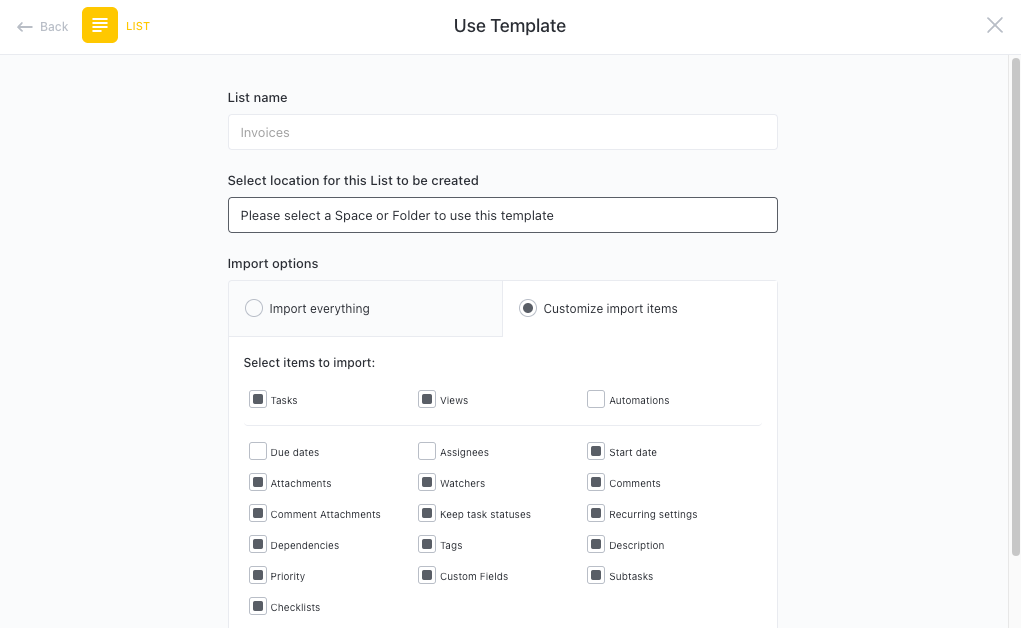
Now you can take advantage of the full potential of this template to create a successful business plan:
- Use the Topics View to organize tasks by area of focus
- The Status View will help you keep track of progress and update statuses as tasks are completed
- The Timeline View will help you create a timeline for each task and ensure that deadlines are met
- The Business Plan View will give you a space to store all of your business plan documents
- The Getting Started Guide will help you get up and running quickly and efficiently
- Organize tasks into four different statuses: Complete, In Progress, Needs Revision, To Do, to keep track of progress
- Set up notifications to stay up-to-date on progress
- Monitor and analyze tasks to ensure maximum productivity
Get Started with Our Business Plan Template Today
- Project Report Template
- RAID Log Template
- Construction Project Management Template
- Ritual Reset Template
- Project Management Services Contract Template
Template details
Free forever with 100mb storage.
Free training & 24-hours support
Serious about security & privacy
Highest levels of uptime the last 12 months
- Product Roadmap
- Affiliate & Referrals
- On-Demand Demo
- Integrations
- Consultants
- Gantt Chart
- Native Time Tracking
- Automations
- Kanban Board
- vs Airtable
- vs Basecamp
- vs MS Project
- vs Smartsheet
- Software Team Hub
- PM Software Guide

The ultimate business plan for general contractors

Claim your free Nextdoor business page
Claim your business page to get discovered by customers and manage your recommendations

How to Draft a General Contractor Business Plan
If you’re starting out on your own as a general contractor, you likely have skills and knowledge in many specialized areas related to your trade. But crafting a general contractor business plan might still feel challenging. So, why do you need one—and where should you start?
In 2021, 5.4 million businesses launched in the U.S. A strong business plan can help you develop a strategy for business success, attract investors, create successful relationships with potential clients in your target market, and begin to make your dream a reality. Best of all, writing one can prove simpler than you think once you learn the purpose of a general contractor business plan—and how to break it down into simple, manageable steps.
With an effective business plan at your side, your general contractor business could be one of many success stories.
Advantages of having a business plan as a general contractor
Creating a general contractor business plan can help you clarify your strategy for your business, as well as help you explain your plan to others.
More specifically, the benefits of having a general contractor business plan include:
- Internal planning – When crafting their business plan, many general contractors consult with other teammates and partners, such as their accountant. Creating a business plan together can provide a natural opportunity to brainstorm, clarify, and make sure everyone’s on the same page as you launch your company.
- Financial planning – A business plan can help keep you on track when it comes time to make important financial decisions and evaluate what makes the most sense for your business in both the long and short term.
- Persuading potential funders – New businesses often need funding in the form of loans or investors to help them get started. A business plan can help you win over potential funders and clearly explain your vision for your business.
What to include in a general contractor business plan
Your business plan may vary depending on your specific vision for your general contracting business. But as you begin shaping that plan, your business plan should focus on these key sections :
- Cover page – Including a cover page with your contact info can make it easier for potential funders to contact you if they like your business or marketing plan.
- Executive summary – This section quickly and simply describes what your business will do (general contracting), what problem you’ll solve for customers in your community, and five reasons your business will succeed. You can also include how much funding you’re hoping to acquire and your high-level financial projects for your company.
- Company overview – In this section, describe your company location and your legal classification—individual, partnership, or corporation. You can also highlight any successes you’ve achieved or other aspects that will help people better understand—and believe in—your company.
- Analysis of your industry, customers, and competitive advantage – In these three sections, you can break down information about the market you’re competing in, the customers you hope to reach, and why you’ll have a competitive advantage over any other businesses offering similar services. For example, do you have more experience? More existing customer connections? A more cost-effective approach? A higher quality of service? This section lets you show off how well you know your business and how you can improve your customers’ lives.
- Management team – A strong management team with in-depth business planning experience can help guide a business through the first few years. In this section, you can show off your existing team, along with noting any other roles you’re hoping to fill soon.
- Operations and financial plan – An operations plan focuses on the day-to-day work and goals of your contractor business, along with some important milestones you plan to accomplish in the next few years. The financial plan gives you an opportunity to dive into the numbers, showing your funding goals, your revenue goals, and your expected costs. You can also include an appendix with more detailed financial projections, such as balance sheets, cash flow statements, and income statements.
- Marketing strategy – This section can explain how you’ll present your company and services to customers, and any contractor marketing strategies you plan on using to reach new and existing customers.
If you’re finding a particular section challenging, it might be a sign for you to take a step back and do some more planning or research before trying to write that portion of your contractor plan. You can also consult an expert like small business accountant Amanecer Accounting in New Jersey, or a digital marketing consultant at Agency Partner Interactive in Texas.
Lastly, consider joining a local small business owners group. It’s often a useful and energizing opportunity to receive advice and forge connections with others in your city’s small business community.
Strategies to launch your business plan from paper to prosperity
Once you’ve crafted a business plan, the next step is to act on it. And if you’re just starting out, one of the most important steps you can take is to make your business known in the community.
Many years ago, people often found out about new businesses through ads in magazines, newspapers, and the radio, or through word of mouth in the community. Businesses often connected with a customer through the mail or through an in-person conversation.
Today, many potential customers discover, connect, and talk about customers online. About 3.8 million Google searches happen every minute, and that’s not including all the searches that happen on other search engines. When a potential customer needs a contractor for a home repair or renovation, there’s a good chance they’ll type “General contractor + [City name]” into a search bar. When that happens, you want your business to be one they find. Creating a strategy for how you’ll build an online presence can help improve the odds of customers finding you online.
Here are some key ways to help your general contractor business stand out from the crowd using your online presence.
Make your business searchable
Some of the factors that can help your web content appear higher in search engine results include:
- High quality content, including reliable and accurate business information
- Keywords, meta data, complete links, and other internal details that improve search engine optimization (also known as SEO)
- Backlinks, aka other websites that share links to yours
- Easily navigable websites optimized for both abled and disabled users
- A fast loading speed
- Responsive web design, or a website that displays well on both cell phones and desktops
Create a well-rounded digital presence
A digital presence often starts with a website, but it can also include much more. To reach customers through a well-rounded digital presence, consider the following options:
- Website – A website can help potential customers learn what services you offer, as well as learn about successful work you’ve done in the past and how to contact you. You can build your own website using a template model like Wix or Squarespace, or you can hire a local web design company like Oregon-based business Gray’s Web Design for a more personalized touch.
- Social media – Social media can provide another opportunity to connect with customers, but that doesn’t mean you have to produce content for every possible platform. Instead, try to focus on building a presence on platforms where your customers already hang out, and on platforms that make sense for the type of content you want to produce. For example, if you want to show off “Before and After” photos of completed jobs, you probably want to pick a social media platform where people like to share photos and talk about home and business renovations.
- Paid advertising campaigns – You can also reach potential customers by running a paid digital advertising campaign. This might involve running digital banner ads on a specific website, social media platform, or simple text ads for specific search engine results. Depending on where you’re advertising, you can often target your ad to a specific geographic location so that you’re not wasting resources advertising to someone on the other side of the country.
- Nextdoor business account – Nextdoor lets businesses connect specifically with potential customers in the geographic area your general contractor business serves. Through Nextdoor, you can create a free Business Page to connect with customers and establish an online presence. You can also gather recommendations from members to build your reputation as a trustworthy, competent business. Lastly, you can use Nextdoor Ads to promote deals and interact individually with potential customers.
Build your community presence with Nextdoor
Ultimately, you want to ensure that your general contractor business plan includes not just the vision for what your business may one day be—but also the steps you will take to get there. By outlining your funding needs, laying out your key steps, and spreading the word with marketing components, you can build vital connections and gain support within the community you plan to serve.
But you don’t have to do all of this without help. Used by nearly 1 in 3 households across the U.S., Nextdoor helps connect neighbors, organizations, and businesses to build a better community.
Nextdoor offers key features to help local businesses connect with the customers in their neighborhoods. Creating a free Business Page can make it easier for your customers to find you and for you to build an online presence. Business Posts can help you share information about your services, as well as start conversations with potential customers. Nextdoor Ads can help you run promotions and provide additional exposure for your business.
Whether you’re taking the first steps toward founding your business or looking for a way to take an established business to the next level, we offer a way for small businesses to connect with their customers.
NPR. New businesses soared to record highs in 2021. Here's a taste of one of them. https://www.npr.org/2022/01/12/1072057249/new-business-applications-record-high-great-resignation-pandemic-entrepreneur#:~:text=That's%20the%20takeaway%20from%20new,in%202020%20of%204.4%20million .
National Funding. Why a Construction Business Plan Is Essential and How to Build One. https://www.nationalfunding.com/blog/construction-business-plan/
Forbes. Business Plan Template: What To Include. https://www.forbes.com/sites/davelavinsky/2013/07/18/business-plan-template-what-to-include/?sh=9f26b417fc63
Forbes. Building A Brand: Why A Strong Digital Presence Matters. https://www.forbes.com/sites/forbesagencycouncil/2020/07/02/building-a-brand-why-a-strong-digital-presence-matters/?sh=16b186db49f2

Related Professional Services Articles

Professional Services Getting Started Home and Garden Small Business
How to create a landscaping business plan

Professional Services Getting Started Entrepreneur Advice
How to create a childcare or daycare business plan

Professional Services Small Business
Tips to start a consulting business

Professional Services Home and Garden Small Business
How to start a window cleaning business
BUSINESS STRATEGIES
How to create a contractor business plan
- Jeremy Greenbaum
- Oct 30, 2023
- 12 min read

When launching a contracting business, it's essential to craft a detailed and precise business blueprint tailored to your industry. A contractor business plan is a meticulously crafted document that delineates your company's objectives, tactics and financial forecasts within the contracting sector. This blueprint serves as your guiding compass when starting a business , charting the course to success and offering solutions to potential hurdles. It spells out the specific strategies needed to efficiently operate a contracting enterprise.
Keep reading for tips on how to get started with your own business plan when starting a contractor business .
Looking to open up the doors to your business online by making a website ? Try Wix’s website builder today.
Creating a business plan for your contractor business is vital in order to establish a clear direction and ensure the success of your venture. Here are the six primary sections of a business plan to get you started:
Executive summary
Company and domain names, market analysis and research, operations plan, marketing and advertising plan, financial plan, 01. executive summary.
The executive summary is a concise overview of your entire contractor business plan. It should provide a snapshot of your business's mission, goals, products or services, target market, competitive advantage, financial projections and funding requirements. A clear executive summary succinctly communicates your business's essence and potential, serving as a compelling introduction to captivate the reader's interest.
Example of an executive summary: "GreenBuild Contractors is a dynamic and innovative construction company specializing in sustainable residential and commercial projects. With a commitment to quality craftsmanship and environmental stewardship, we aim to revolutionize the construction industry. Our team of experienced professionals combines expertise in green building practices with a passion for creating spaces that resonate with both clients and the environment. By leveraging our unique expertise, GreenBuild Contractors is poised to tap into the growing demand for eco-friendly construction solutions. We are seeking funding to scale our operations, enhance market presence and position ourselves as a leader in sustainable construction."
02. Company and domain names
Choosing the right business name is pivotal for building brand awareness and trust in your contractor business. It should resonate with your services, reflect professionalism and be memorable. To find inspiration, consider using business name generators that offer creative suggestions tailored to your industry.
Be inspired:
Contractor business name ideas
Painting business name ideas
Plumbing business name ideas
Selecting a domain name is equally crucial in today's digital age. It should be aligned with your company name, easy to remember and relevant to your services. Before finalizing your choice, ensure the domain name is also available and not already in use.
Once you’ve decided on your company name and legal structure, make sure to register your business with your state.
03. Market analysis and research
Incorporating a market analysis and research section in your contractor business plan helps you understand the competitive landscape and devise an effective business strategy. Conduct market research to identify your target audience's needs, preferences and pain points. Analyze your competitors' strengths and weaknesses to uncover opportunities for differentiation. This insight will guide your marketing efforts and positioning strategy.
Find your niche:
Handyman business plan
Painting business plan
04. Operations plan
An operations plan within your contractor business plan outlines the practical aspects of your business, including its location, premises, equipment and staffing needs. Describe your business's physical setup, such as office or construction site locations. Detail the types of equipment required for your services and address staffing requirements, roles and responsibilities. A comprehensive operations plan ensures a smooth workflow and efficient resource allocation.
05. Marketing and advertising plan
Your business plan should lay out a detailed marketing and advertising strategy to promote your contractor business. Identify the most relevant marketing channels for your industry, such as a business website , social media, local advertising and trade shows. Highlight specific campaigns—such as showcasing completed projects, offering promotions or educational content about construction trends.
Don’t forget to think about your branding. No matter where you choose to promote your business, you’ll want to make sure that your branding is consistent. Start by using a logo maker to brainstorm construction logo ideas . Shape your visual identity around it, plus articulate your brand’s values, mission and vision (among other essential aspects).
06. Financial plan
The financial plan is a cornerstone of your contractor business plan, detailing how your business will be funded initially and outlining a timeline for achieving profitability. It includes projected revenue, expenses and cash flow statements. Specify the initial investment required for equipment, staffing and other startup costs. Outline your funding sources and clearly define your business's financial trajectory, demonstrating its sustainability and growth potential. Lay out how you plan to make money as a contractor.

Contractor business plan example: UrbanRenovate Builders
Below is a business plan example of a hypothetical contractor business, UrbanRenovate Builders. Feel free to use this as a guide for when you’re creating your own contractor business plan.
UrbanRenovate Builders is a forward-thinking contractor business poised to redefine urban spaces through innovative renovation solutions. With a focus on delivering exceptional craftsmanship and modern design, we aim to become a trusted partner for clients seeking transformative renovation projects. Our team of skilled professionals combines expertise in architectural design, construction and project management to create living spaces that reflect our clients' unique lifestyles. By leveraging our expertise and commitment to quality, UrbanRenovate Builders aims to establish a prominent presence in the competitive renovation market.
Company name : UrbanRenovate Builders
Domain name : www.urbanrenovatebuilders.com
The name "UrbanRenovate Builders" captures our emphasis on urban revitalization and renovation expertise. The corresponding domain name aligns with our brand identity and offers easy access to our online presence, enabling potential clients to learn about our services and portfolio.
Market analysis : UrbanRenovate Builders operates in the bustling urban renovation sector, targeting homeowners and commercial property owners seeking modernization and transformation. Our research indicates a growing demand for sustainable and aesthetically appealing renovation solutions, reflecting a shift towards environmentally-conscious living.
Competitive landscape : We have identified key competitors offering similar renovation services, emphasizing the importance of differentiation through innovation, superior customer service and sustainability.
Location : UrbanRenovate Builders will be headquartered in a central urban location, facilitating easy access to our target market.
Premises : Our office space will accommodate project management, design consultations and administrative tasks.
Equipment : We will invest in state-of-the-art construction and design tools to ensure precise execution of projects.
Staffing : Our team will consist of experienced architects, designers, project managers and skilled construction professionals.
Marketing channels : Our marketing strategy involves a mix of digital platforms (website, social media), local advertising (flyers, community events) and participation in home renovation expos.
Campaigns : We will launch a "Before & After" campaign showcasing successful transformations. We’ll additionally launch a "Sustainability Spotlight" campaign highlighting eco-friendly practices, and "Client Stories" sharing positive experiences.
Startup costs : Initial investment of $150,000 will cover equipment, office setup, marketing efforts and staff salaries.
Funding : Funding will come from personal savings ($50,000) and a bank loan ($100,000).
Financial projections (first year) : revenue: $300,000, expenses: $220,000, profit: $80,000
Financial projections (second year) : revenue: $500,000, expenses: $350,000, profit: $150,000
Profitability timeline : UrbanRenovate Builders aims to achieve profitability within the first year of operation, supported by strategic marketing efforts and excellent project execution.
Benefits of creating a contractor business plan
No matter what type of business you’re starting, a business plan offers several key advantages that can significantly contribute to your company’s success.
Funding : A well-written business plan can be instrumental in attracting investors and raising money for your business . Investors want to see a clear roadmap that outlines your business's potential for growth and profitability. A robust plan demonstrates your commitment, knowledge of the industry and strategies to mitigate risks, making it more likely for investors to feel confident in providing financial support.
Resources : A detailed business plan helps you understand the precise resources, supplies and staff required to launch your contractor business. By conducting a thorough analysis of the equipment, tools, materials and personnel needed, the plan ensures that all essential aspects are considered and allocated appropriately. This proactive approach minimizes the risk of resource shortages or mismanagement, allowing for a smoother business launch.
Operational efficiency : A business plan provides a structured outline of your business's operations. It outlines the step-by-step processes involved in executing projects, managing tasks and meeting client expectations. This clarity improves operational efficiency, reduces confusion among staff and enhances overall project management. Additionally, having a well-defined plan in place helps business owners respond effectively to unexpected challenges, ensuring that projects stay on track.
Risk mitigation : Starting a contractor business involves inherent risks, from market fluctuations to unforeseen project delays. A business plan allows you to identify potential risks and develop corresponding mitigation strategies. By addressing challenges proactively, the business is better equipped to navigate uncertainties and disruptions, maintaining its resilience and reputation.
Competitive edge : A well-researched business plan includes a thorough analysis of the market landscape and competitors. This insight will enable you to identify gaps in the market, recognize emerging trends and position your contractor business strategically to stand out. By tailoring your services to meet specific client needs, your business can gain a competitive edge and establish a unique value proposition.
Financial projections : A crucial aspect of any business plan is its financial projections and growth strategy. By outlining revenue forecasts, expense estimates and profit margins, the plan provides a clear picture of the contractor business's financial health. You can set realistic financial goals and create actionable plans to achieve them, guiding your growth trajectory in a sustainable manner.
How profitable can a contractor business be?
Contractor businesses can be very profitable. According to a report by IBISWorld, the average profit margin for contractor businesses is 10%. This means that for every $100 in revenue, contractor businesses generate $10 in profit.
Of course, not all contractor businesses are equally profitable. Some contractors are able to charge higher fees and generate more profit than others. However, even contractors with a lower profit margin can still be successful if they have a steady stream of clients.
Here are some factors that can contribute to the profitability of a contractor business:
Specialization: Contractors who specialize in a particular area of construction or remodeling can charge higher fees and attract more clients.
Experience: Contractors with more experience tend to be more efficient and can complete projects more quickly. This can lead to higher profits.
Reputation: Contractors with a good reputation are more likely to attract repeat clients and referrals. This can lead to increased business and profits.
Marketing: Contractors who effectively market their business are more likely to generate leads and close more deals. This can lead to increased revenue and profits.
If you are considering starting a contractor business, it's important to do your research and develop a plan to make your business as profitable as possible.
Here are some additional tips for increasing the profitability of your contractor business:
Invest in quality tools and equipment. This will help you complete projects more efficiently and reduce costs.
Track your expenses carefully. This will help you identify areas where you can cut costs and improve your profitability.
Negotiate favorable terms with your suppliers. This can save you money on materials and other costs.
Outsource non-essential tasks. This can free up your time so that you can focus on the most important aspects of your business.
Invest in training and development for your team. This will help your team to be more productive and efficient.
By following these tips, you can increase the profitability of your contractor business and build a successful enterprise.
How to market your contractor business
There are a number of ways to market your contractor business. Here are a few tips:
Create a strong online presence. This includes having a professional website and being active on social media. Your website should be well-designed and easy to navigate, and it should include information about your services, experience and contact information. Your social media pages should be updated regularly with interesting content and photos of your work.
Use local search engine optimization (SEO). This means optimizing your website and online content so that it ranks higher in search engine results pages (SERPs) for relevant keywords. When people search for contractors in your area, you want your website to be one of the first results they see.
Run paid advertising campaigns. You can run paid ads on search engines and social media platforms to reach a wider audience. When creating your ads, be sure to target your ideal customers and use relevant keywords.
Network with other businesses in your area. Attend industry events and join trade associations. This is a great way to meet potential clients and partners.
Offer discounts and promotions. This is a great way to attract new customers and encourage repeat business. You can offer discounts for first-time customers, bulk orders or referrals.
Get involved in your community. Sponsor local events or donate to charities. This is a great way to build relationships and generate goodwill.
Focus on your unique selling points. What makes your business different from other contractors in your area? Highlight your unique selling points in your marketing materials and online content.
Use high-quality photos and videos. Show potential customers the quality of your work by using high-quality photos and videos in your marketing materials.
Make it easy for customers to contact you. Include your contact information prominently on your website and social media pages. Make sure to respond to inquiries promptly and professionally.
Provide excellent customer service. This is essential for building a successful contractor business. Make sure to communicate regularly with your customers, keep them updated on the progress of their project and resolve any issues promptly.
Strategies to launch your contractor business plan
Here are some strategies to launch your contractor business plan:
Define your target market and services. Who are your ideal customers? What services will you offer? What are your unique selling points? Once you have a clear understanding of your target market and services, you can develop a business plan that is tailored to their needs.
Create a strong brand identity. Your brand is what will set you apart from other contractors in your area. Develop a logo, tagline and website that are professional and reflect your business values.
Market your business effectively. There are many different ways to market your contracting business. You can use online and offline marketing channels, such as search engine optimization (SEO), social media and networking events.
Get licensed and insured. In most states, contractors are required to be licensed and insured. This shows potential customers that you are a legitimate business and that you are qualified to perform the services you offer.
Build a team of reliable subcontractors. If you're unable to perform all of the services yourself, you will need to build a team of reliable subcontractors. Make sure to check their references and licenses before hiring them.
Provide excellent customer service. Customer service is key to success in the contracting business. Make sure to communicate regularly with your customers, keep them updated on the progress of their project and resolve any issues promptly.
Here are some additional tips for launching your contractor business:
Start small and scale up as you grow. Don't try to take on too much work at once. Start with small projects and gradually build up your business as you gain experience and a good reputation.
Offer competitive pricing. When setting your prices, be sure to research what other contractors in your area are charging. You want to offer competitive pricing without sacrificing quality.
Get involved in your community. Sponsor local events, donate to charities and get to know other businesses in your area. This will help you to build relationships and generate leads.
Network with other contractors. Join a trade association or attend networking events for contractors. This is a great way to learn from other professionals, get referrals and find new opportunities.
Launching a contractor business can be challenging, but it's also very rewarding. By following these tips, you can increase your chances of success.
Contractor business plan FAQ
How do you build a successful contracting business.
To build a successful contracting business, you need to focus on the following:
Provide excellent customer service. This means communicating regularly with your clients, keeping them updated on the progress of their project and resolving any issues promptly.
Deliver high-quality work. This is essential for building a good reputation and attracting repeat clients.
Be reliable and trustworthy. Show up on time and complete your projects on schedule.
Be professional and courteous. Dress appropriately and treat your clients with respect.
Market your business effectively. Let potential clients know about your services and how you can help them.
What type of construction is most profitable?
Can a contractor be a millionaire, want to create another type of business plan.
How to create a bakery business plan
How to create an eCommerce business plan
How to create a bar business plan
How to create a virtual assistant business plan
How to create a dog walking business plan
How to create a plumbing business plan
How to create a trucking business plan
How to create a daycare business plan
How to create a food truck business plan
How to create a restaurant business plan
How to create a clothing line business plan
How to create a hair salon business plan
How to create a real estate business plan
How to write a nail salon business plan
How to create a vending machine business plan
How to create a party planning business plan
Other business ideas you might be interested in pursuing
How to start an online business
How to start a consulting business
How to start a fitness business
How to start a fitness clothing line
How to start a makeup line
How to start a candle business
How to start a clothing business
How to start an online boutique
How to start a T-shirt business
How to start a jewelry business
How to start a subscription box business
How to start a beauty business
How to start a landscaping business
How to start a food business
How to start a vending machine business
How to start a coaching business
How to start a construction business
How to start a trucking business
How to start a flower business
How to start a car wash business
How to start a food prep business
How to start a DJ business
How to start a pool cleaning business
How to start a baking business
Looking to start a business in a specific state?
How to start a business in Arizona
How to start a business in South Carolina
How to start a business in Virginia
How to start a business in Michigan
How to start a business in California
How to start a business in Florida
How to start a business in Texas
How to start a business in Wisconsin
Related Posts
How to create a website from scratch in 11 steps (for beginners)
How to start a business in 14 steps: a guide for 2024
How to start a contractor business in 6 steps
Was this article helpful?

Construction Business Plan Template [Updated 2024]
Construction Business Plan
If you want to start a new construction company or expand your established business, you need a business plan.
The following construction business plan template gives you the key elements to include in an effective business plan. It can be used to create a commercial construction business plan, a general contractor business plan or business plans for residential construction, building construction or industrial construction.
You can download the Construction business plan template (including a full, customizable financial model) to your computer here.
Sample Business Plan For a Residential Construction Company
Below are links to each of the key sections of a construction company business plan example:
- Executive Summary – The executive summary provides an overview of your business opportunity and summarizes the business plan.
- Company Overview – The company analysis includes information about your business idea, the full service design and construction services you offer, and the business structure.
- Industry Analysis – The industry analysis includes market research that supports your business and provides insights into market trends and the construction industry.
- Customer Analysis – The customer analysis provides an overview of your target market and the demographics and purchasing habits of these target customers.
- Competitive Analysis – The competitive analysis should identify your direct and indirect competitors and highlight your competitive advantage.
- Marketing Plan – The marketing plan includes your overall marketing strategy, pricing strategy and what marketing techniques you will try to attract potential customers (i.e., email marketing, paid advertising, etc.).
- Operations Plan – The Operations Plan includes information on your construction company’s day to day operations, expected operating costs and the bidding process for new construction jobs.
- Management Team – The management team section includes a profile of the business owner and management team including the officer manager and project managers, their experience and responsibilities.
- Financial Plan – The financial plan includes financial projections, including cash flow statements, income statements, and balance sheets for the next 5 years.
Comments are closed.
Business Plan Template Construction

Don't bother with copy and paste.
Get this complete sample business plan as a free text document.
Commercial Contractor Business Plan
Start your own commercial contractor business plan
Twin Brothers Construction
Executive summary executive summary is a brief introduction to your business plan. it describes your business, the problem that it solves, your target market, and financial highlights.">.
Twin Brothers Construction (TBC) plans to become a leading provider of construction and renovation services in the local area. The company’s overall strategy will be based on a continuing improvement process of setting objectives, measuring results, and providing feedback to facilitate further growth and progress.
TBC is a company, with principal offices located in the local area. The company’s management is highly experienced and qualified: the brothers who will lead the management team have each accumulated over twenty five years of experience in the construction industry.
Products/Services Through their years of experience, TBC’s owners have developed sophisticated bidding, scheduling and materials solutions for some of the most complex construction projects being done today. The company will use versatile and completely adaptable methods for a variety of building configurations.
Owners, developers, construction managers, general contractors, and sub-contractors are expected to realize substantial savings in labor and material costs by using the company’s construction methods and systems. Applications include commercial and residential structures.
The Market The housing industry has been growing at a fast pace for several years. An all-time record was set in 1998, when 886,000 new-site single family homes were sold. That represented a 10% gain from the robust total of 804,000 homes sold in 1997. Although there was a slight drop in the number from 2003, this makes for an excellent opportunity for future expansion of the industry.
Twin Brothers Construction plans to rapidly develop marketing alliances with industry leaders and pursue new sales of its services to residential and commercial builders. The marketing strategy will focus on securing city, county, and state and federal government contracts.
TBC plans to use a direct sales force, relationship selling, and sub-contractors to reach its target markets. These channels are most appropriate because of time to market, reduced capital requirements, and fast access to established distribution channels.
Financial Considerations We expect to pass the break-even point in the second half of the first year. Despite initial large outlays in cash to promote sales, the company’s cash account is expected to remain healthy. The company expects approximately $772,000 in sales revenue and reasonable net profits by Year 3.
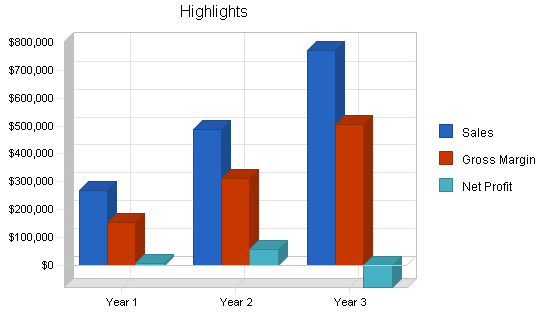
1.1 Mission
Our mission is to be the best partner for our customers, suppliers and employees. To realize our vision, we will strive for profitable growth, operational excellence, customer satisfaction and strong brand positioning.
1.2 Objectives
- To have up to three construction projects established within the first year.
- To have two building renovation projects in progress by the end of the first year.
- To locate and purchase our first rental building by the end of the first year.
- To achieve at least 7% profit by the second year.
1.3 Keys to Success
We believe our keys to success will be:
- Using the most updated materials and equipment to assure quality construction projects for ourselves and our customers.
- Educating the customers and providing valuable advice during the construction planning stages.
- Helping to confirm customer’s research about targeting markets and specific sectors.
- Overseeing the logistics associated with a project, which can include arranging local transportation, booking meetings etc.
- Assigning the actual work to an experienced and qualified third-party contractors and sub-contractors.
Company Summary company overview ) is an overview of the most important points about your company—your history, management team, location, mission statement and legal structure.">
The brothers will invest a total of $90,000 combined ($55,000 and $35,000) in the start-up of the company. Initial cash requirements will total $50,000. Start-up assets total $55,000.
2.1 Start-up Summary
The following table describes our start-up requirements. One of our biggest start-up expenses involves the creation of a website. Ongoing maintenance expenses for the website are included in our Profit and Loss expenses section.
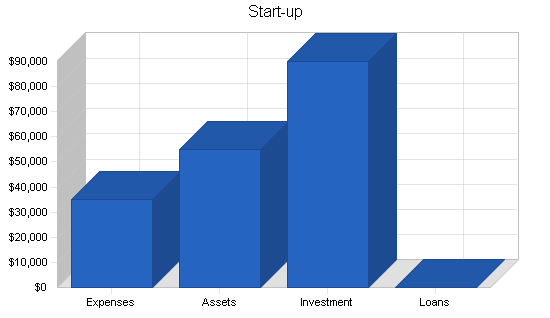
| Start-up Funding | |
| Start-up Expenses to Fund | $35,000 |
| Start-up Assets to Fund | $55,000 |
| Total Funding Required | $90,000 |
| Assets | |
| Non-cash Assets from Start-up | $25,000 |
| Cash Requirements from Start-up | $50,000 |
| Additional Cash Raised | $0 |
| Cash Balance on Starting Date | $50,000 |
| Total Assets | $75,000 |
| Liabilities and Capital | |
| Liabilities | |
| Current Borrowing | $0 |
| Long-term Liabilities | $0 |
| Accounts Payable (Outstanding Bills) | $0 |
| Other Current Liabilities (interest-free) | $0 |
| Total Liabilities | $0 |
| Capital | |
| Planned Investment | |
| Owner 1 | $55,000 |
| Owner 2 | $35,000 |
| Other | $0 |
| Additional Investment Requirement | $0 |
| Total Planned Investment | $90,000 |
| Loss at Start-up (Start-up Expenses) | ($35,000) |
| Total Capital | $55,000 |
| Total Capital and Liabilities | $55,000 |
| Total Funding | $90,000 |
| Start-up | |
| Requirements | |
| Start-up Expenses | |
| Legal | $2,000 |
| Stationery etc. | $100 |
| Brochures | $500 |
| Consultants | $2,000 |
| Insurance | $10,000 |
| Rent (Deposit and 1st Month) | $3,000 |
| Work Equipment | $6,000 |
| Website Development | $10,000 |
| Other | $1,400 |
| Total Start-up Expenses | $35,000 |
| Start-up Assets | |
| Cash Required | $50,000 |
| Other Current Assets | $5,000 |
| Long-term Assets | $0 |
| Total Assets | $55,000 |
| Total Requirements | $90,000 |
2.2 Company Ownership
The company ownership will be shared by the Chairman and Chief Executive Officer in the following percentage amounts:
Chairman = 60%
Chief Executive Officer = 40%
Both owners are veterans in the building industry, each with over 25 years experience.
Products and Services
TBC will sell its services to clients in the area of commercial construction and renovation. The company’s staff will design specialized construction drawings that outline the schedule, work sequence and the materials needed for building and renovation construction projects. Owners, developers and general contractors will realize substantial savings in labor and material costs by using TBC’s customized performance methods. TBC’s methods will offer complete adaptability at cost-effective prices. The drawings that the company will furnish to the contractor will specify the order of assembly and erection, including the location of the strongbacks and joists, the location and actual loading of the ties, location of accessories and advise clients of the maximum allowable rate of concrete placement.
A longer-term service will be commercial building rental management. This will include the purchase of commercial building sites or existing buildings that need renovation, coordinating the construction/renovation, then managing the rental of the property. The company will also be looking for existing property owners whose properties need renovation to update and increase its income potential, with TBC eventually taking over the management of these properties on behalf of the owner.
To enter the market with minimum overhead costs, TBC plans to utilize in the first year of operation mainly sub-contractors and independent experts for its building and renovation projects.
Accident prevention will be the cornerstone of TBC’s safety commitment. The company will strive to eliminate foreseeable hazards which could result in personal injury or illness; at TBC, health and safety will not be compromised.
Market Analysis Summary how to do a market analysis for your business plan.">
There were about 792,000 construction companies in the United States in 2002: 237,000 were building construction contractors; 60,000 were heavy and civil engineering construction or highway contractors; and 496,000 were specialty trade contractors. Most of these establishments tend to be small, the majority employing fewer than 10 workers. About 4 out of 5 workers are employed by small contractors.
Construction offers more opportunities than most other industries for individuals who want to own and run their own business. The 1.6 million self-employed and unpaid family workers in 2002 performed work directly for property owners or acted as contractors on small jobs, such as additions, remodeling, and maintenance projects. The rate of self-employment varies greatly by individual occupation in the construction trades.

One longer-term field of operation for the company will be the selling of building material and components to contractors. By slowly establishing itself as a first-rate material provider, the company expects to broaden and strengthen its stance in the local building industry. Initially it will focus on purchasing supplies for its own construction and renovation projects, then use those completed projects as marketing examples to showcase the quality of materials used and the customized approach used to design and construct them.
The company plans to develop marketing alliances with industry leaders and pursue new sales of its services to commercial builders. The market strategy is to capitalize on the company’s future alliances by securing city, county, and state government contracts.
TBC also plans to use a direct sales force, relationship selling, and sub-contractors to reach its markets. These channels are most appropriate because of time to market, reduced capital requirements, and fast access to established distribution channels.
4.1 Market Segmentation
The overall Construction Industry was segmented in 2002 as follows (employment in thousands):
| Industry | Employment | Percent |
| Total, all industries | 6,731.7 | 100.0 |
| Construction of Buildings | 1,583.8 | 23.5 |
| Residential building | 807.4 | 12.0 |
| Nonresidential building construction | 776.4 | 11.5 |
| Special trade contractors | 4,217.9 | 62.7 |
| Building equipment contractors | 1,842.5 | 27.4 |
| Foundation, structure, & building exterior contractors | 915.4 | 13.6 |
| Building finishing contractors | 879.5 | 13.1 |
| Other specialty trade contractors | 580.5 | 8.6 |
| Highway, street, and bridge construction | 344.4 | 5.1 |
| Land subdivision | 86.1 | 1.3 |
| Other heavy and civil engineering construction | 119.0 | 1.8 |
| Special trade contractors | 4,217.9 | 62.7 |
| Building equipment contractors | 1,842.5 | 27.4 |
| Foundation, structure, & building exterior contractors | 915.4 | 13.6 |
| Building finishing contractors | 879.5 | 13.1 |
| Other specialty trade contractors | 580.5 | 8.6 |
Source: U.S. Department of Labor, Bureau of Labor Statistics (March 9, 2004)
For the purpose of this paper we shall segment our initial targeted market as follows:
- Office Building Construction
- Building Facilities Renovation
- General Construction
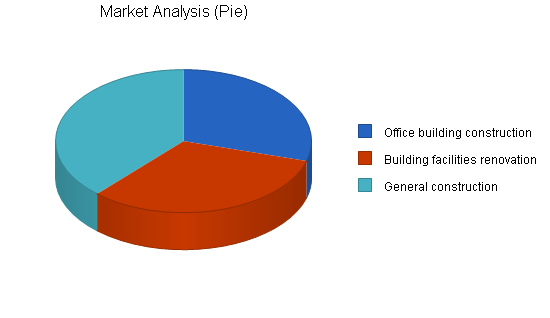
| Market Analysis | |||||||
| Year 1 | Year 2 | Year 3 | Year 4 | Year 5 | |||
| Potential Customers | Growth | CAGR | |||||
| Office building construction | 6% | 2,517 | 4,027 | 4,268 | 4,524 | 4,795 | 17.48% |
| Building facilities renovation | 3% | 2,750 | 2,833 | 2,917 | 3,005 | 3,095 | 3.00% |
| General construction | 3% | 3,264 | 3,362 | 3,462 | 3,567 | 3,674 | 3.00% |
| Total | 7.90% | 8,531 | 10,222 | 10,647 | 11,096 | 11,564 | 7.90% |
4.2 Service Business Analysis
The construction industry is divided into three major segments. Construction of buildings contractors, or general contractors , who build residential, industrial, commercial, and other buildings. Heavy and civil engineering construction contractors who build sewers, roads, highways, bridges, tunnels, and other projects. Specialty trade contractors who are engaged in specialized activities such as carpentry, painting, plumbing, and electrical work.
Construction usually is done or coordinated by general contractors, who specialize in one type of construction, such as residential or commercial building. They take full responsibility for the complete job, except for specified portions of the work that may be omitted from the general contract. Although general contractors may do a portion of the work with their own crews, they often sub-contract most of the work to heavy construction or specialty trade contractors.
Specialty trade contractors usually do the work of only one trade, such as painting, carpentry, or electrical work, or of two or more closely-related trades, such as plumbing and heating. Beyond fitting their work to that of the other trades, specialty trade contractors have no responsibility for the structure as a whole. They obtain orders for their work from general contractors, architects, or property owners. Repair work is almost always done on direct order from owners, occupants, architects, or rental agents.
Twin Brothers Construction will concentrate its activity in the following areas:
- Commercial Building Construction
- Commercial Building Renovation
- Buildings Management and Rental
- Building Materials Supplies
Strategy and Implementation Summary
TBC plans to use a direct sales force, relationship selling, and sub-contractors to reach its target markets. These channels are most appropriate because of time to market, reduced capital requirements, and fast access to established distribution channels. The owners of TBC want to emphasize to their potential customers that they are more than general contractors, they are complete construction coordinators.
TBC plans to advertise in magazines, newspapers, and radio. Initially a website with information on the company owners, their construction background, and contact information will be available online. References to the website will be mentioned in all other forms of advertising. Channels used to reach market segments include: sales associates, the Internet and direct mail.
In addition, The table and chart below outline the company’s sales forecast for FY2005-2007. In our sales forecasts, the cost of sales includes only direct labor costs.
5.1 Competitive Edge
The company plans to become a leading provider of construction services in the local area. To achieve this, TBC will invest in many ways that will pay off in competitive advantages for its customers, for example:
- Pre-job conferencing upon request
- Assist in technical or conceptual design
- Assist in supervision when other contractors are employed
- Organize project supervision facilities and staff
- Organize delivery of purchased materials
- Furnishing after-market products
5.2 Marketing Strategy
Our marketing strategy is the key to our success:
- Emphasize our name and unique services through advertising, including a Web page of contact information. An amount of $10,000 for the design of the website has been included in the Start-up expenses with ongoing maintenance costs estimated monthly.
- Focus on commercial building and renovation projects as our initial and primary target markets.
- Use completed projects to showcase our customized construction project management to prospective clients.
5.3 Sales Strategy
Sales success requires planning. The company will formulate its sales strategy and tactics to achieve sales success by following these steps:
Step 1 – Analyzing The Company’s Potential: Step through a structured process to help us develop a sales strategy.
Step 2 – Strategize Around Strengths: The description of sales activity will be analyzed to produce a report on factors impacting sales potential and ways to strengthen this potential.
Step 3 – Develop Tactics: Receive guidance to develop a comprehensive tactical plan to achieve success.
Step 4 – Measure Our Past Success: Develop key measurements that mark the progress of financial estimates that guide our growth.
Final Step – Employ An Action Plan for Success: Provide sales force with a tactical plan that is aligned with management’s strategic objectives.
5.3.1 Sales Forecast
The company will start its operation in the first year by focusing on two areas:
- Direct construction work
- Renovation of existing buildings
Starting later in the second year and continuing into the third year the following areas of operation will be added:
- Renting of Industrial Spaces
- Sale of components and other building materials and components
The following table details the forecasts.

| Sales Forecast | |||
| Year 1 | Year 2 | Year 3 | |
| Sales | |||
| Direct Construction Projects | $135,000 | $175,000 | $218,750 |
| Building Renovations | $123,000 | $153,750 | $192,188 |
| Building Rentals | $0 | $75,000 | $200,000 |
| Sale of Components and Goods | $0 | $75,000 | $150,000 |
| Other | $9,000 | $10,000 | $12,000 |
| Total Sales | $267,000 | $488,750 | $772,938 |
| Direct Cost of Sales | Year 1 | Year 2 | Year 3 |
| All construction work | $54,000 | $70,000 | $87,500 |
| Renovations | $49,200 | $61,500 | $76,875 |
| Rentals | $0 | $15,000 | $40,000 |
| Sale of Components and Goods | $0 | $30,000 | $60,000 |
| Other | $9,000 | $1,000 | $1,200 |
| Subtotal Direct Cost of Sales | $112,200 | $177,500 | $265,575 |
5.4 Milestones
The milestones table describes the steps required for the beginning of operations. Steps might take longer than estimated, however the owners and the staff will do their utmost to adhere to this timetable.

| Milestones | |||||
| Milestone | Start Date | End Date | Budget | Manager | Department |
| Establishing Permits | 1/1/2005 | 1/15/2005 | $500 | Chairman | Department |
| Establishing office | 1/15/2005 | 1/20/2005 | $500 | CEO | Department |
| Preparing Web Site | 1/15/2005 | 2/15/2005 | $1,000 | Consultant | Department |
| Purchasing work equipment | 1/15/2005 | 2/25/2005 | $6,000 | CEO | Department |
| Hiring staff | 2/1/2005 | 3/1/2005 | $0 | Chairman@CEO | Department |
| Purcase Initial Inventory | 2/15/2005 | 3/25/2005 | $20,000 | Chairman&CEO | Department |
| Receive Stock | 3/1/2005 | 4/1/2005 | $500 | Staff | Department |
| Start Operation | 4/1/2005 | 4/30/2005 | $0 | Everybody | Department |
| Totals | $28,500 | ||||
Web Plan Summary
The cost to create a website has been included in start-up costs, with website maintenance costs included in our ongoing expenses. The initial website will have basic contact information and background about the company owners. Later, it will show information about current projects as well as completed projects as examples of what the company can do. Once the building materials portion of the business is well established, the website will expand to include an online store. At this point in the business plan, there are no estimates for the cost of this expansion and it will need to be researched and planned for more thoroughly at a later point.
It will take time before the initial cost outlay for the website will pay for itself in potential customers, but once established, it will provide a cost-effective way to communicate to new and existing customers.
We will mention our website address as part of our other advertising media.
6.1 Website Marketing Strategy
We hope to be able to secure links to our website from the local city and chamber of commerce websites as well as local construction-related websites that we can affiliate with.
6.2 Development Requirements
We will contract with a Website developer to initially design the look and information provided on the website. Our initial cost for this design also includes the first six months of website maintenance by the website developer. In October, we plan to hire a technician with experience in website maintenance to troubleshoot and maintain the Website internally.
Once the business has progressed, we will either increase this person’s hours from temporary to a full-time position, or we will hire a second temporary technical position to assist in the re-design and expansion of the website. Our long-term goal is to have an online store for the sale of building materials and components.
Management Summary management summary will include information about who's on your team and why they're the right people for the job, as well as your future hiring plans.">
The company’s management philosophy will be based on responsibility and mutual respect. Twin Brothers Construction will maintain an environment and structure that will encourage productivity and respect for customers and fellow employees.
TBC will be responsible to its employees and sub-contractors, the men and women who will work with the company throughout the state. At TBC everyone will be considered as an individual and the company will respect their dignity and recognize their merit. Employees will be encouraged to have a sense of security and pride in their jobs. Additionally, employees will be free to make suggestions and complaints. The company will afford equal opportunity for employment, development, and advancement for those qualified.
TBC employees will be committed to:
- Providing a safe work environment to protect employees, the employees of customers and sub-contractors, and the public.
- Supplying safe products for customers.
- Continuously improving the company’s safety program to reduce the risk of accidents and occupational illness in a changing work environment.
- Encouraging employees to participate in accident prevention programs and take personal responsibility for their own and their co-workers’ health and safety.
- Regulatory compliance and contribution to high safety standards for our industry.
- Monitoring workplaces, enforcing safe work practices, and communicating the company’s safety performance to employees and other stakeholders.
- Making safety a value-added service that the company provides to its customers.
The company is planning to expand its personnel to add more job superintendents as soon as the number of projects increases. These superintendents will have the following duties:
Direct supervision of all work at the job sites:
- Quality Control
- Scheduling sub-contractors and material deliveries
- Verifying and insuring that all work is done in accordance with plans
- Insuring that all work is performed in accordance with all OSHA guidelines
7.1 Personnel Plan
The personnel plan is based on the two owners to guide and oversee the operations that will be managed by themselves. Having been in business for over 25 years, they have agreed to draw very low salaries for the first two years to offset some of the initial expenses in starting the business.
For the first year, the company will hire temporary and part-time employees and sub-contract with consultants and construction professionals to perform the variety of tasks needed. Also, our contracted construction personnel expenses are reflected in our Sales Forecast as cost of sales, not part of our personnel table, since they will not be regular employees of the business.
| Personnel Plan | |||
| Year 1 | Year 2 | Year 3 | |
| Chairman (Principal Owner) | $18,000 | $25,000 | $60,000 |
| CEO (Secondary Owner) | $18,000 | $25,000 | $60,000 |
| Office Clerk (Temporary Hire) | $17,250 | $32,000 | $32,000 |
| Foreman (Temporary Hire) | $21,600 | $42,000 | $42,000 |
| Technical Employee (Part-time) | $9,000 | $25,000 | $25,000 |
| Total People | 5 | 7 | 8 |
| Total Payroll | $83,850 | $149,000 | $219,000 |
TBC will be committed to conducting business in a manner that protects the health and safety of all employees, customers, and persons living in the community where it operates. To accomplish this, the company will ensure that it complies with current Health Administration and Occupational Health and Safety laws and will maintain its operations, procedures, technologies, and policies accordingly.
Each employee will have the responsibility to fully comply with established safety rules and to perform work in such a manner as to prevent injuries to themselves and others. TBC will be very concerned about job-site safety and plans to set up a comprehensive safety program.
Financial Plan investor-ready personnel plan .">
The brothers have long-term experience in the local construction industry. They are willing to invest heavily in this new company and their accumulated experience will insure success for the new venture. It will be important to watch closely the salaries and regular expenses to assure that the company will not suffer from lack of sufficient cash to fund its operations.
- We assume a conservative entrance and steady growth in the market.
- We assume a slow financial progress based on initially conservative sales against highest expenses.
- We assume there will not be an economic crash that would greatly hinder our target market’s access to their personal luxury finds.
The following sections describe the financials for TBC:
8.1 Projected Profit and Loss
Twin Brothers Construction is in the early stage of development, thus initial projections have only been made based on the sales projections and efficient cost control measures in place. Our first year monthly net profits will become positive by October, but we will still close the year with negative profit. This is primarily because of personnel expenses, which include salaries and the cost of sales for sub-contractors.

| Pro Forma Profit and Loss | |||
| Year 1 | Year 2 | Year 3 | |
| Sales | $267,000 | $488,750 | $772,938 |
| Direct Cost of Sales | $112,200 | $177,500 | $265,575 |
| Other | $0 | $0 | $0 |
| Total Cost of Sales | $112,200 | $177,500 | $265,575 |
| Gross Margin | $154,800 | $311,250 | $507,363 |
| Gross Margin % | 57.98% | 63.68% | 65.64% |
| Expenses | |||
| Payroll | $83,850 | $149,000 | $219,000 |
| Sales and Marketing and Other Expenses | $7,500 | $10,000 | $0 |
| Depreciation | $0 | $0 | $0 |
| Gasoline and oil | $3,600 | $3,750 | $4,800 |
| Telephone | $1,500 | $2,400 | $3,500 |
| Utilities | $4,800 | $11,250 | $10,282 |
| Insurance | $9,000 | $8,226 | $24,000 |
| Rent | $7,478 | $20,000 | $25,000 |
| Payroll Taxes | $6,522 | $0 | $0 |
| Website Maintenance & Support | $4,200 | $6,000 | $9,375 |
| Consultants | $6,000 | $7,500 | $9,000 |
| Advertising | $6,000 | $1,980 | $3,500 |
| Misc. Other Expenses | $1,800 | $2,500 | $267,127 |
| Total Operating Expenses | $142,250 | $222,606 | $575,584 |
| Profit Before Interest and Taxes | $12,550 | $88,644 | ($68,222) |
| EBITDA | $12,550 | $88,644 | ($68,222) |
| Interest Expense | $625 | $7,500 | $11,250 |
| Taxes Incurred | $3,578 | $24,343 | $0 |
| Net Profit | $8,348 | $56,801 | ($79,472) |
| Net Profit/Sales | 3.13% | 11.62% | -10.28% |
8.2 Break-even Analysis
During the first year of operations, the break-even monthly sales volume is estimated as shown below. Our average percent variable reflects our cost of sales which covers contracted construction payroll costs.

| Break-even Analysis | |
| Monthly Revenue Break-even | $20,446 |
| Assumptions: | |
| Average Percent Variable Cost | 42% |
| Estimated Monthly Fixed Cost | $11,854 |
8.3 Projected Cash Flow

| Pro Forma Cash Flow | |||
| Year 1 | Year 2 | Year 3 | |
| Cash Received | |||
| Cash from Operations | |||
| Cash Sales | $267,000 | $488,750 | $772,938 |
| Subtotal Cash from Operations | $267,000 | $488,750 | $772,938 |
| Additional Cash Received | |||
| Sales Tax, VAT, HST/GST Received | $0 | $0 | $0 |
| New Current Borrowing | $0 | $0 | $0 |
| New Other Liabilities (interest-free) | $0 | $0 | $0 |
| New Long-term Liabilities | $75,000 | $0 | $75,000 |
| Sales of Other Current Assets | $0 | $0 | $0 |
| Sales of Long-term Assets | $0 | $0 | $0 |
| New Investment Received | $0 | $0 | $0 |
| Subtotal Cash Received | $342,000 | $488,750 | $847,938 |
| Expenditures | Year 1 | Year 2 | Year 3 |
| Expenditures from Operations | |||
| Cash Spending | $83,850 | $149,000 | $219,000 |
| Bill Payments | $152,974 | $281,521 | $604,604 |
| Subtotal Spent on Operations | $236,824 | $430,521 | $823,604 |
| Additional Cash Spent | |||
| Sales Tax, VAT, HST/GST Paid Out | $0 | $0 | $0 |
| Principal Repayment of Current Borrowing | $0 | $0 | $0 |
| Other Liabilities Principal Repayment | $0 | $0 | $0 |
| Long-term Liabilities Principal Repayment | $0 | $0 | $0 |
| Purchase Other Current Assets | $0 | $0 | $0 |
| Purchase Long-term Assets | $100,000 | $0 | $100,000 |
| Dividends | $0 | $0 | $0 |
| Subtotal Cash Spent | $336,824 | $430,521 | $923,604 |
| Net Cash Flow | $5,176 | $58,229 | ($75,667) |
| Cash Balance | $55,176 | $113,405 | $37,738 |
8.4 Projected Balance Sheet
The following table outlines our Balance Sheet.
| Pro Forma Balance Sheet | |||
| Year 1 | Year 2 | Year 3 | |
| Assets | |||
| Current Assets | |||
| Cash | $55,176 | $113,405 | $37,738 |
| Other Current Assets | $5,000 | $5,000 | $5,000 |
| Total Current Assets | $60,176 | $118,405 | $42,738 |
| Long-term Assets | |||
| Long-term Assets | $100,000 | $100,000 | $200,000 |
| Accumulated Depreciation | $0 | $0 | $0 |
| Total Long-term Assets | $100,000 | $100,000 | $200,000 |
| Total Assets | $160,176 | $218,405 | $242,738 |
| Liabilities and Capital | Year 1 | Year 2 | Year 3 |
| Current Liabilities | |||
| Accounts Payable | $21,828 | $23,256 | $52,061 |
| Current Borrowing | $0 | $0 | $0 |
| Other Current Liabilities | $0 | $0 | $0 |
| Subtotal Current Liabilities | $21,828 | $23,256 | $52,061 |
| Long-term Liabilities | $75,000 | $75,000 | $150,000 |
| Total Liabilities | $96,828 | $98,256 | $202,061 |
| Paid-in Capital | $90,000 | $90,000 | $90,000 |
| Retained Earnings | ($35,000) | ($26,652) | $30,149 |
| Earnings | $8,348 | $56,801 | ($79,472) |
| Total Capital | $63,348 | $120,149 | $40,677 |
| Total Liabilities and Capital | $160,176 | $218,405 | $242,738 |
| Net Worth | $63,348 | $120,149 | $40,677 |
8.5 Business Ratios
The following Ratios table includes industry profile comparison ratios for Commercial and Office Building Contractors (Standard Industry Code #1542).
| Ratio Analysis | ||||
| Year 1 | Year 2 | Year 3 | Industry Profile | |
| Sales Growth | 0.00% | 83.05% | 58.15% | -3.57% |
| Percent of Total Assets | ||||
| Other Current Assets | 3.12% | 2.29% | 2.06% | 39.87% |
| Total Current Assets | 37.57% | 54.21% | 17.61% | 91.45% |
| Long-term Assets | 62.43% | 45.79% | 82.39% | 8.55% |
| Total Assets | 100.00% | 100.00% | 100.00% | 100.00% |
| Current Liabilities | 13.63% | 10.65% | 21.45% | 34.87% |
| Long-term Liabilities | 46.82% | 34.34% | 61.79% | 15.42% |
| Total Liabilities | 60.45% | 44.99% | 83.24% | 50.29% |
| Net Worth | 39.55% | 55.01% | 16.76% | 49.71% |
| Percent of Sales | ||||
| Sales | 100.00% | 100.00% | 100.00% | 100.00% |
| Gross Margin | 57.98% | 63.68% | 65.64% | 17.83% |
| Selling, General & Administrative Expenses | 50.39% | 31.80% | 27.73% | 7.07% |
| Advertising Expenses | 4.95% | 6.32% | 5.54% | 0.25% |
| Profit Before Interest and Taxes | 4.70% | 18.14% | -8.83% | 1.85% |
| Main Ratios | ||||
| Current | 2.76 | 5.09 | 0.82 | 2.34 |
| Quick | 2.76 | 5.09 | 0.82 | 1.12 |
| Total Debt to Total Assets | 60.45% | 44.99% | 83.24% | 57.63% |
| Pre-tax Return on Net Worth | 18.83% | 67.54% | -195.37% | 4.01% |
| Pre-tax Return on Assets | 7.45% | 37.15% | -32.74% | 9.46% |
| Additional Ratios | Year 1 | Year 2 | Year 3 | |
| Net Profit Margin | 3.13% | 11.62% | -10.28% | n.a |
| Return on Equity | 13.18% | 47.28% | -195.37% | n.a |
| Activity Ratios | ||||
| Accounts Payable Turnover | 8.01 | 12.17 | 12.17 | n.a |
| Payment Days | 27 | 29 | 22 | n.a |
| Total Asset Turnover | 1.67 | 2.24 | 3.18 | n.a |
| Debt Ratios | ||||
| Debt to Net Worth | 1.53 | 0.82 | 4.97 | n.a |
| Current Liab. to Liab. | 0.23 | 0.24 | 0.26 | n.a |
| Liquidity Ratios | ||||
| Net Working Capital | $38,348 | $95,149 | ($9,323) | n.a |
| Interest Coverage | 20.08 | 11.82 | -6.06 | n.a |
| Additional Ratios | ||||
| Assets to Sales | 0.60 | 0.45 | 0.31 | n.a |
| Current Debt/Total Assets | 14% | 11% | 21% | n.a |
| Acid Test | 2.76 | 5.09 | 0.82 | n.a |
| Sales/Net Worth | 4.21 | 4.07 | 19.00 | n.a |
| Dividend Payout | 0.00 | 0.00 | 0.00 | n.a |
| Sales Forecast | |||||||||||||
| Month 1 | Month 2 | Month 3 | Month 4 | Month 5 | Month 6 | Month 7 | Month 8 | Month 9 | Month 10 | Month 11 | Month 12 | ||
| Sales | |||||||||||||
| Direct Construction Projects | 0% | $0 | $0 | $0 | $10,000 | $10,000 | $10,000 | $15,000 | $15,000 | $15,000 | $20,000 | $20,000 | $20,000 |
| Building Renovations | 0% | $7,500 | $7,500 | $8,000 | $8,000 | $9,000 | $9,000 | $10,000 | $10,000 | $12,000 | $12,000 | $15,000 | $15,000 |
| Building Rentals | 0% | $0 | $0 | $0 | $0 | $0 | $0 | $0 | $0 | $0 | $0 | $0 | $0 |
| Sale of Components and Goods | 0% | $0 | $0 | $0 | $0 | $0 | $0 | $0 | $0 | $0 | $0 | $0 | $0 |
| Other | 0% | $0 | $0 | $0 | $1,000 | $1,000 | $1,000 | $1,000 | $1,000 | $1,000 | $1,000 | $1,000 | $1,000 |
| Total Sales | $7,500 | $7,500 | $8,000 | $19,000 | $20,000 | $20,000 | $26,000 | $26,000 | $28,000 | $33,000 | $36,000 | $36,000 | |
| Direct Cost of Sales | Month 1 | Month 2 | Month 3 | Month 4 | Month 5 | Month 6 | Month 7 | Month 8 | Month 9 | Month 10 | Month 11 | Month 12 | |
| All construction work | 40% | $0 | $0 | $0 | $4,000 | $4,000 | $4,000 | $6,000 | $6,000 | $6,000 | $8,000 | $8,000 | $8,000 |
| Renovations | 40% | $3,000 | $3,000 | $3,200 | $3,200 | $3,600 | $3,600 | $4,000 | $4,000 | $4,800 | $4,800 | $6,000 | $6,000 |
| Rentals | 20% | $0 | $0 | $0 | $0 | $0 | $0 | $0 | $0 | $0 | $0 | $0 | $0 |
| Sale of Components and Goods | 20% | $0 | $0 | $0 | $0 | $0 | $0 | $0 | $0 | $0 | $0 | $0 | $0 |
| Other | 10% | $0 | $0 | $0 | $1,000 | $1,000 | $1,000 | $1,000 | $1,000 | $1,000 | $1,000 | $1,000 | $1,000 |
| Subtotal Direct Cost of Sales | $3,000 | $3,000 | $3,200 | $8,200 | $8,600 | $8,600 | $11,000 | $11,000 | $11,800 | $13,800 | $15,000 | $15,000 | |
| Personnel Plan | |||||||||||||
| Month 1 | Month 2 | Month 3 | Month 4 | Month 5 | Month 6 | Month 7 | Month 8 | Month 9 | Month 10 | Month 11 | Month 12 | ||
| Chairman (Principal Owner) | 0% | $1,500 | $1,500 | $1,500 | $1,500 | $1,500 | $1,500 | $1,500 | $1,500 | $1,500 | $1,500 | $1,500 | $1,500 |
| CEO (Secondary Owner) | 0% | $1,500 | $1,500 | $1,500 | $1,500 | $1,500 | $1,500 | $1,500 | $1,500 | $1,500 | $1,500 | $1,500 | $1,500 |
| Office Clerk (Temporary Hire) | 0% | $1,250 | $1,250 | $1,250 | $1,250 | $1,250 | $1,250 | $1,500 | $1,500 | $1,500 | $1,750 | $1,750 | $1,750 |
| Foreman (Temporary Hire) | 0% | $0 | $0 | $0 | $2,400 | $2,400 | $2,400 | $2,400 | $2,400 | $2,400 | $2,400 | $2,400 | $2,400 |
| Technical Employee (Part-time) | 0% | $0 | $0 | $0 | $0 | $0 | $0 | $1,500 | $1,500 | $1,500 | $1,500 | $1,500 | $1,500 |
| Total People | 3 | 3 | 3 | 4 | 4 | 4 | 5 | 5 | 5 | 5 | 5 | 5 | |
| Total Payroll | $4,250 | $4,250 | $4,250 | $6,650 | $6,650 | $6,650 | $8,400 | $8,400 | $8,400 | $8,650 | $8,650 | $8,650 | |
| General Assumptions | |||||||||||||
| Month 1 | Month 2 | Month 3 | Month 4 | Month 5 | Month 6 | Month 7 | Month 8 | Month 9 | Month 10 | Month 11 | Month 12 | ||
| Plan Month | 1 | 2 | 3 | 4 | 5 | 6 | 7 | 8 | 9 | 10 | 11 | 12 | |
| Current Interest Rate | 10.00% | 10.00% | 10.00% | 10.00% | 10.00% | 10.00% | 10.00% | 10.00% | 10.00% | 10.00% | 10.00% | 10.00% | |
| Long-term Interest Rate | 10.00% | 10.00% | 10.00% | 10.00% | 10.00% | 10.00% | 10.00% | 10.00% | 10.00% | 10.00% | 10.00% | 10.00% | |
| Tax Rate | 30.00% | 30.00% | 30.00% | 30.00% | 30.00% | 30.00% | 30.00% | 30.00% | 30.00% | 30.00% | 30.00% | 30.00% | |
| Sales on Credit | 0 | 0 | 0 | 0 | 0 | 0 | 0 | 0 | 0 | 0 | 0 | 0 | |
| Other | 0 | 0 | 0 | 0 | 0 | 0 | 0 | 0 | 0 | 0 | 0 | 0 | |
| Pro Forma Profit and Loss | |||||||||||||
| Month 1 | Month 2 | Month 3 | Month 4 | Month 5 | Month 6 | Month 7 | Month 8 | Month 9 | Month 10 | Month 11 | Month 12 | ||
| Sales | $7,500 | $7,500 | $8,000 | $19,000 | $20,000 | $20,000 | $26,000 | $26,000 | $28,000 | $33,000 | $36,000 | $36,000 | |
| Direct Cost of Sales | $3,000 | $3,000 | $3,200 | $8,200 | $8,600 | $8,600 | $11,000 | $11,000 | $11,800 | $13,800 | $15,000 | $15,000 | |
| Other | $0 | $0 | $0 | $0 | $0 | $0 | $0 | $0 | $0 | $0 | $0 | $0 | |
| Total Cost of Sales | $3,000 | $3,000 | $3,200 | $8,200 | $8,600 | $8,600 | $11,000 | $11,000 | $11,800 | $13,800 | $15,000 | $15,000 | |
| Gross Margin | $4,500 | $4,500 | $4,800 | $10,800 | $11,400 | $11,400 | $15,000 | $15,000 | $16,200 | $19,200 | $21,000 | $21,000 | |
| Gross Margin % | 60.00% | 60.00% | 60.00% | 56.84% | 57.00% | 57.00% | 57.69% | 57.69% | 57.86% | 58.18% | 58.33% | 58.33% | |
| Expenses | |||||||||||||
| Payroll | $4,250 | $4,250 | $4,250 | $6,650 | $6,650 | $6,650 | $8,400 | $8,400 | $8,400 | $8,650 | $8,650 | $8,650 | |
| Sales and Marketing and Other Expenses | $500 | $500 | $500 | $500 | $500 | $500 | $750 | $750 | $750 | $750 | $750 | $750 | |
| Depreciation | $0 | $0 | $0 | $0 | $0 | $0 | $0 | $0 | $0 | $0 | $0 | $0 | |
| Gasoline and oil | $300 | $300 | $300 | $300 | $300 | $300 | $300 | $300 | $300 | $300 | $300 | $300 | |
| Telephone | $125 | $125 | $125 | $125 | $125 | $125 | $125 | $125 | $125 | $125 | $125 | $125 | |
| Utilities | $400 | $400 | $400 | $400 | $400 | $400 | $400 | $400 | $400 | $400 | $400 | $400 | |
| Insurance | $750 | $750 | $750 | $750 | $750 | $750 | $750 | $750 | $750 | $750 | $750 | $750 | |
| Rent | $1,500 | $543 | $543 | $543 | $543 | $543 | $543 | $543 | $543 | $543 | $543 | $543 | |
| Payroll Taxes | 15% | $543 | $543 | $543 | $543 | $543 | $543 | $543 | $543 | $543 | $543 | $543 | $544 |
| Website Maintenance & Support | $350 | $350 | $350 | $350 | $350 | $350 | $350 | $350 | $350 | $350 | $350 | $350 | |
| Consultants | $500 | $500 | $500 | $500 | $500 | $500 | $500 | $500 | $500 | $500 | $500 | $500 | |
| Advertising | 15% | $500 | $500 | $500 | $500 | $500 | $500 | $500 | $500 | $500 | $500 | $500 | $500 |
| Misc. Other Expenses | $150 | $150 | $150 | $150 | $150 | $150 | $150 | $150 | $150 | $150 | $150 | $150 | |
| Total Operating Expenses | $9,868 | $8,912 | $8,912 | $11,312 | $11,312 | $11,312 | $13,312 | $13,312 | $13,312 | $13,562 | $13,562 | $13,562 | |
| Profit Before Interest and Taxes | ($5,368) | ($4,412) | ($4,112) | ($512) | $88 | $88 | $1,688 | $1,688 | $2,888 | $5,638 | $7,438 | $7,438 | |
| EBITDA | ($5,368) | ($4,412) | ($4,112) | ($512) | $88 | $88 | $1,688 | $1,688 | $2,888 | $5,638 | $7,438 | $7,438 | |
| Interest Expense | $0 | $0 | $0 | $0 | $0 | $0 | $0 | $0 | $0 | $0 | $0 | $625 | |
| Taxes Incurred | ($1,611) | ($1,324) | ($1,234) | ($154) | $26 | $26 | $506 | $506 | $866 | $1,691 | $2,231 | $2,044 | |
| Net Profit | ($3,758) | ($3,088) | ($2,878) | ($358) | $62 | $62 | $1,182 | $1,182 | $2,022 | $3,947 | $5,207 | $4,769 | |
| Net Profit/Sales | -50.11% | -41.18% | -35.98% | -1.89% | 0.31% | 0.31% | 4.54% | 4.54% | 7.22% | 11.96% | 14.46% | 13.25% | |
| Pro Forma Cash Flow | |||||||||||||
| Month 1 | Month 2 | Month 3 | Month 4 | Month 5 | Month 6 | Month 7 | Month 8 | Month 9 | Month 10 | Month 11 | Month 12 | ||
| Cash Received | |||||||||||||
| Cash from Operations | |||||||||||||
| Cash Sales | $7,500 | $7,500 | $8,000 | $19,000 | $20,000 | $20,000 | $26,000 | $26,000 | $28,000 | $33,000 | $36,000 | $36,000 | |
| Subtotal Cash from Operations | $7,500 | $7,500 | $8,000 | $19,000 | $20,000 | $20,000 | $26,000 | $26,000 | $28,000 | $33,000 | $36,000 | $36,000 | |
| Additional Cash Received | |||||||||||||
| Sales Tax, VAT, HST/GST Received | 0.00% | $0 | $0 | $0 | $0 | $0 | $0 | $0 | $0 | $0 | $0 | $0 | $0 |
| New Current Borrowing | $0 | $0 | $0 | $0 | $0 | $0 | $0 | $0 | $0 | $0 | $0 | $0 | |
| New Other Liabilities (interest-free) | $0 | $0 | $0 | $0 | $0 | $0 | $0 | $0 | $0 | $0 | $0 | $0 | |
| New Long-term Liabilities | $0 | $0 | $0 | $0 | $0 | $0 | $0 | $0 | $0 | $0 | $0 | $75,000 | |
| Sales of Other Current Assets | $0 | $0 | $0 | $0 | $0 | $0 | $0 | $0 | $0 | $0 | $0 | $0 | |
| Sales of Long-term Assets | $0 | $0 | $0 | $0 | $0 | $0 | $0 | $0 | $0 | $0 | $0 | $0 | |
| New Investment Received | $0 | $0 | $0 | $0 | $0 | $0 | $0 | $0 | $0 | $0 | $0 | $0 | |
| Subtotal Cash Received | $7,500 | $7,500 | $8,000 | $19,000 | $20,000 | $20,000 | $26,000 | $26,000 | $28,000 | $33,000 | $36,000 | $111,000 | |
| Expenditures | Month 1 | Month 2 | Month 3 | Month 4 | Month 5 | Month 6 | Month 7 | Month 8 | Month 9 | Month 10 | Month 11 | Month 12 | |
| Expenditures from Operations | |||||||||||||
| Cash Spending | $4,250 | $4,250 | $4,250 | $6,650 | $6,650 | $6,650 | $8,400 | $8,400 | $8,400 | $8,650 | $8,650 | $8,650 | |
| Bill Payments | $234 | $6,986 | $6,348 | $6,831 | $12,728 | $13,288 | $13,393 | $16,418 | $16,457 | $17,672 | $20,461 | $22,158 | |
| Subtotal Spent on Operations | $4,484 | $11,236 | $10,598 | $13,481 | $19,378 | $19,938 | $21,793 | $24,818 | $24,857 | $26,322 | $29,111 | $30,808 | |
| Additional Cash Spent | |||||||||||||
| Sales Tax, VAT, HST/GST Paid Out | $0 | $0 | $0 | $0 | $0 | $0 | $0 | $0 | $0 | $0 | $0 | $0 | |
| Principal Repayment of Current Borrowing | $0 | $0 | $0 | $0 | $0 | $0 | $0 | $0 | $0 | $0 | $0 | $0 | |
| Other Liabilities Principal Repayment | $0 | $0 | $0 | $0 | $0 | $0 | $0 | $0 | $0 | $0 | $0 | $0 | |
| Long-term Liabilities Principal Repayment | $0 | $0 | $0 | $0 | $0 | $0 | $0 | $0 | $0 | $0 | $0 | $0 | |
| Purchase Other Current Assets | $0 | $0 | $0 | $0 | $0 | $0 | $0 | $0 | $0 | $0 | $0 | $0 | |
| Purchase Long-term Assets | $0 | $0 | $0 | $0 | $0 | $0 | $0 | $0 | $0 | $0 | $0 | $100,000 | |
| Dividends | $0 | $0 | $0 | $0 | $0 | $0 | $0 | $0 | $0 | $0 | $0 | $0 | |
| Subtotal Cash Spent | $4,484 | $11,236 | $10,598 | $13,481 | $19,378 | $19,938 | $21,793 | $24,818 | $24,857 | $26,322 | $29,111 | $130,808 | |
| Net Cash Flow | $3,016 | ($3,736) | ($2,598) | $5,519 | $622 | $62 | $4,207 | $1,182 | $3,143 | $6,678 | $6,889 | ($19,808) | |
| Cash Balance | $53,016 | $49,281 | $46,683 | $52,202 | $52,824 | $52,886 | $57,093 | $58,275 | $61,418 | $68,095 | $74,984 | $55,176 | |
| Pro Forma Balance Sheet | |||||||||||||
| Month 1 | Month 2 | Month 3 | Month 4 | Month 5 | Month 6 | Month 7 | Month 8 | Month 9 | Month 10 | Month 11 | Month 12 | ||
| Assets | Starting Balances | ||||||||||||
| Current Assets | |||||||||||||
| Cash | $50,000 | $53,016 | $49,281 | $46,683 | $52,202 | $52,824 | $52,886 | $57,093 | $58,275 | $61,418 | $68,095 | $74,984 | $55,176 |
| Other Current Assets | $5,000 | $5,000 | $5,000 | $5,000 | $5,000 | $5,000 | $5,000 | $5,000 | $5,000 | $5,000 | $5,000 | $5,000 | $5,000 |
| Total Current Assets | $55,000 | $58,016 | $54,281 | $51,683 | $57,202 | $57,824 | $57,886 | $62,093 | $63,275 | $66,418 | $73,095 | $79,984 | $60,176 |
| Long-term Assets | |||||||||||||
| Long-term Assets | $0 | $0 | $0 | $0 | $0 | $0 | $0 | $0 | $0 | $0 | $0 | $0 | $100,000 |
| Accumulated Depreciation | $0 | $0 | $0 | $0 | $0 | $0 | $0 | $0 | $0 | $0 | $0 | $0 | $0 |
| Total Long-term Assets | $0 | $0 | $0 | $0 | $0 | $0 | $0 | $0 | $0 | $0 | $0 | $0 | $100,000 |
| Total Assets | $55,000 | $58,016 | $54,281 | $51,683 | $57,202 | $57,824 | $57,886 | $62,093 | $63,275 | $66,418 | $73,095 | $79,984 | $160,176 |
| Liabilities and Capital | Month 1 | Month 2 | Month 3 | Month 4 | Month 5 | Month 6 | Month 7 | Month 8 | Month 9 | Month 10 | Month 11 | Month 12 | |
| Current Liabilities | |||||||||||||
| Accounts Payable | $0 | $6,774 | $6,127 | $6,407 | $12,285 | $12,845 | $12,845 | $15,871 | $15,871 | $16,992 | $19,723 | $21,405 | $21,828 |
| Current Borrowing | $0 | $0 | $0 | $0 | $0 | $0 | $0 | $0 | $0 | $0 | $0 | $0 | $0 |
| Other Current Liabilities | $0 | $0 | $0 | $0 | $0 | $0 | $0 | $0 | $0 | $0 | $0 | $0 | $0 |
| Subtotal Current Liabilities | $0 | $6,774 | $6,127 | $6,407 | $12,285 | $12,845 | $12,845 | $15,871 | $15,871 | $16,992 | $19,723 | $21,405 | $21,828 |
| Long-term Liabilities | $0 | $0 | $0 | $0 | $0 | $0 | $0 | $0 | $0 | $0 | $0 | $0 | $75,000 |
| Total Liabilities | $0 | $6,774 | $6,127 | $6,407 | $12,285 | $12,845 | $12,845 | $15,871 | $15,871 | $16,992 | $19,723 | $21,405 | $96,828 |
| Paid-in Capital | $90,000 | $90,000 | $90,000 | $90,000 | $90,000 | $90,000 | $90,000 | $90,000 | $90,000 | $90,000 | $90,000 | $90,000 | $90,000 |
| Retained Earnings | ($35,000) | ($35,000) | ($35,000) | ($35,000) | ($35,000) | ($35,000) | ($35,000) | ($35,000) | ($35,000) | ($35,000) | ($35,000) | ($35,000) | ($35,000) |
| Earnings | $0 | ($3,758) | ($6,846) | ($9,725) | ($10,083) | ($10,021) | ($9,960) | ($8,778) | ($7,596) | ($5,575) | ($1,628) | $3,579 | $8,348 |
| Total Capital | $55,000 | $51,242 | $48,154 | $45,275 | $44,917 | $44,979 | $45,040 | $46,222 | $47,404 | $49,425 | $53,372 | $58,579 | $63,348 |
| Total Liabilities and Capital | $55,000 | $58,016 | $54,281 | $51,683 | $57,202 | $57,824 | $57,886 | $62,093 | $63,275 | $66,418 | $73,095 | $79,984 | $160,176 |
| Net Worth | $55,000 | $51,242 | $48,154 | $45,275 | $44,917 | $44,979 | $45,040 | $46,222 | $47,404 | $49,425 | $53,372 | $58,579 | $63,348 |

The quickest way to turn a business idea into a business plan
Fill-in-the-blanks and automatic financials make it easy.
No thanks, I prefer writing 40-page documents.

Discover the world’s #1 plan building software
General Contractor Business Plan Template
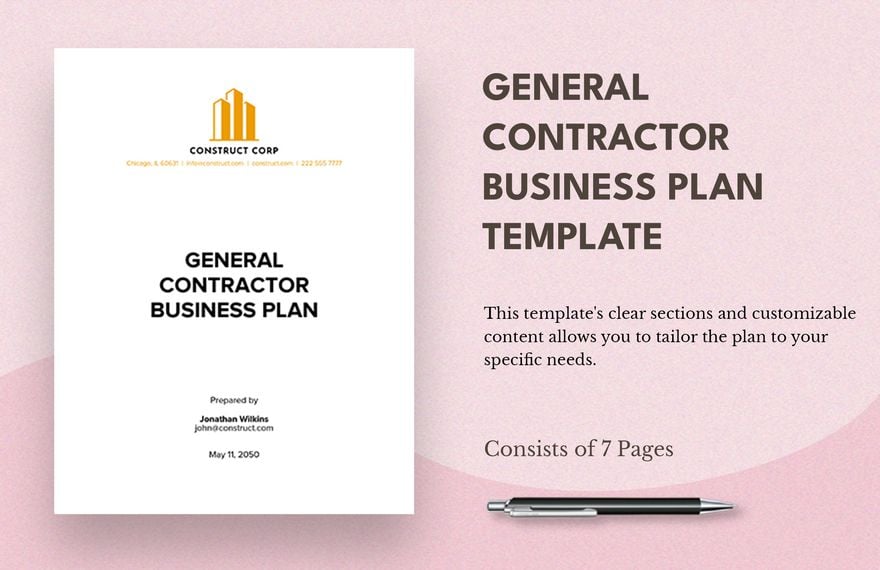
Download this General Contractor Business Plan Template Design in Word, Google Docs, PDF, Apple Pages Format. Easily Editable, Printable, Downloadable.
Other Construction Business Bundled
- construction home
- starting construction
- business plan
- accounting & finance
- administration
- project & operations
- health & safety
- sales & marketing
- procurement & supply chain
Already a premium member? Sign in
- Microsoft Word
- , Google Docs
- , Apple Pages
You may also like
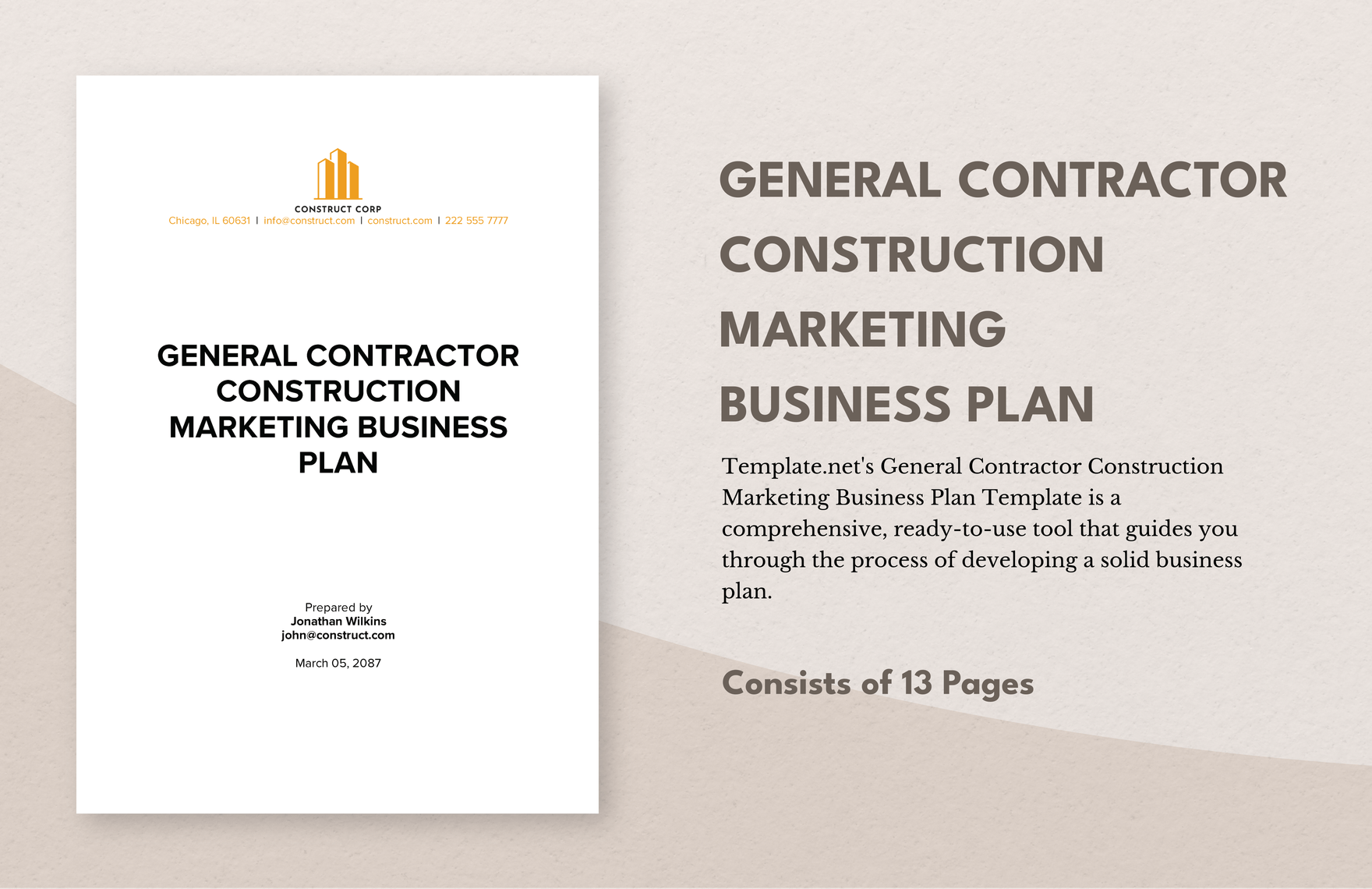
General Contractor Construction Marketing Business Plan Template
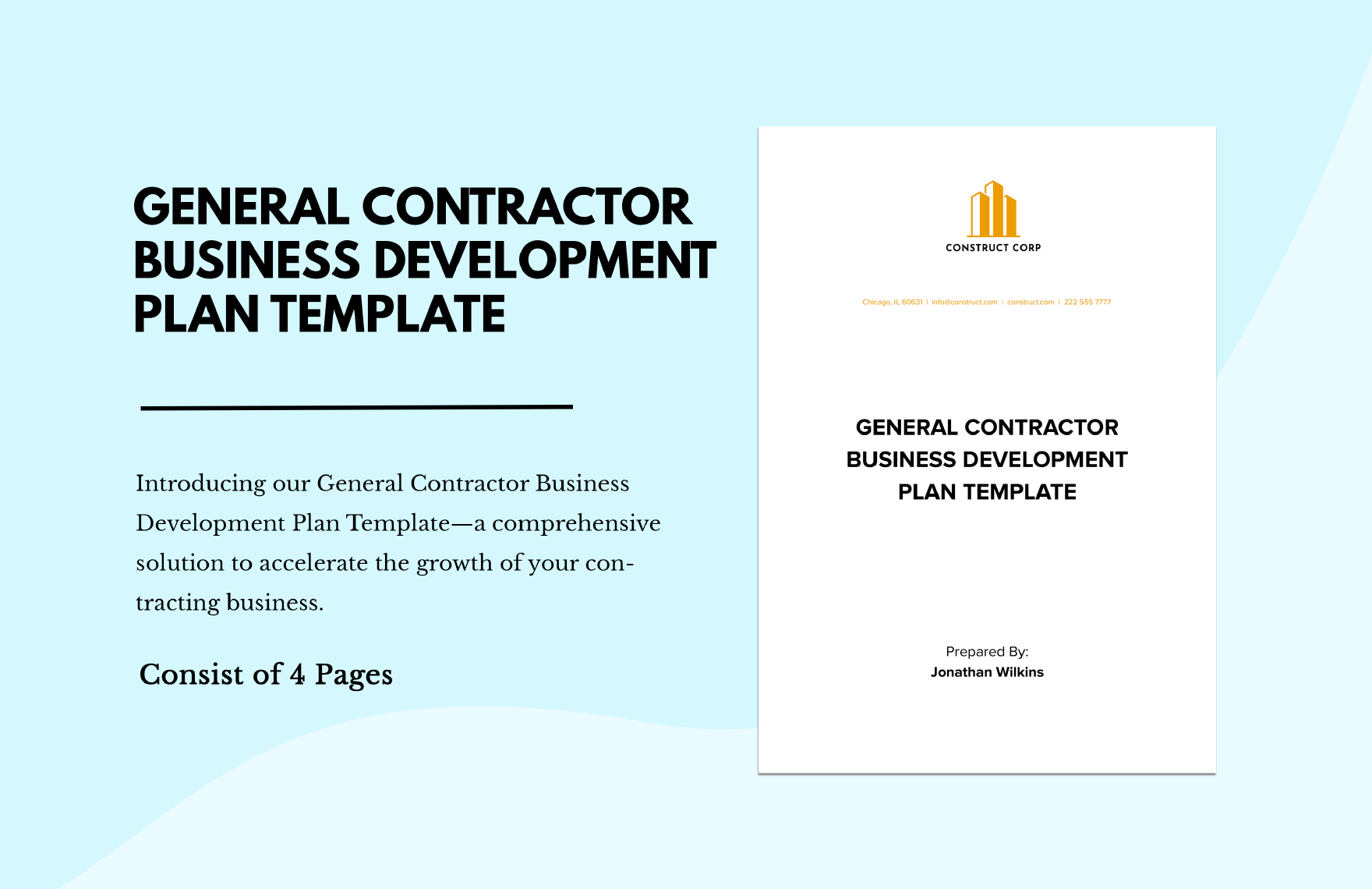
General Contractor Business Development Plan
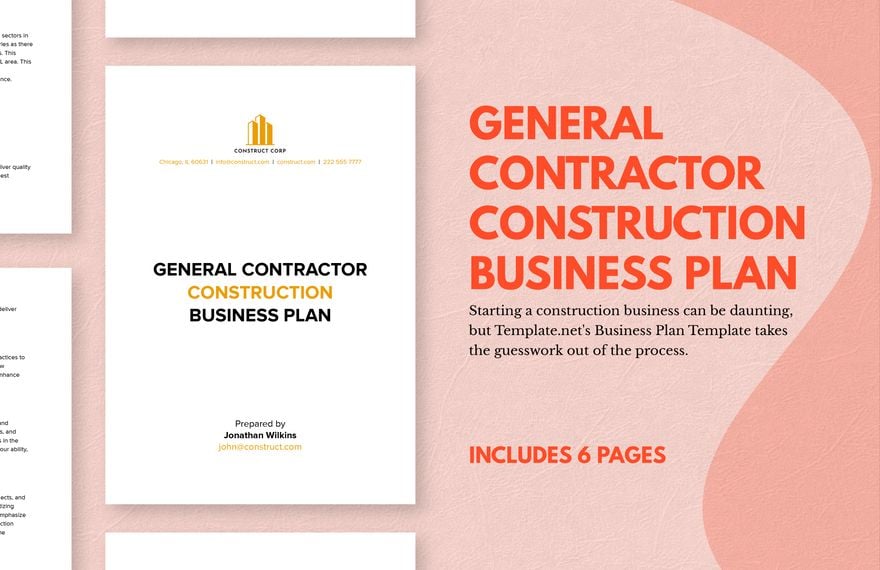
General Contractor Construction Business Plan Template
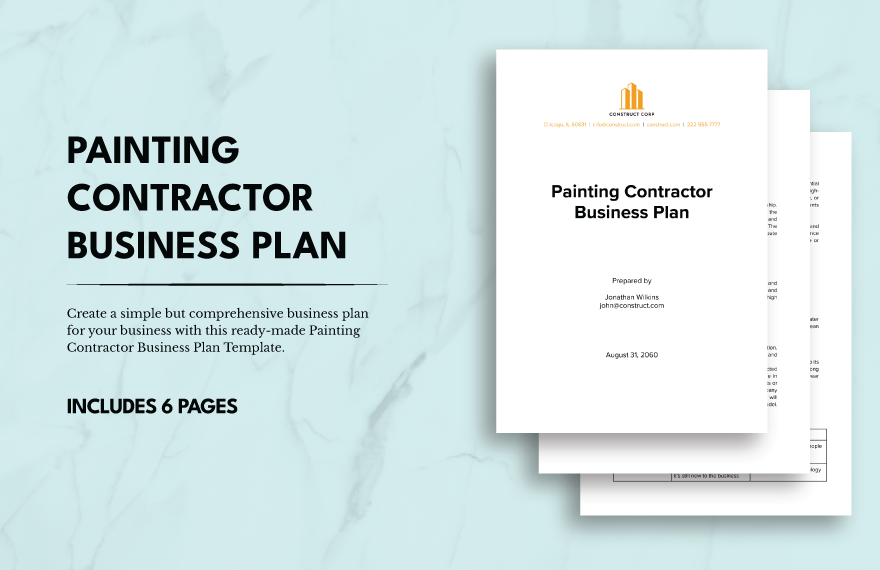
Painting Contractor Business Plan Template
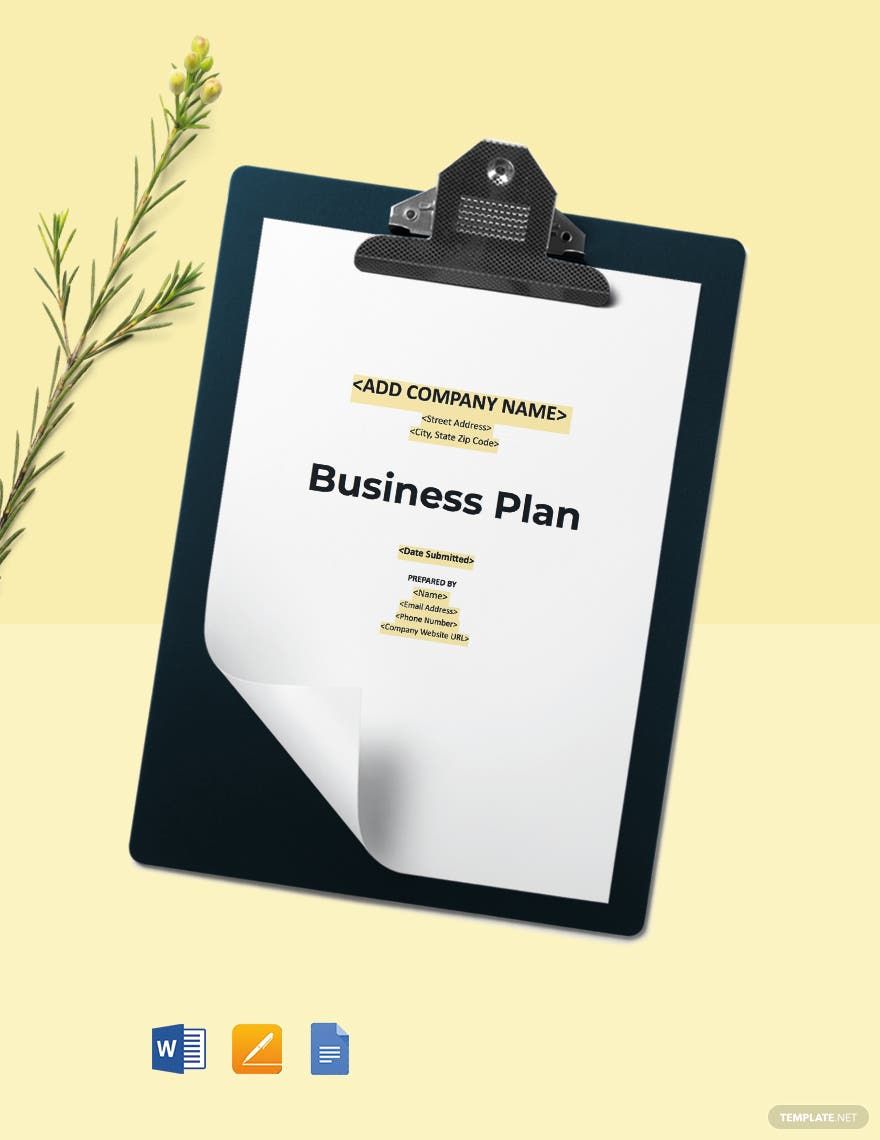
Construction Contractor Business Plan Template
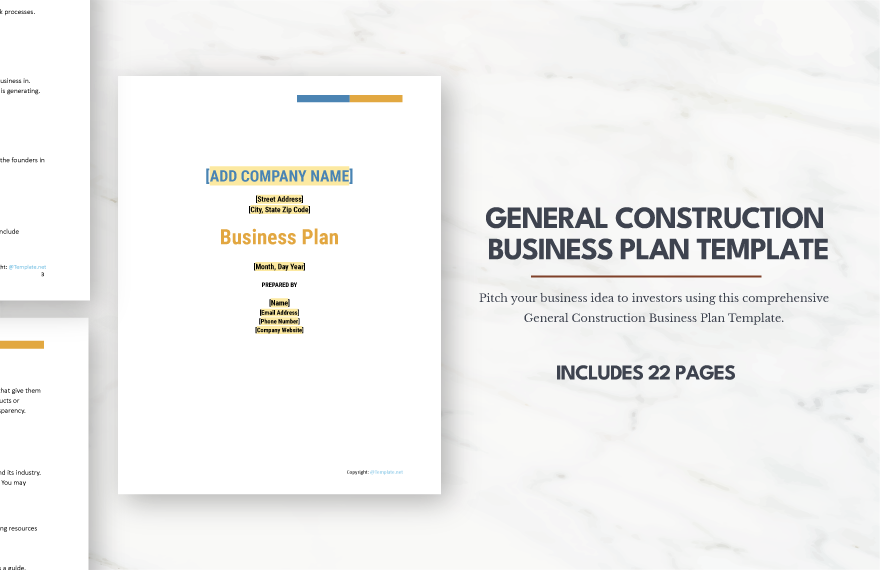
General Construction Business Plan Template
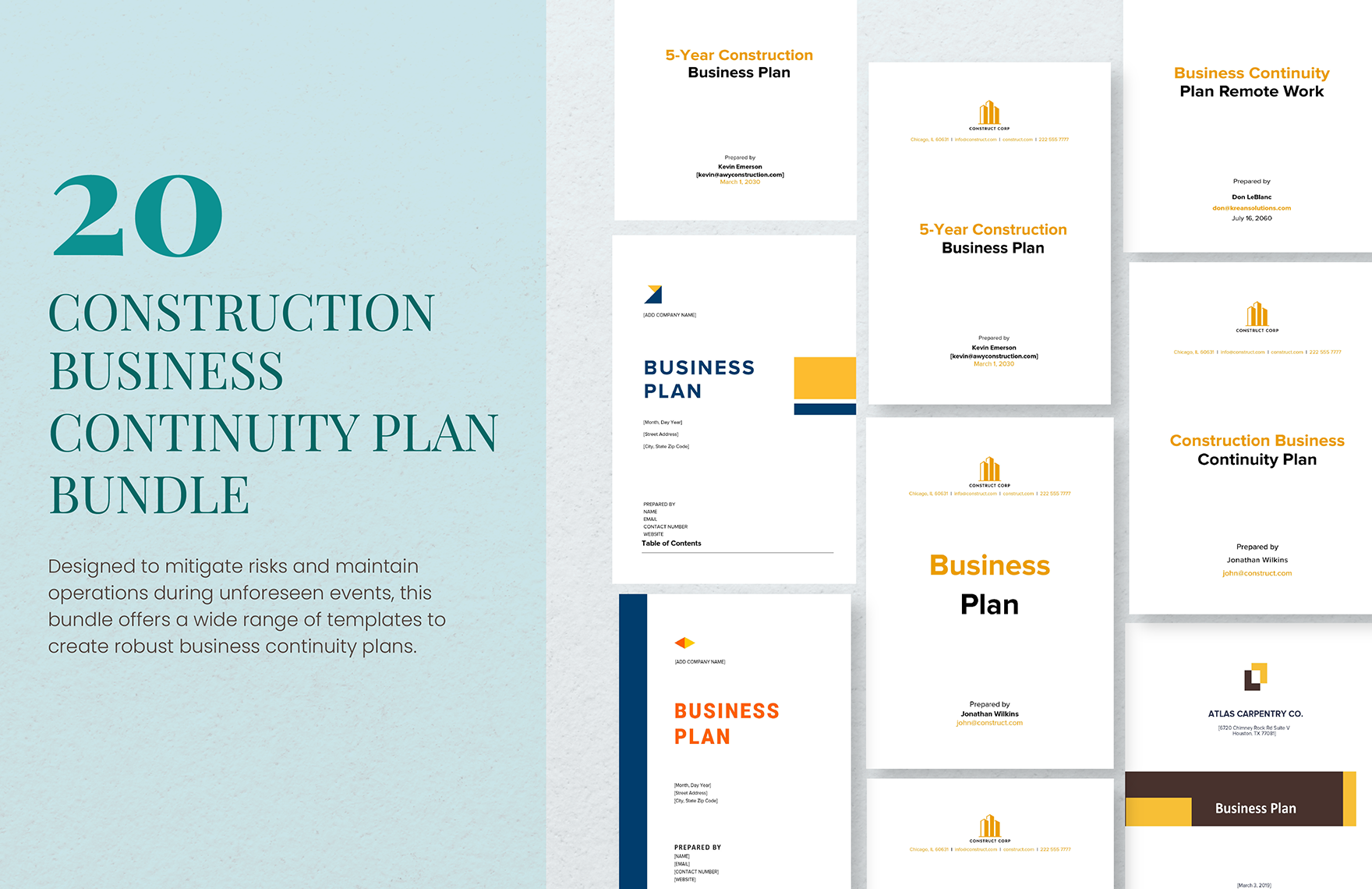
20 Construction Business Continuity Plan Bundle
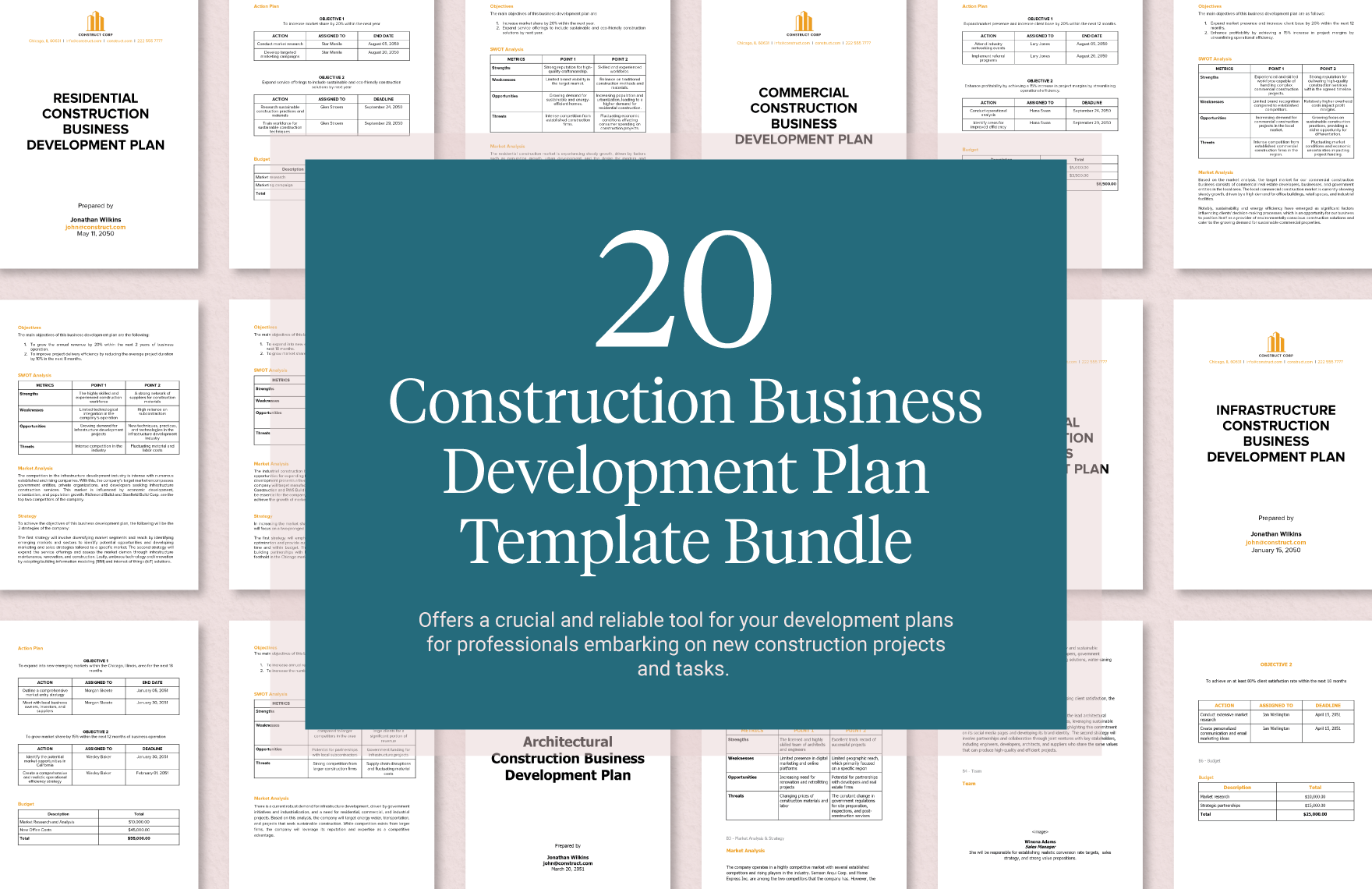
20 Construction Business Development Plan Template Bundle
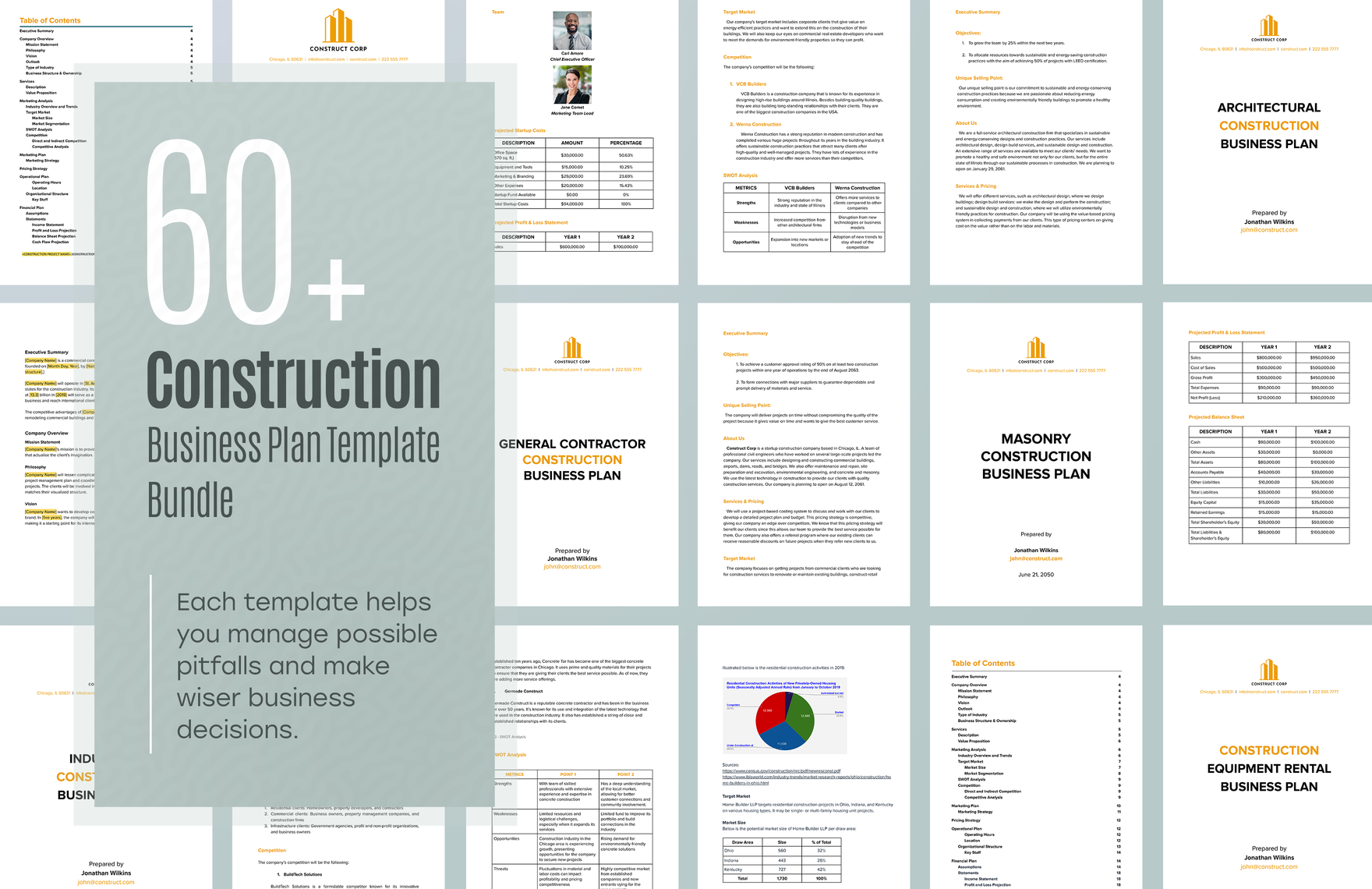
60+ Construction Business Plan Template Bundle
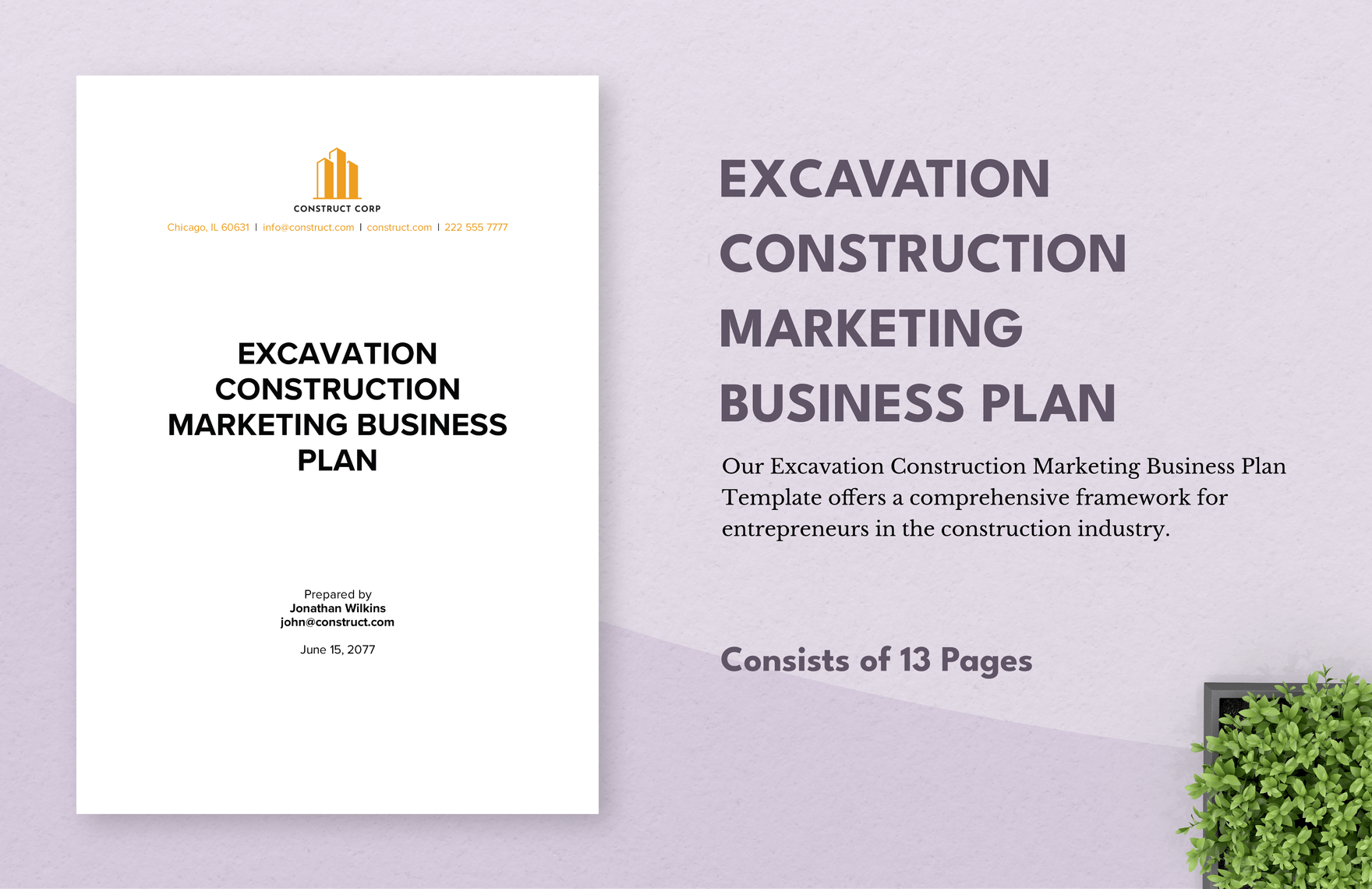
Excavation Construction Marketing Business Plan Template
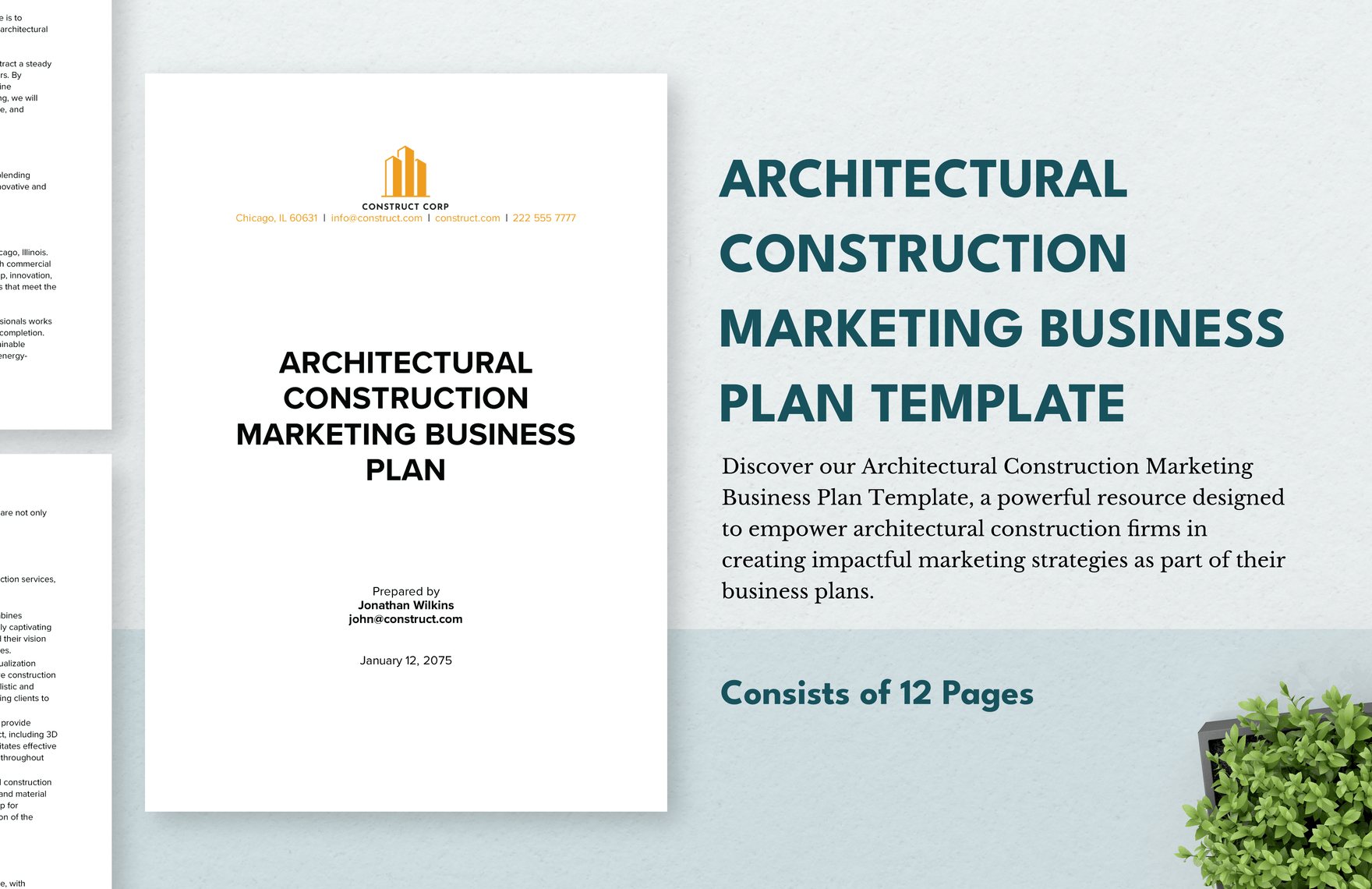
Architectural Construction Marketing Business Plan Template
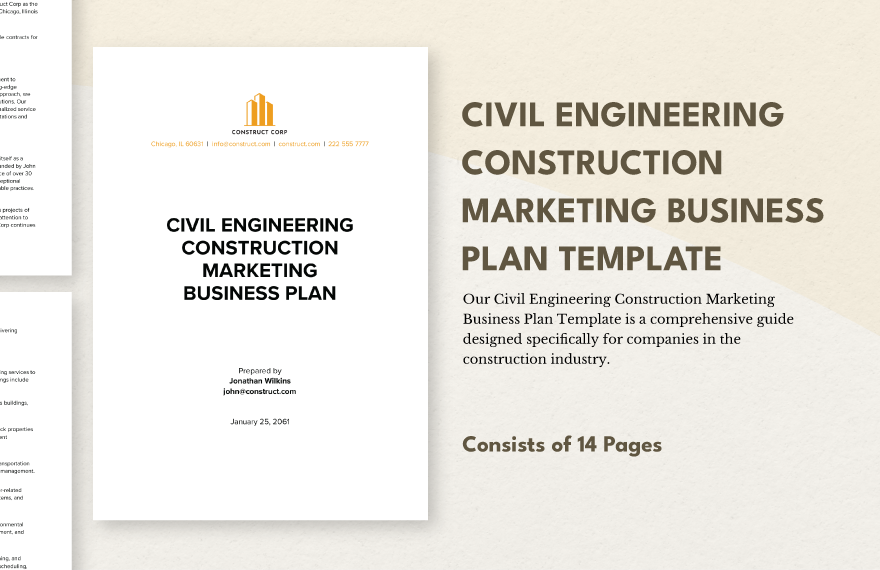
Civil Engineering Construction Marketing Business Plan Template
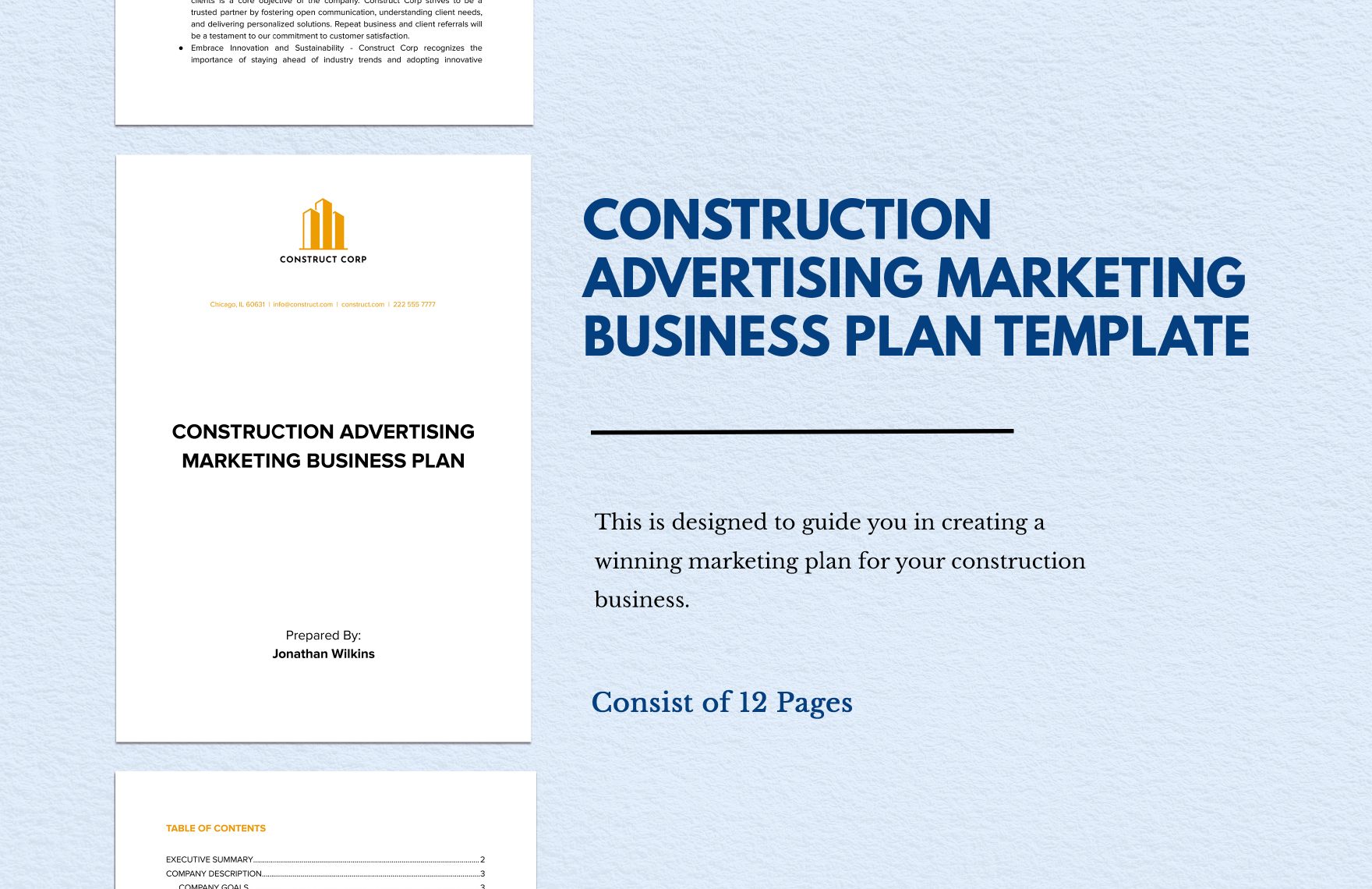
Construction Advertising Marketing Business Plan
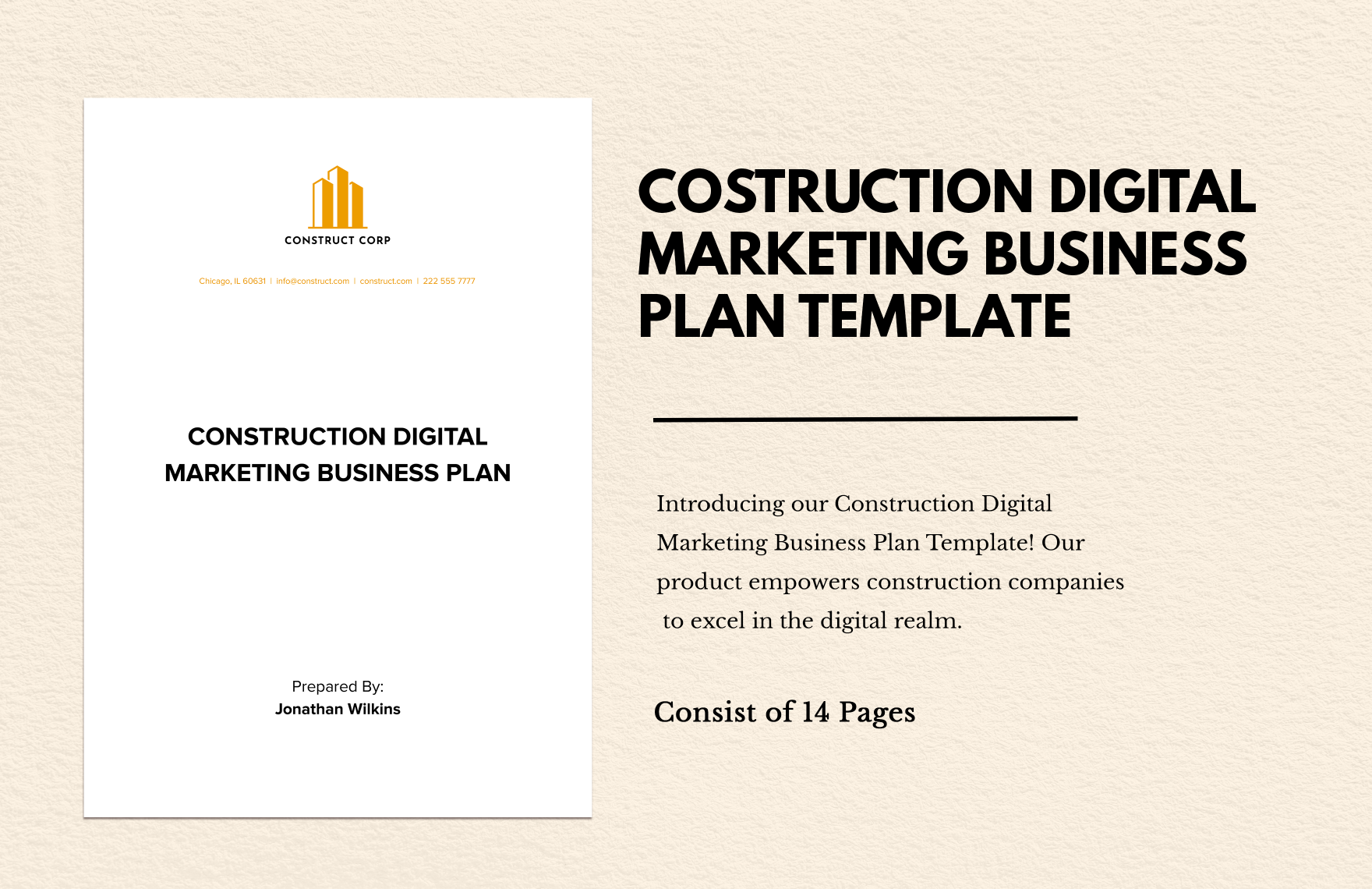
Construction Digital Marketing Business Plan
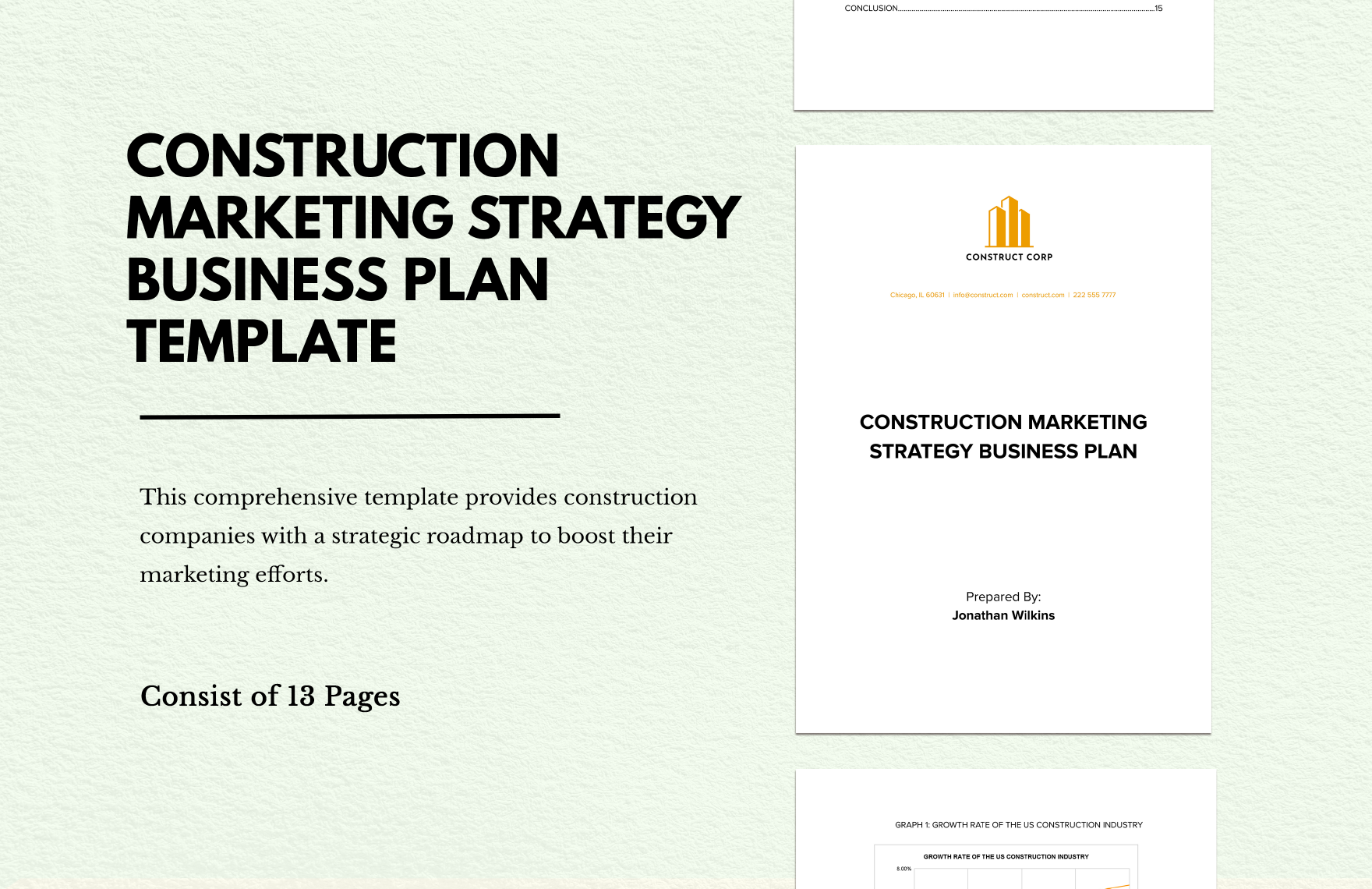
Construction Marketing Strategy Business Plan
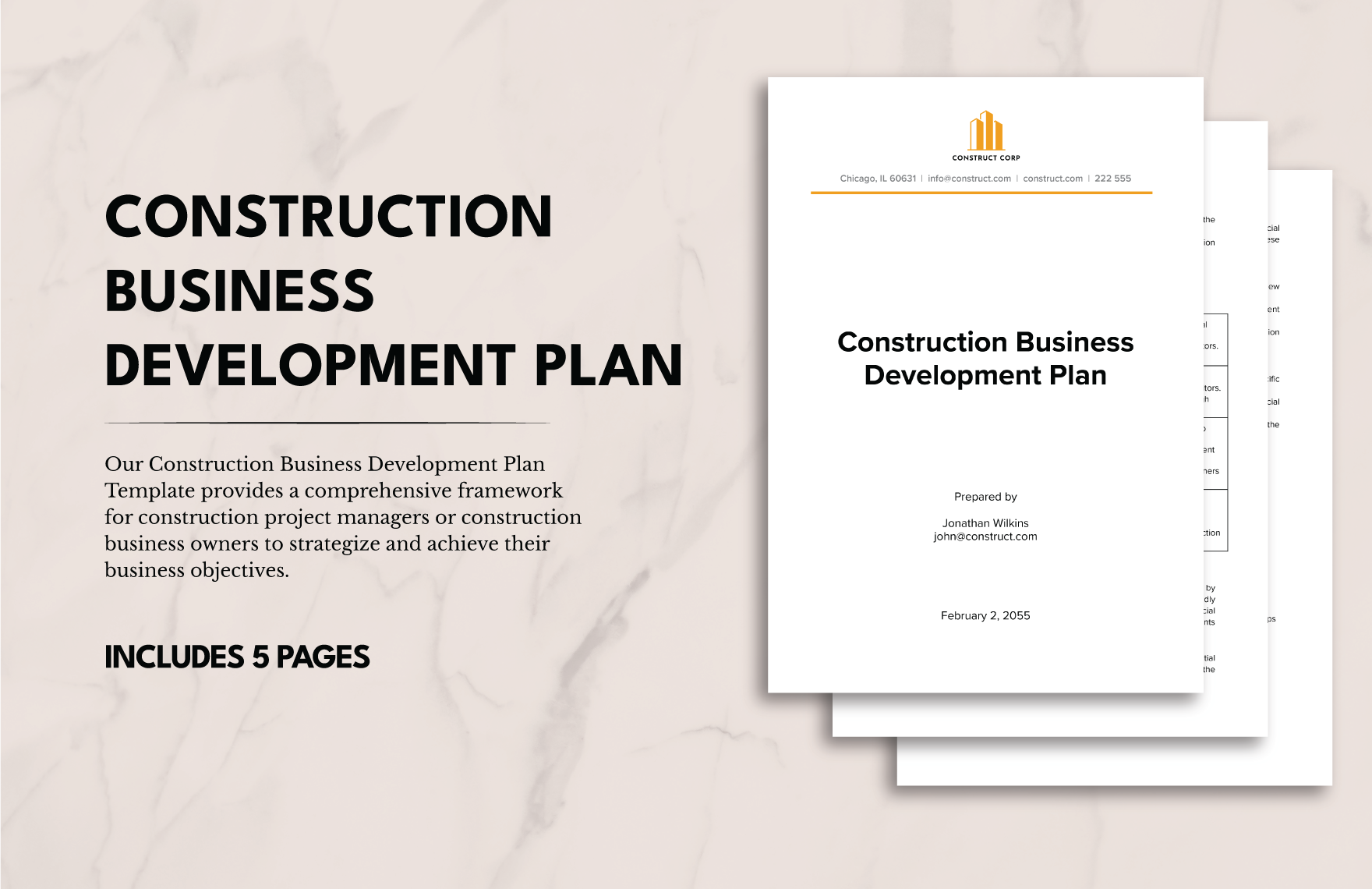
Construction Business Development Plan Template
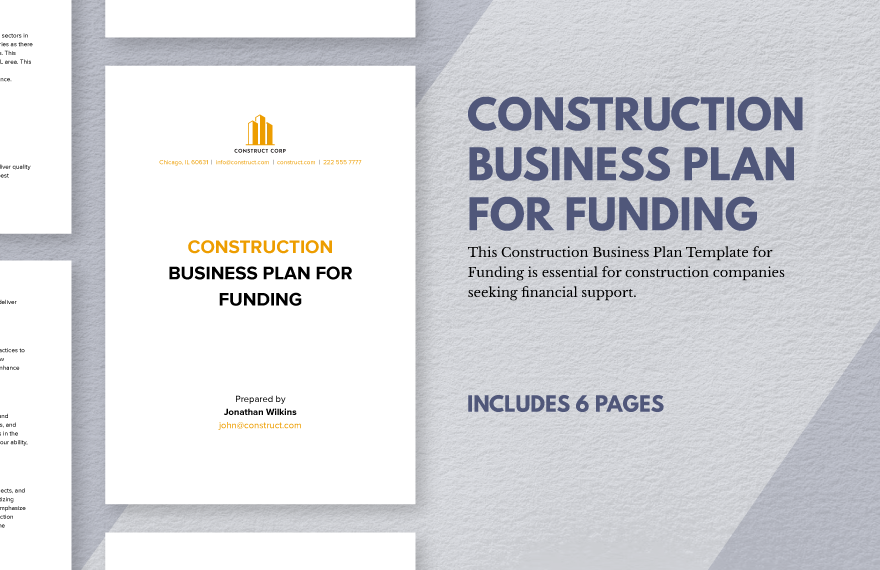
Construction Business Plan Template for Funding
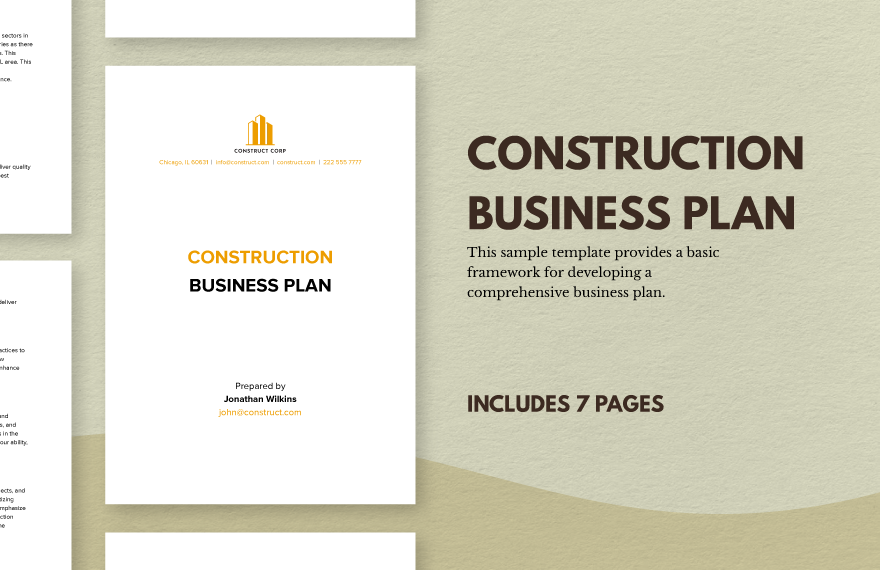
Construction Business Plan
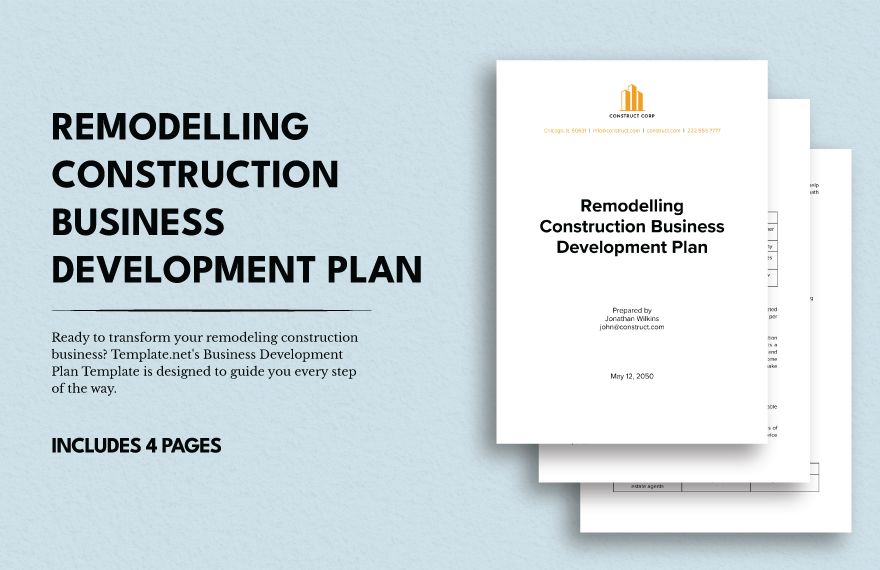
Remodelling Construction Business Development Plan Template
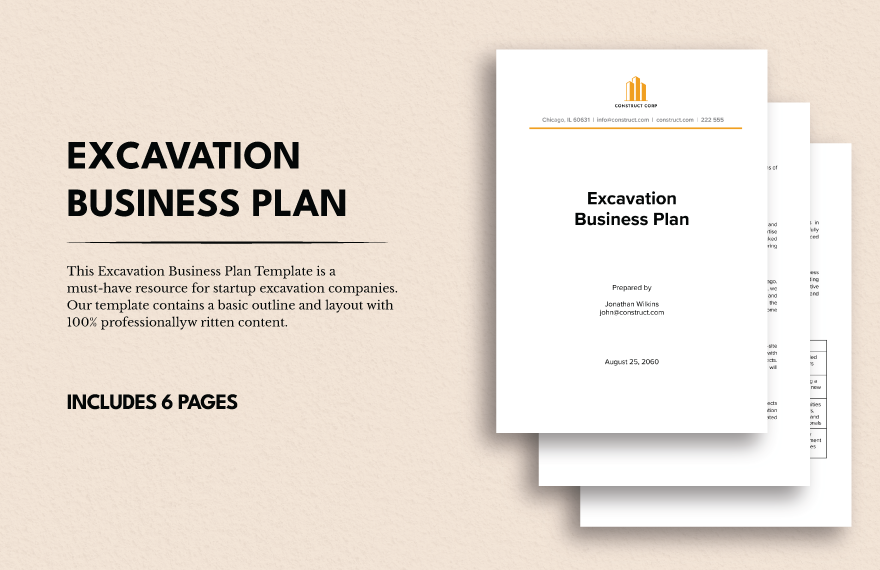
Excavation Business Plan Template
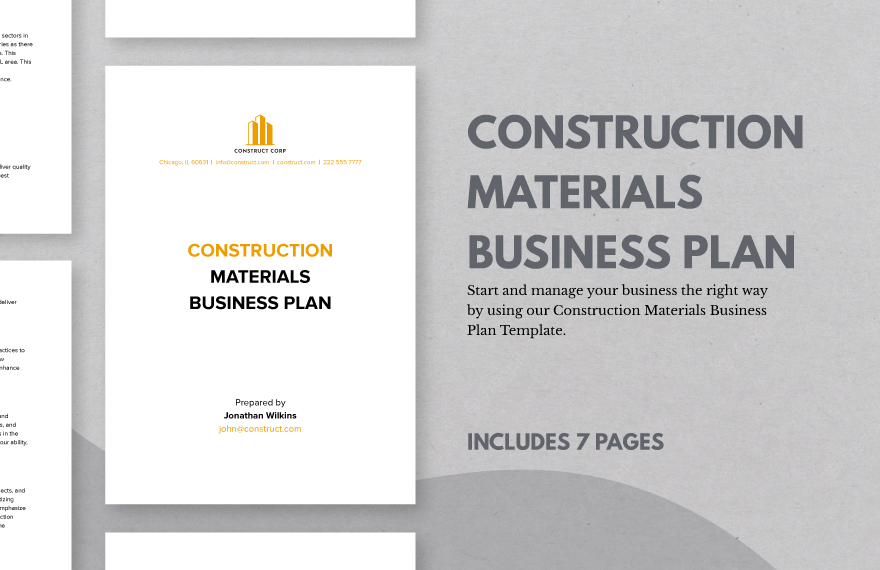
Construction Materials Business Plan
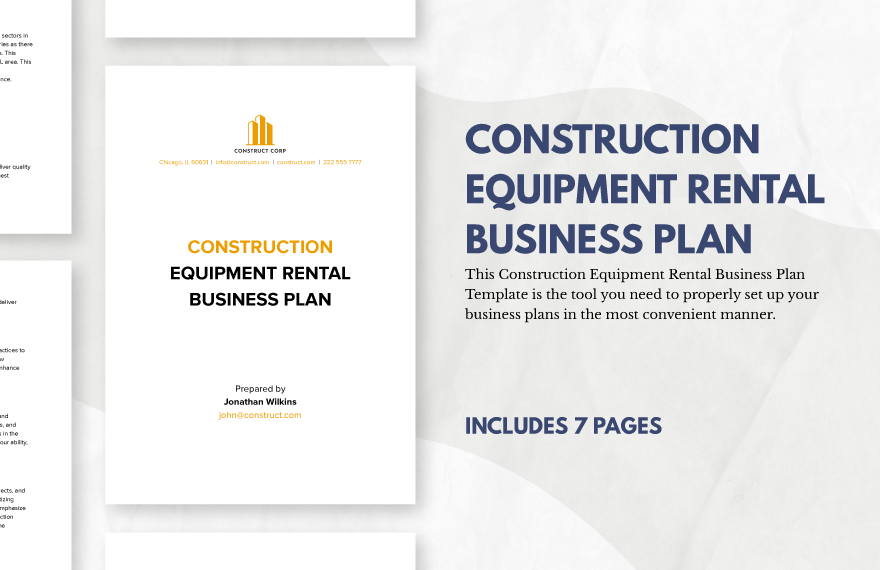
Construction Equipment Rental Business Plan
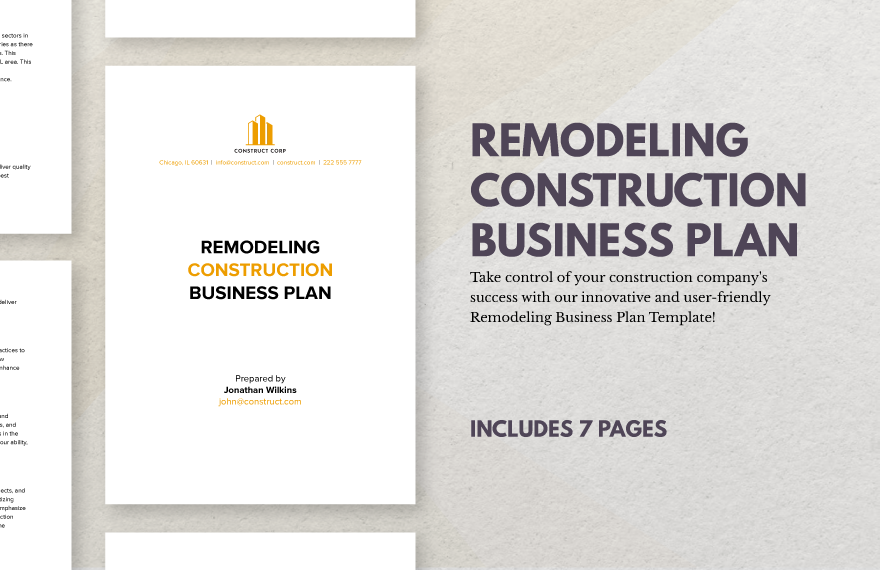
Remodeling Business Plan
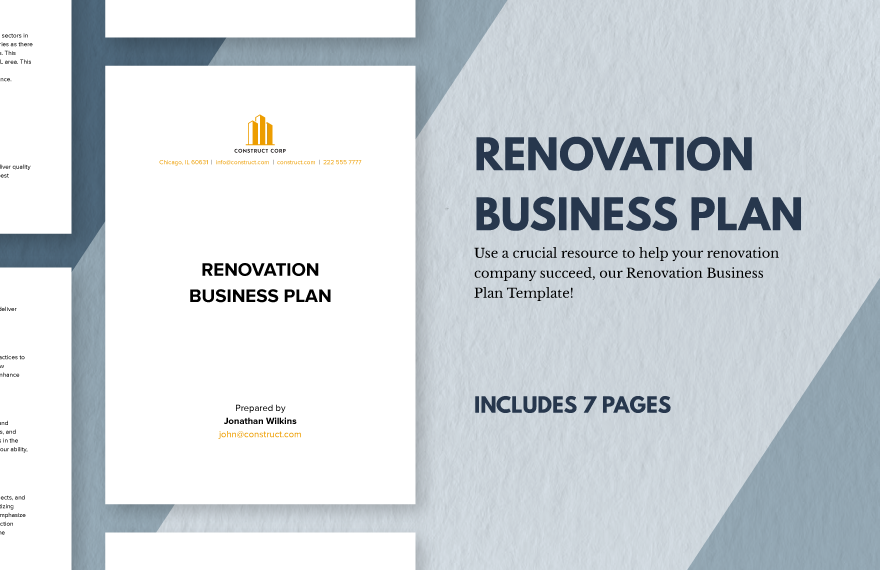
Renovation Business Plan
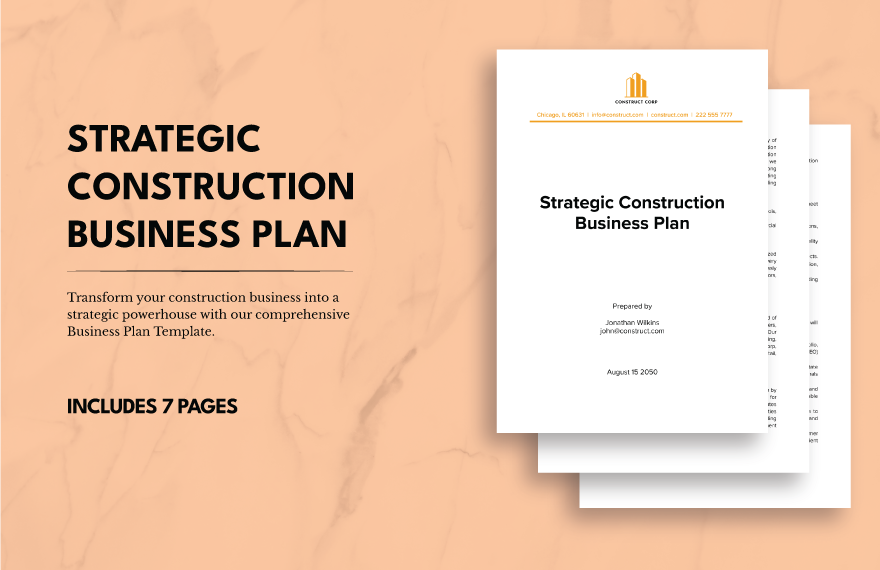
Strategic Construction Business Plan Template
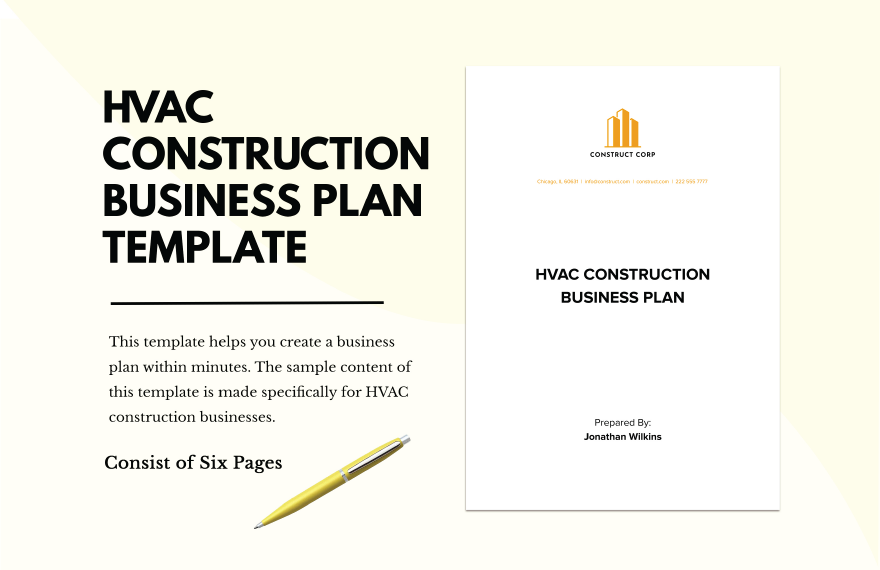
HVAC Construction Business Plan Template
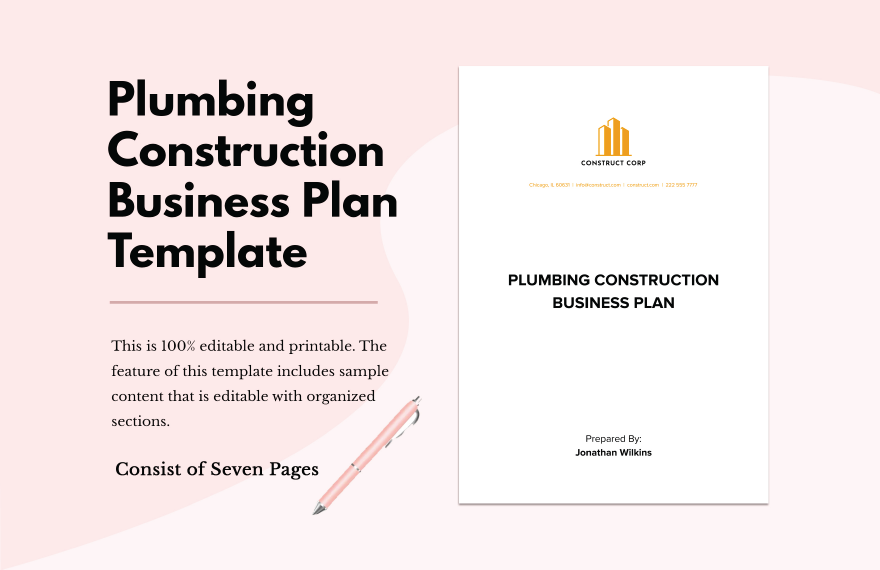
Plumbing Construction Business Plan Template
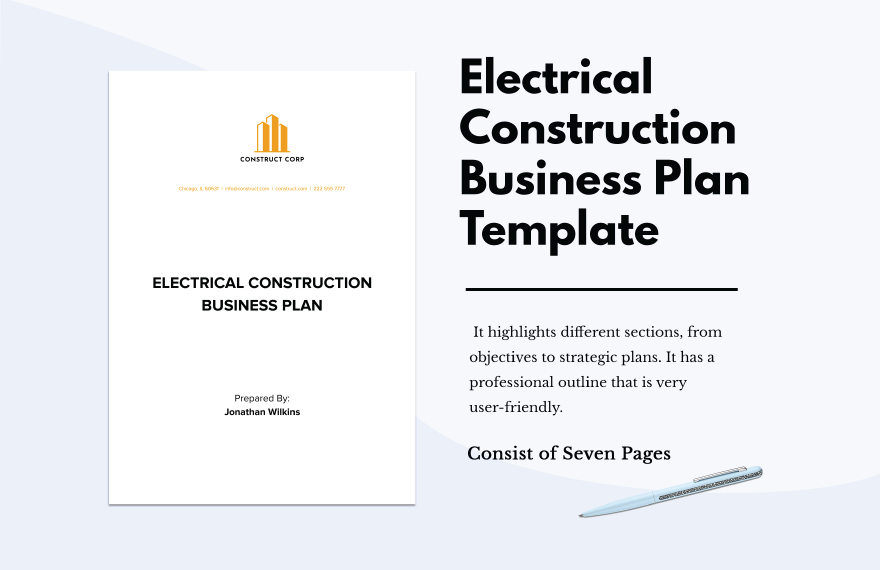
Electrical Construction Business Plan Template
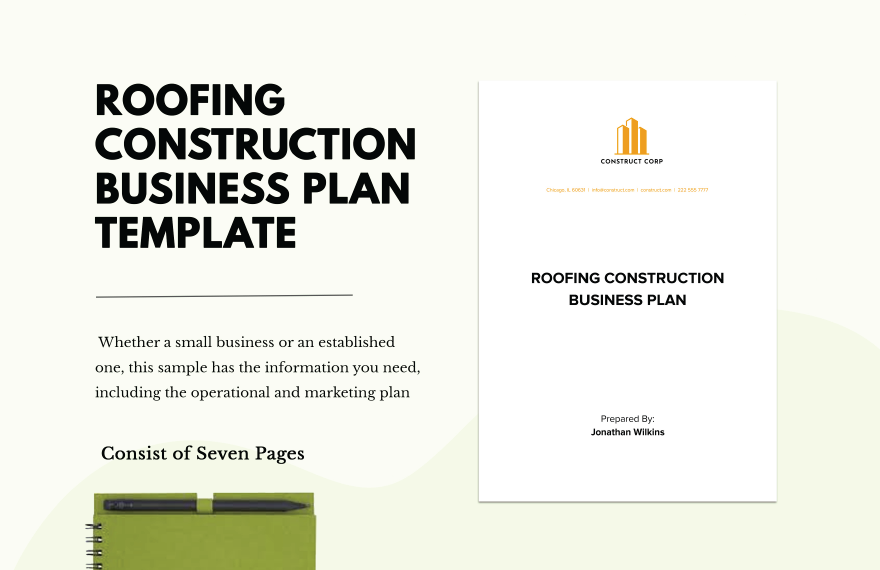
Roofing Construction Business Plan Template
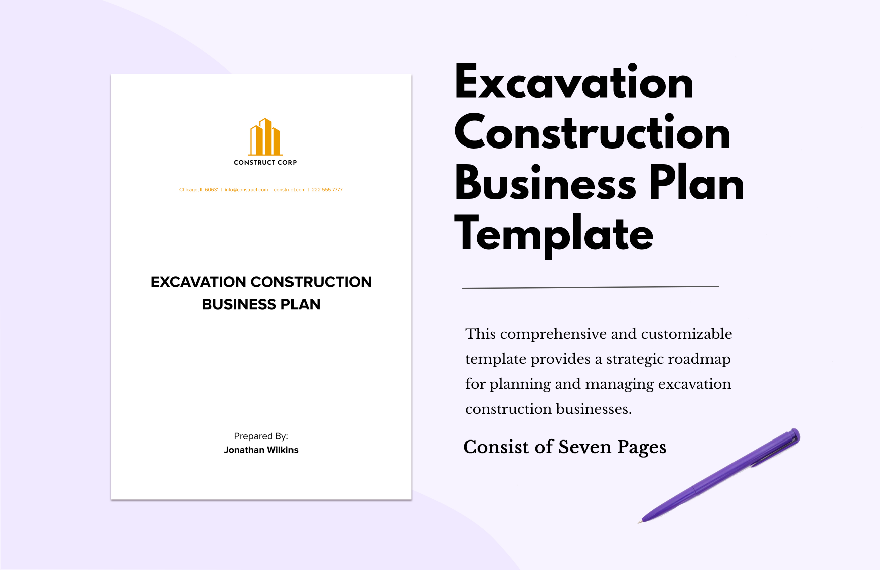
Excavation Construction Business Plan Template
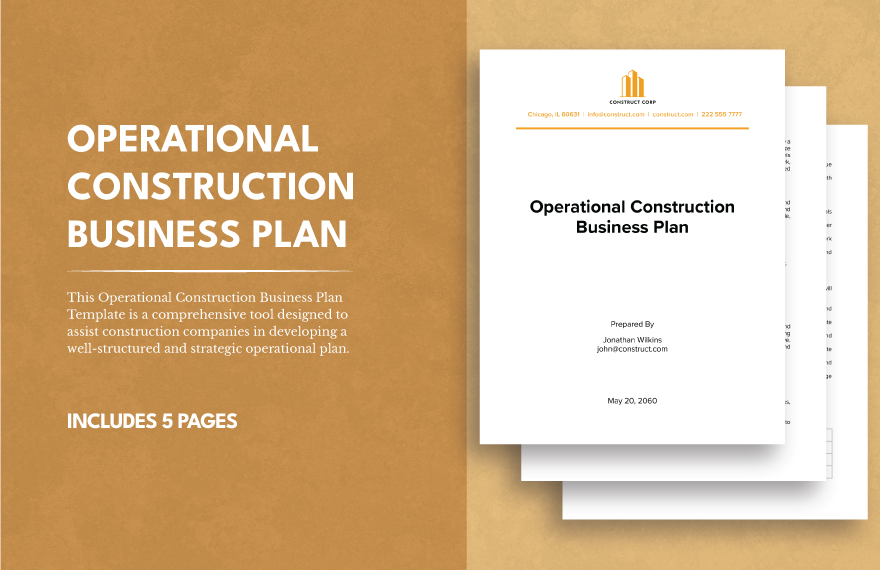
Operational Construction Business Plan Template
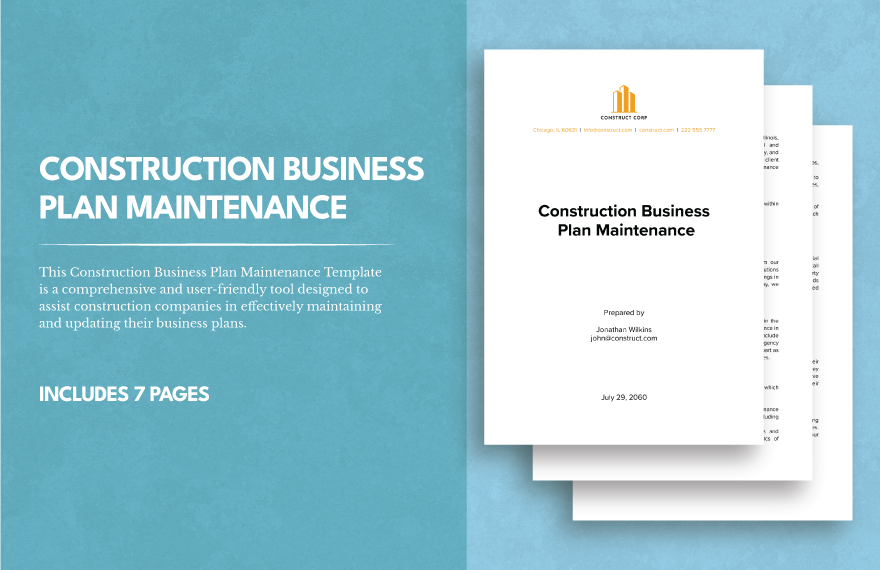
Construction Business Plan Maintenance Template
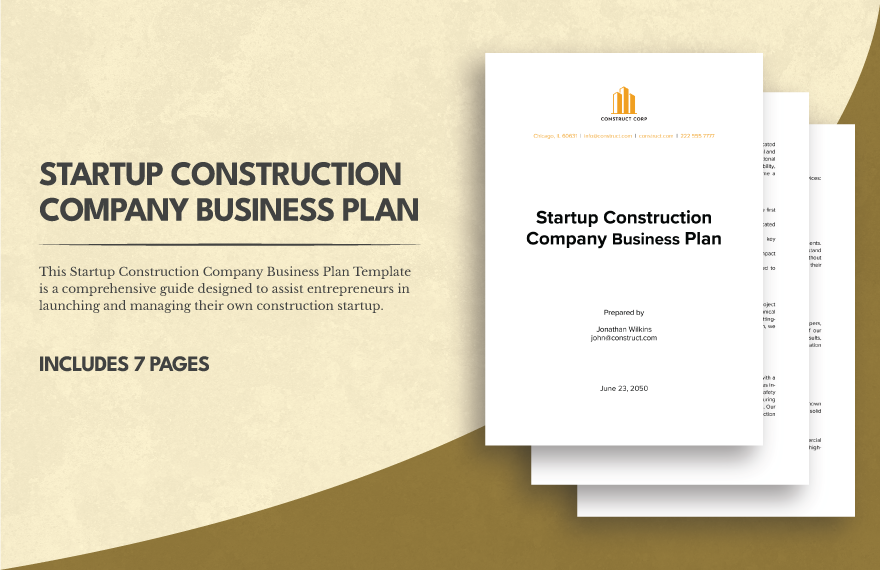
Startup Construction Company Business Plan Template
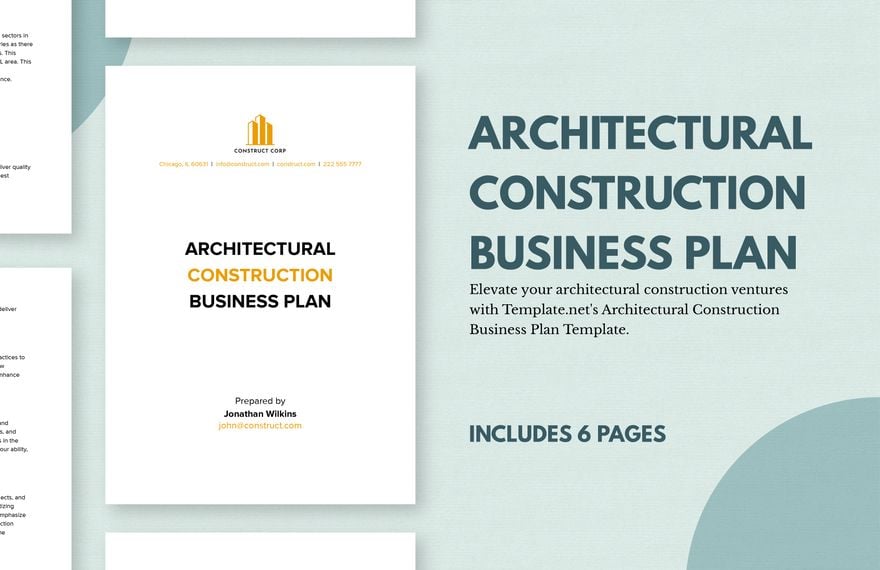
Architectural Construction Business Plan Template
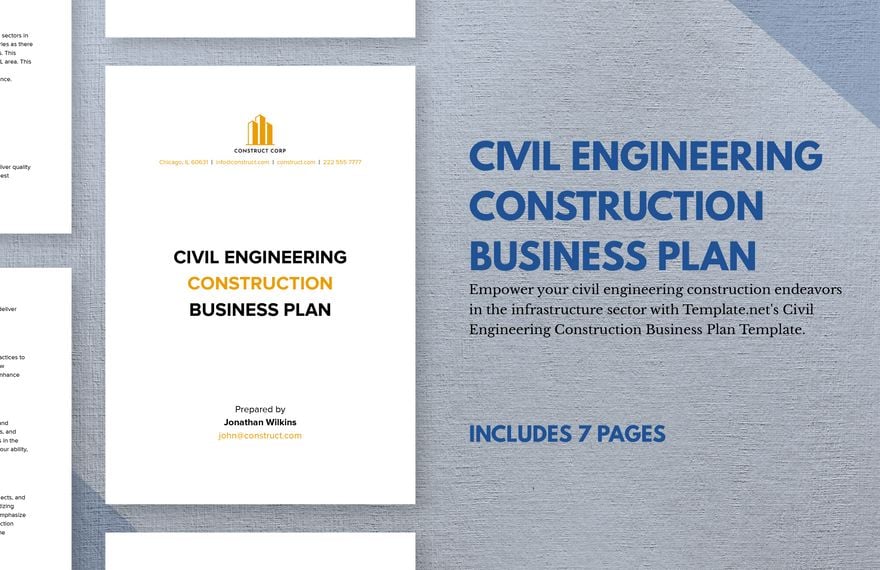
Civil Engineering Construction Business Plan Template
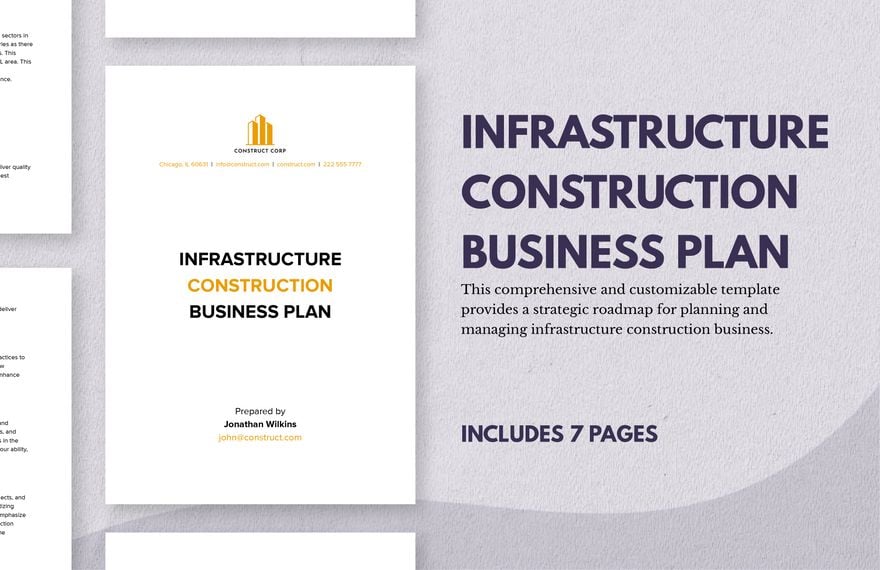
Infrastructure Construction Business Plan Template
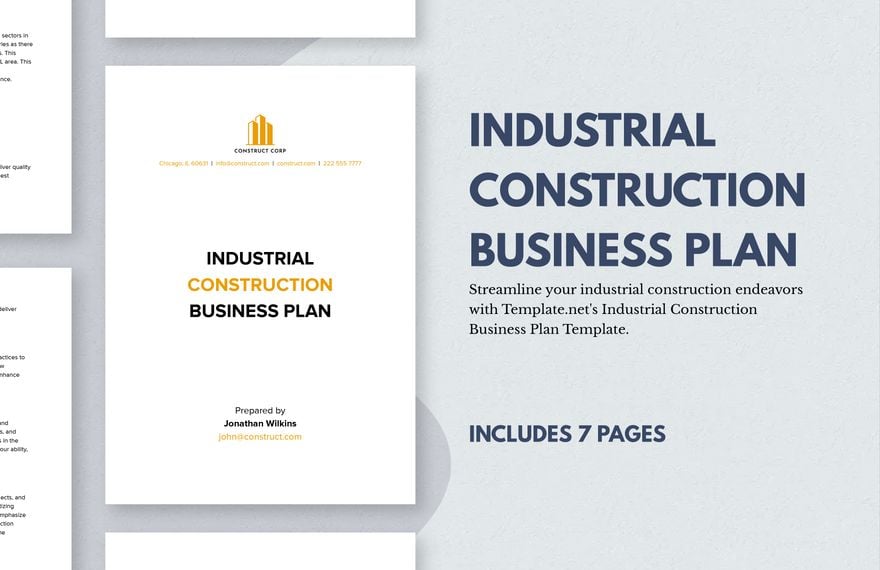
Industrial Construction Business Plan Template
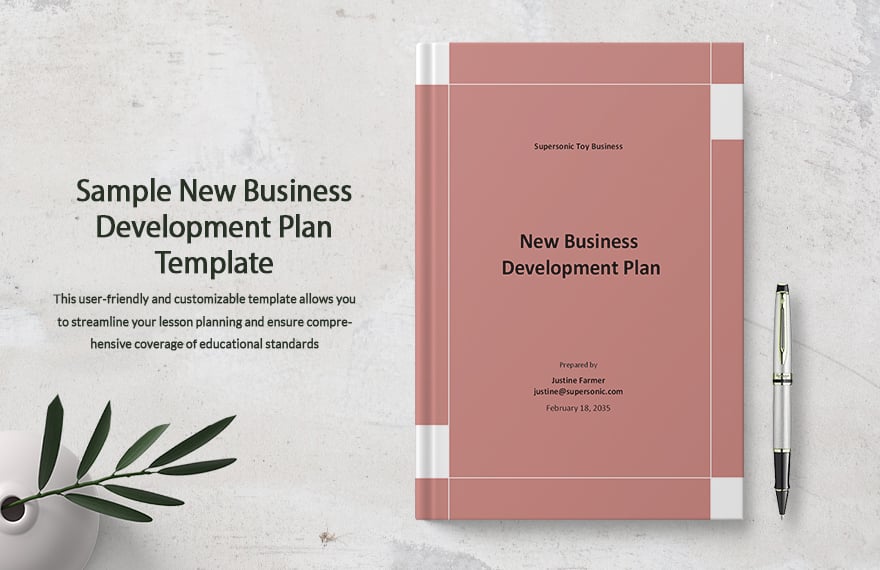
Sample New Business Development Plan Template
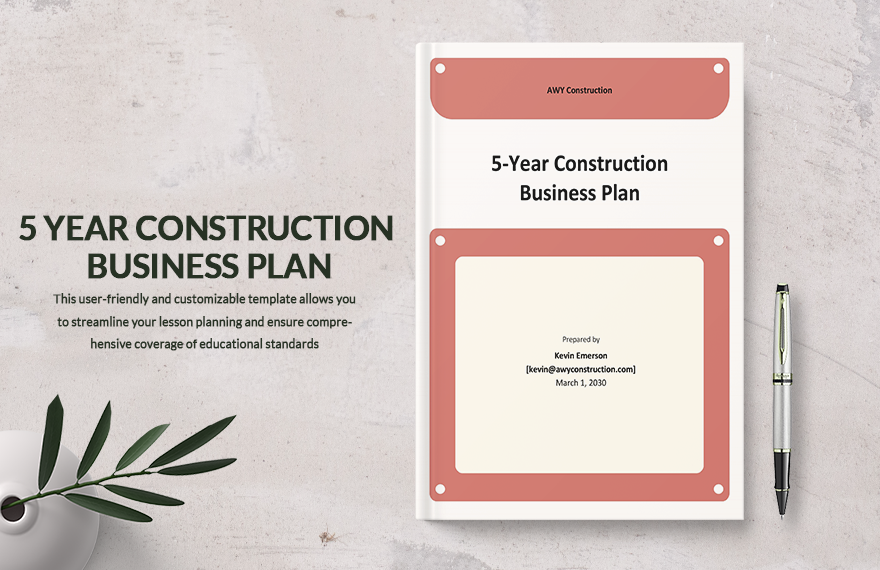
5 Year Construction Business Plan Template
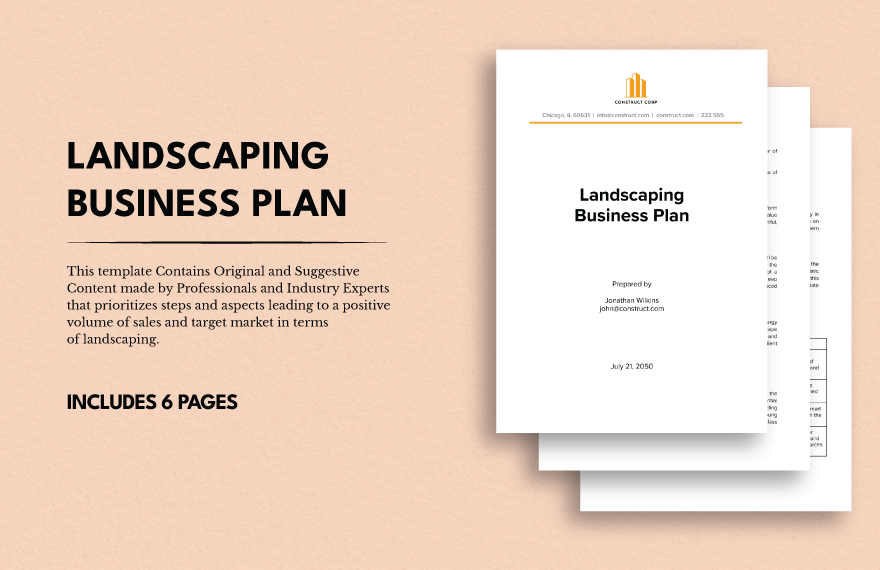
Landscaping Business Plan Template
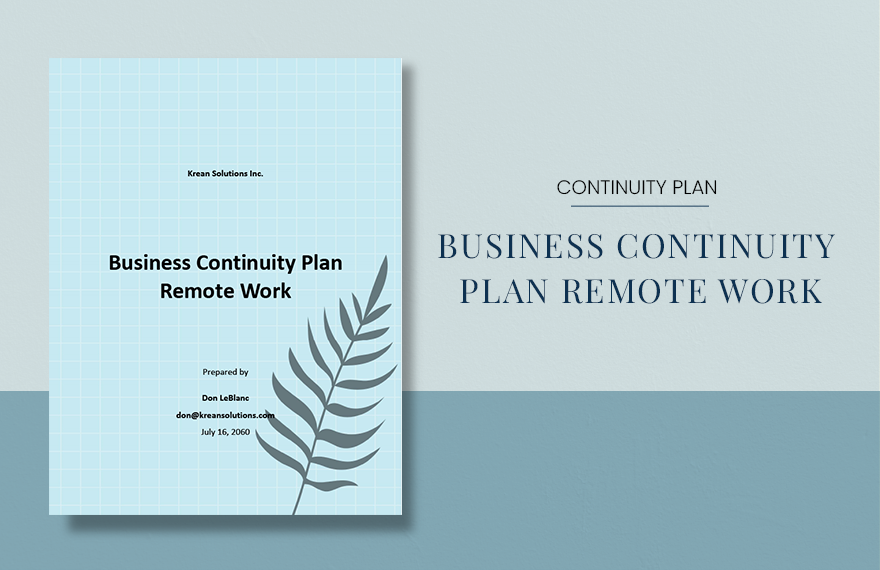
Business Continuity Plan Remote Work Template
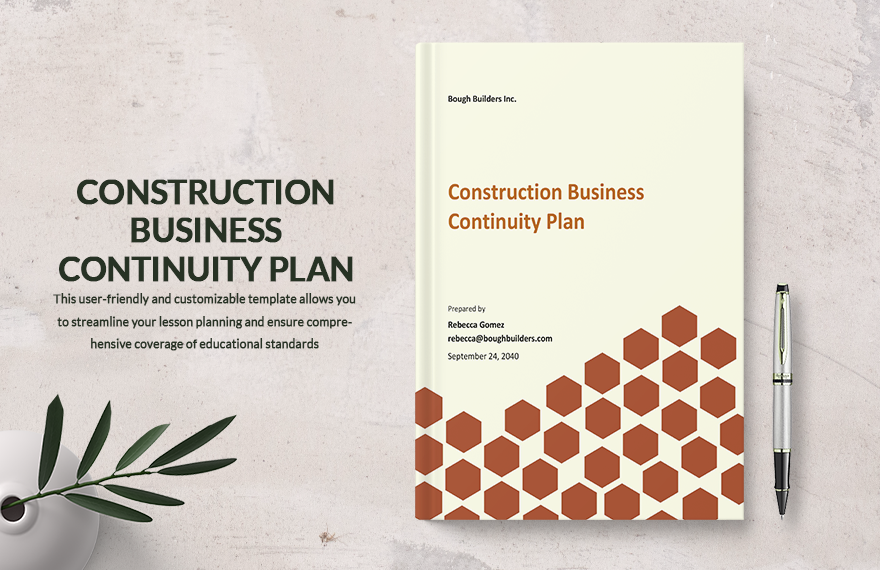
Construction Business Continuity Plan Template
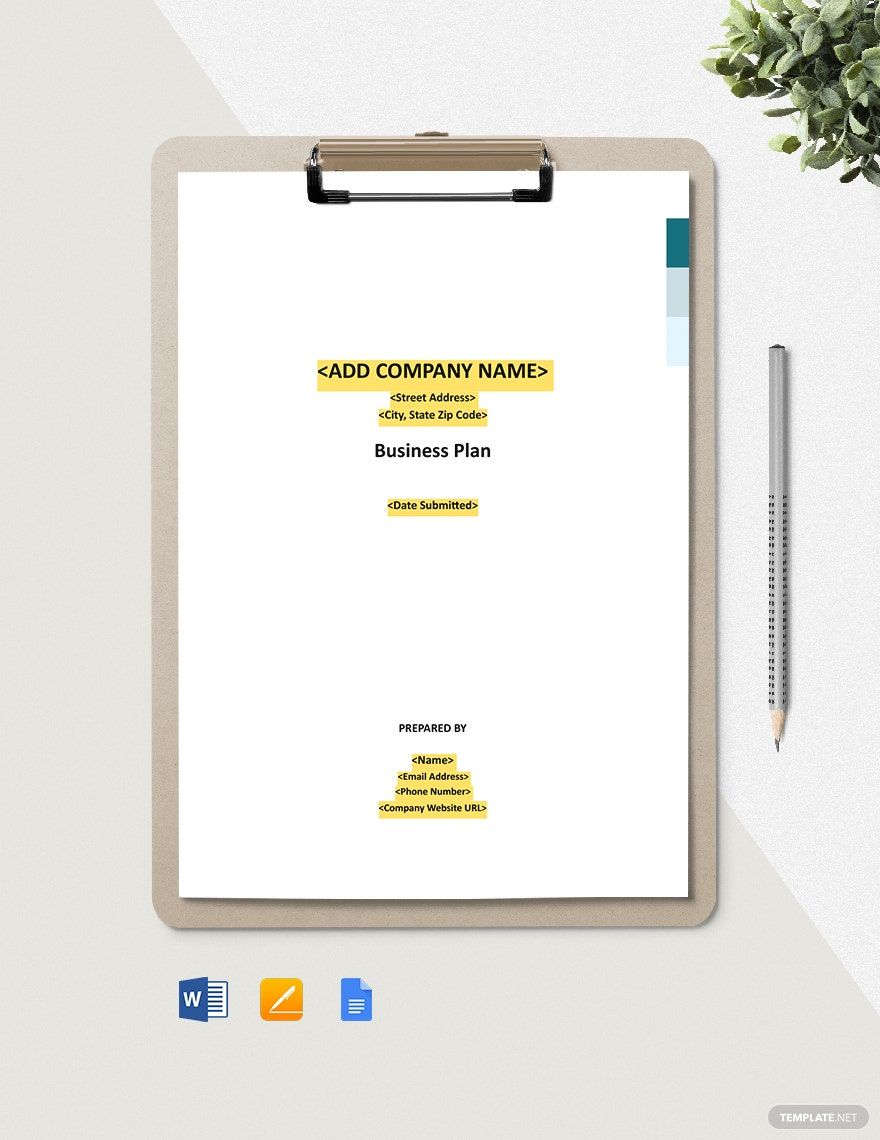
Post Construction Cleaning Business Plan Template

Simple Construction Business Plan Template
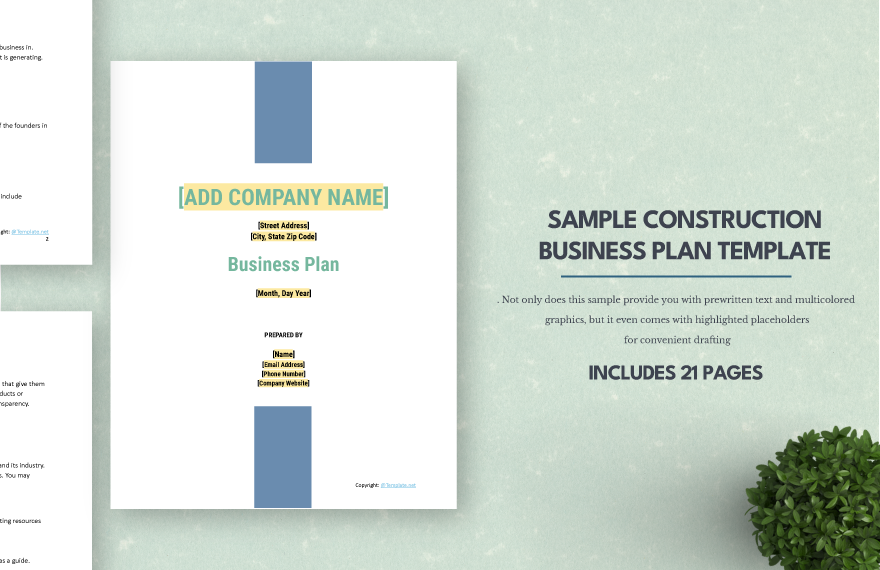
Sample Construction Business Plan Template
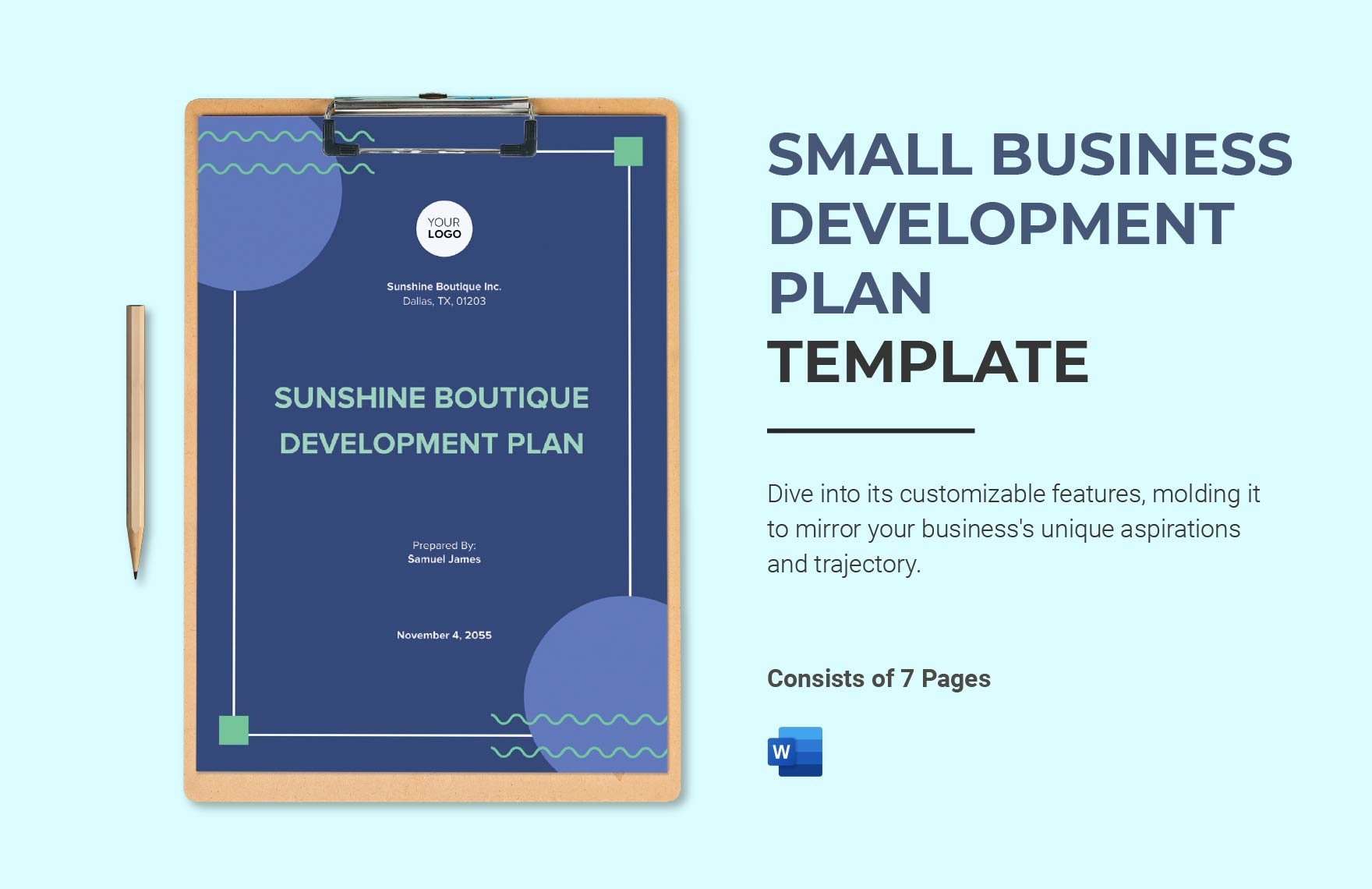
Small Business Development Plan Template
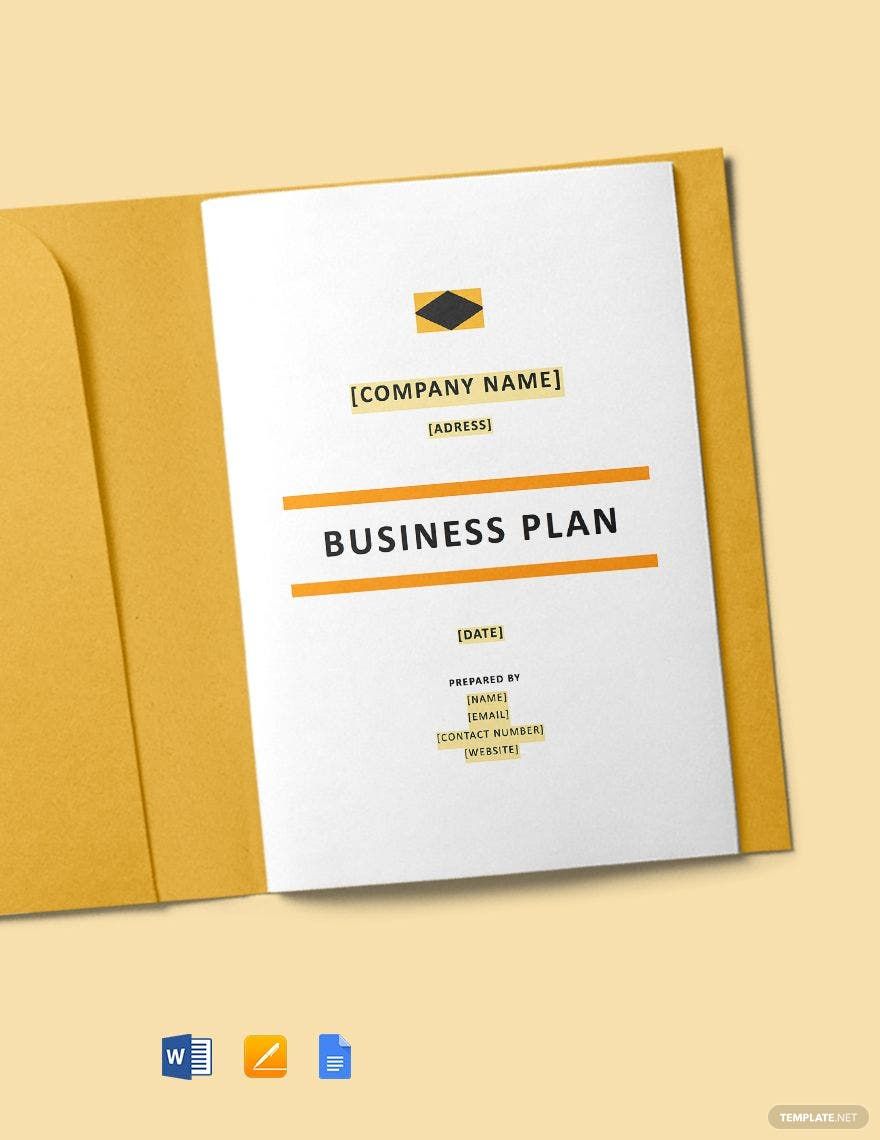
Construction Start-up Business Plan Template
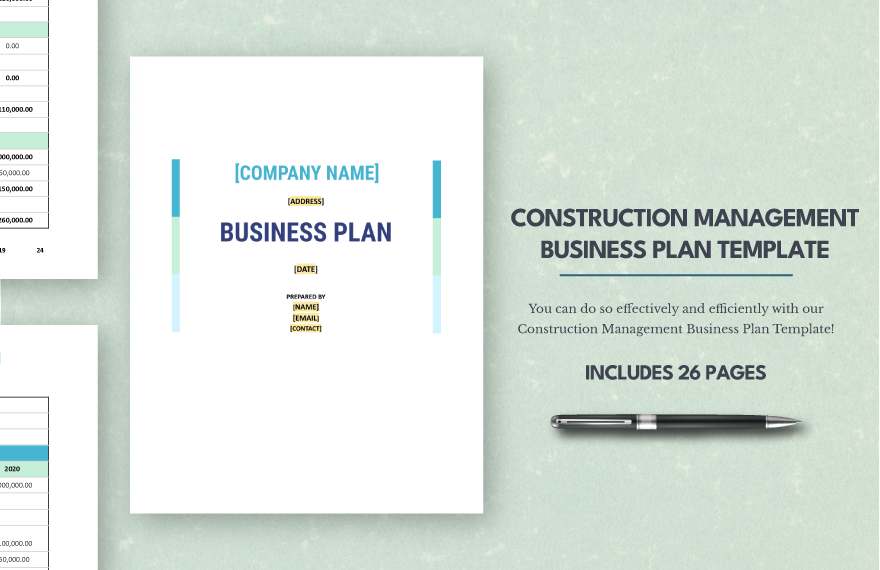
Construction Management Business Plan Template
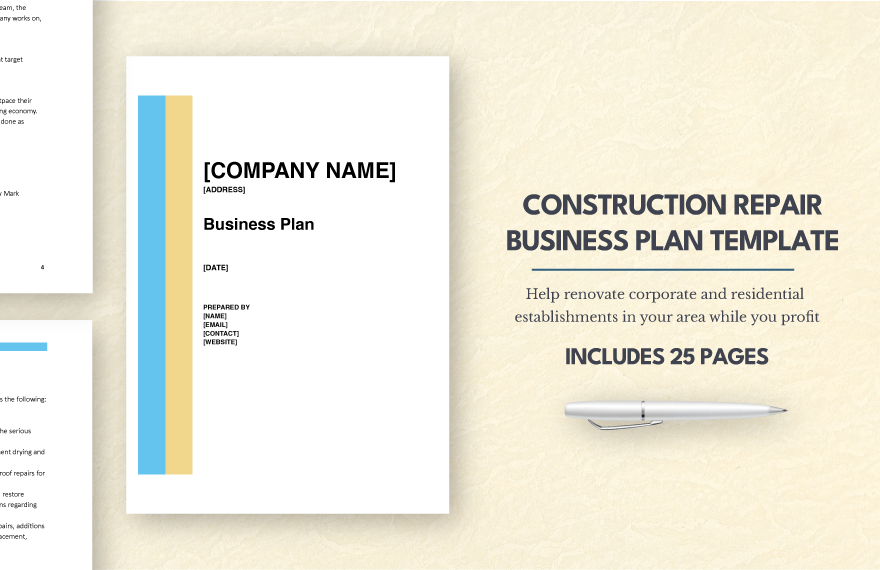
Construction Repair Business Plan Template
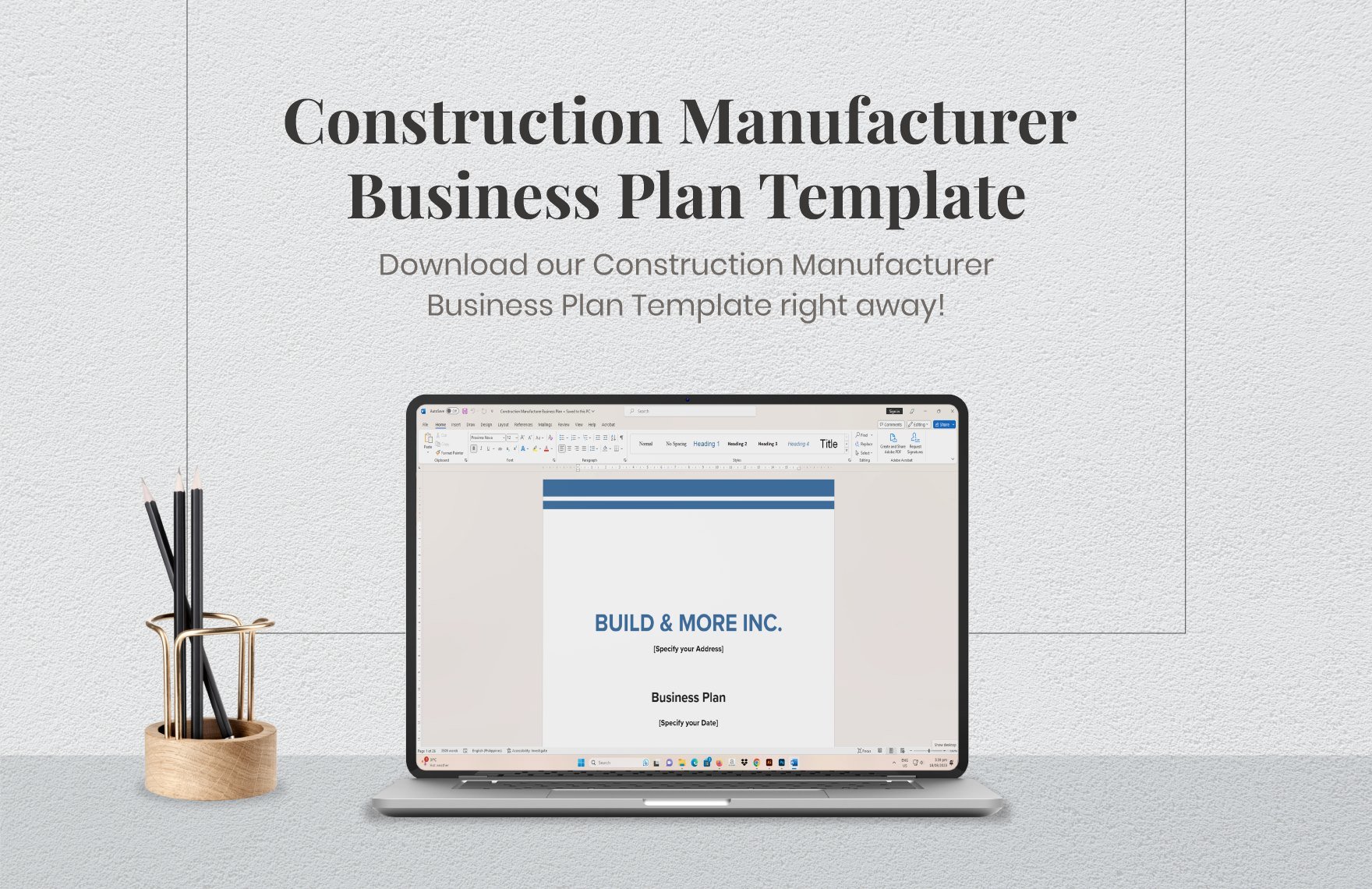
Construction Manufacturer Business Plan Template
The 10 Best St. Petersburg, FL General Contractors
Recent projects, filter contractors in fl, let us help you find the right general contractor., press coverage.
- Top 10 contractors
- BuildZoom score
- Verified projects
- Client ratings
- Avg project value

BuildZoom: The Best Way to Hire
Let us do the work for you. Simply describe your project and we'll help you find the perfect contractor.
Recent Construction Projects from Homeowners
If you pay someone to construct a building or a structure, make structural alterations to load bearing walls, or perform services such as plumbing or air conditioning work, that person must have a state contractor's license.
The Florida Construction Industry License Board maintains high standards for contractor licensing. Prior to receiving their license, Florida contractors are required to prove four years of relevant work experience or education; pass a board examination and prove financial solvency.
In Florida, licensed contractors with employees are required to carry workers' compensation insurance and attest they have obtained public liability and property damage insurance in the amounts determined by the Board.
Florida maintains a recovery fund, called the Florida Homeowners' Construction Recovery Fund, which is available to a natural person who has suffered monetary damages by the financial mismanagement or misconduct of a contractor, and who has exhausted all other sources of payment. The Board makes the determination of eligibility for an award. Florida contractors are not required to carry an active bond.
As of 2007, the Florida DBPR began requiring license applicants to submit their fingerprints, which are used to run a criminal background check with the Florida Department of Law Enforcement. In addition, they are required to provide a credit report during the license application process to demonstrate financial stability.
The BuildZoom score is based on a number of factors including the contractor's license status, insurance status, verified work history, standing with local consumer interest groups, verified reviews from other BuildZoom users and self-reported feedback from the contractor.
When it comes to major construction work or even minor alterations to your home, hiring the wrong contractor could result in incomplete or defective work. You may even find yourself dealing with huge liability claims. BuildZoom does the homework for you and helps you hire the right contractor.
The Florida Construction Industry License Board recommends getting at least three written bids before hiring a contractor. Do not automatically accept the lowest bid - an abnormally low bid may indicate the contractor made a mistake and is not including the same work quoted by their competitors. We've made the bid collection process extremely simple (and free). Just click here to get started.
Let us help you find the right contractor for your remodel.
- Azerbaijani
- Chinese (Simplified)
- Chinese (Traditional)
- Haitian Creole
Quick Tasks & Search
Use this tool to quickly find a resource or task.

This is an image slider with auto-rotating slides. Activate the bottom stop button to disable rotation. Use Next and Previous buttons to navigate.
Applications & Forms
Planning & zoning
The following planning and zoning applications and forms may be faxed, emailed, or printed and submitted in person at the Planning & Development Services office located at One 4th St. N.
Online Application / Project Search
Search for file name:
Sign up for newsletters.

IMAGES
VIDEO
COMMENTS
Writing a general contractor business plan is a crucial step toward the success of your business. Here are the key steps to consider when writing a business plan: 1. Executive Summary. An executive summary is the first section planned to offer an overview of the entire business plan. However, it is written after the entire business plan is ...
The Plan. Our construction contractor business plan is meticulously structured to include all essential aspects necessary for a robust strategy. It outlines the company's operations, marketing strategy, market environment, competitors, management team, and financial projections. Executive Summary: Presents an overview of your construction ...
A Sample General Contractor Business Plan Template 1. Industry Overview. The general contracting business is under the real estate cum construction industry and a general contractor is a manager, and perhaps a tradesman, employed by the client on the advice of the architect, engineer or the architectural technologist or the client him/herself if acting as the manager.
Business Overview. VB Residential Construction Company is a startup construction company located in Milwaukee, Wisconsin. The company is founded by two cousins, Victor Martinez and Ben Schmidt. Together they have over 20 years of experience in constructing homes from design concept, remodeling and renovating homes.
Writing an Effective General Contractor Business Plan. The following are the key components of a successful general contractor business plan:. Executive Summary. The executive summary of a general contractor business plan is a one- to two-page overview of your entire business plan. It should summarize the main points, which will be presented in full in the rest of your business plan.
Follow these tips to quickly develop a working business plan from this sample. 1. Don't worry about finding an exact match. We have over 550 sample business plan templates. So, make sure the plan is a close match, but don't get hung up on the details. Your business is unique and will differ from any example or template you come across.
Plans starting from $7/month. 2. Prepare a company overview section. This section of a business plan will focus entirely on the details of your construction company. From the type of construction company to the construction company's goals- everything in this section is about your company description.
Contractor Business Plan Template. Over the past 20+ years, we have helped over 1,000 entrepreneurs and business owners create business plans to start and grow their contractor businesses. On this page, we will first give you some background information with regards to the importance of business planning. We will then go through a contractor ...
FINANCIAL PLAN. This should include estimates of your expected revenue, expenses, and profits for the first few years of operation. [Sender.Company] will generate revenue through the sale of construction services to residential, commercial, and industrial clients. The company will also generate revenue through the sale of construction materials ...
Crafting a solid business plan for your general contracting company is crucial for success. Follow these four steps using the General Contractor Business Plan Template in ClickUp: 1. Define your business vision. Start by outlining your company's mission, vision, and values. Clearly define what sets your general contracting business apart from ...
Sample from Growthink's Ultimate Construction Business Plan Template: [Company Name] will serve individuals building their own homes, architects, and real estate development companies in [company location] and the immediately surrounding area within a 20-mile radius. The area we serve is suburban, with 80% of residents being homeowners and 20 ...
More specifically, the benefits of having a general contractor business plan include: Internal planning - When crafting their business plan, many general contractors consult with other teammates and partners, such as their accountant. Creating a business plan together can provide a natural opportunity to brainstorm, clarify, and make sure ...
Financial plan. 01. Executive summary. The executive summary is a concise overview of your entire contractor business plan. It should provide a snapshot of your business's mission, goals, products or services, target market, competitive advantage, financial projections and funding requirements. A clear executive summary succinctly communicates ...
Sample Business Plan For a Residential Construction Company. Below are links to each of the key sections of a construction company business plan example: Executive Summary - The executive summary provides an overview of your business opportunity and summarizes the business plan. Company Overview - The company analysis includes information ...
A sample business plan for contractors will help you make sure you get all the details right. Give you business the best chance for success with a top-notch business plan. Explore our library of Contractor Business Plan Templates and find inspiration for your own business.
MS Word. Pages. Size: A4, US. Download Now. With a clean lime-green design, this construction business plan sample is the right choice when starting a construction business. This template is also supported by Google Docs and man other file formats. This template will help you get the necessary details right as needed.
4.2 Service Business Analysis. The construction industry is divided into three major segments. Construction of buildings contractors, or general contractors, who build residential, industrial, commercial, and other buildings. Heavy and civil engineering construction contractors who build sewers, roads, highways, bridges, tunnels, and other ...
The General Contractor & Construction Template Bundle delivers all the essentials for building a business plan tailored to the construction sector, featuring a Model-Based Planning® Worksheet, an anonymized real-world business plan sample, and the industry's foremost financial model. Break ground on your construction business with confidence, supported by the best planning tools available.
Instantly Download General Contractor Business Plan Template, Sample & Example in Microsoft Word (DOC), PDF, Google Docs, Apple Pages Format. Available in A4 & US Letter Sizes. Quickly Customize. Easily Editable & Printable.
Availia Design Build LLC. BZ SCORE: 104. 29 Total projects. Based in St. Petersburg, FL, Availia Design + Build has set out to enrich the Sunshine City through thoughtful, precise design. Founded by Florida State Licensed General Contractor, Robert Bender, Availia brings over a decade of experience in the Tampa Bay area to the drafting table.
4355 Other projects. Phone: 336-760-4030 Since 1972 Reece Builders has been a leader in home improvements and renovations. We specialize in the highest quality windows, doors, sidng, roofing, decks, bathroom remodeling and more. Home improvements and renovations are made easy by trusting your home with the best!
Permit Revision Worksheet - Paper Submittals. Subcontractor Job Card. Window & Door Residential Compliance Form. Affidavit Inspection Report. Alarm System Label Request Form. Alarm System Uniform Notice. Ancillary Equipment, Setback Approval Form. Asbestos Notification Statement. Blower Door Test Certification Form.
Planning & zoning. The following planning and zoning applications and forms may be faxed, emailed, or printed and submitted in person at the Planning & Development Services office located at One 4th St. N. Online Application / Project Search. Search for file name: